FOREIGN INVESTORS COUNCIL




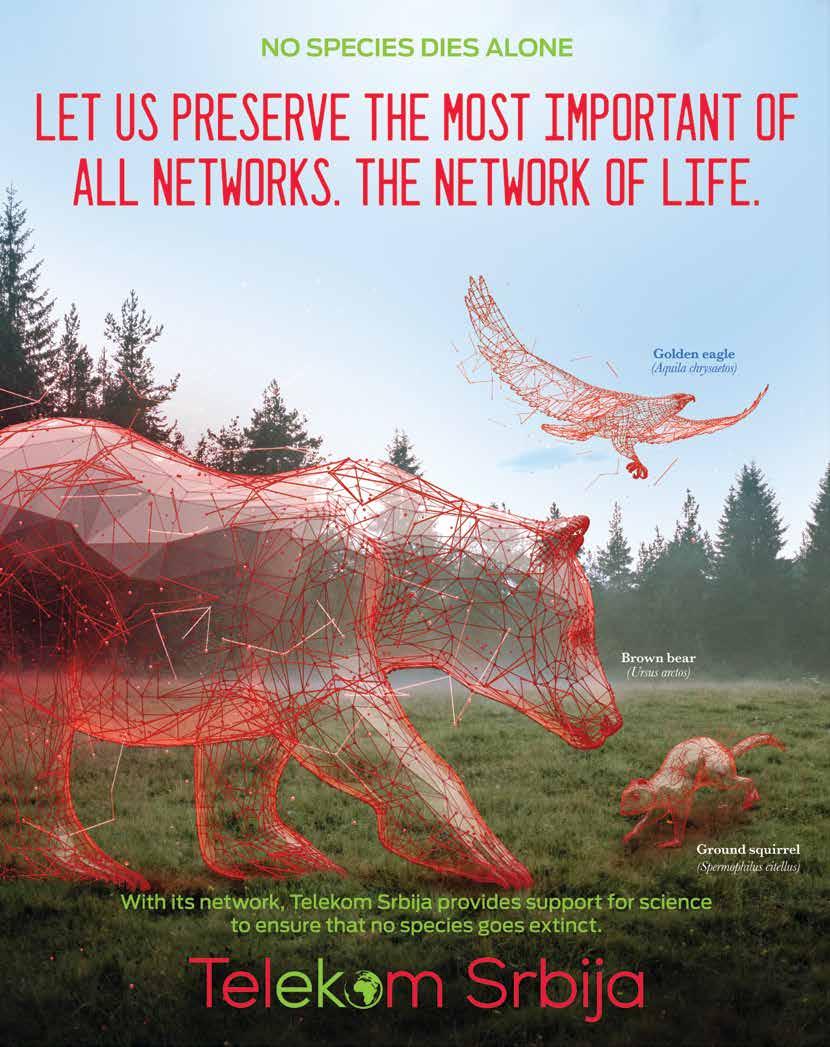
Announced easing inflation and faster economic growth hints at the possible accelerating of economic activity. This in turn creates room for the Government of the Republic of Serbia to place a greater focus on improving the business climate and strengthening its dialogue with the business community
Agency Fitch Ratings recently confirmed Serbia’s credit rating at the BB+ level. Despite Serbia having yet to receive an investment rating, this ratings decision reflects positive economic factors and the progress achieved by the country regardless of the extremely unfavourable global trends that have also manifested on the domestic business climate. Contributing the most to this rating are a credible economic policy, increased economic activity, improved administration, regulated public finances and the level of development of human resources compared to countries with a similar rating.
Despite the challenges of external demand, Serbia has succeeded in preserving its stability, attracting significant direct investments and achieving growth on exports.
Announced falling inflation and projections indicating an improved external position further contribute to the forming of a favourable picture. Moreover, the country’s fiscal deficit is also expected reduce, while public debt should remain at a level below 50% of GDP, which further buttresses macroeconomic stability.
GDP is expected to enjoy further growth, driven by rising exports, an improved agricultural season and positive trends in the services sector. These are key factors that could support the achieving of higher rates of economic activity.
Completing this positive picture are the views of representatives of international financial organisations, representatives of the Foreign Investors Council, individual companies and members of the Government of Serbia.
It firstly seems that significant room for improvement still exists in Serbia when it comes to advancing the business climate and removing obstacles to further development internally. Although several new laws have been adopted and existing ones updated – such as the Law on Safety and Health
at Work, amendments to the Law on Foreigners, the Law on the Employment of Foreigners and others – there has been a lack of significant activity in the country on the harmonising of regulations with the EU acquis. Furthermore, there are serious hindrances when it comes to the implementing of a large number of regulations. This is also reflected in the slowing dynamics of the adoption of recommendations provided in the FIC White Book.
Secondly, certain areas are progressing in an unbalanced way. The recent FIC conference on financial services provided an example of good cooperation with the National Bank of Serbia, which has resulted in the introduction of numerous useful innovations for the benefit of the economy and citizens. In contrast to this, when it comes to the areas of the food sector and tax regulations, only slight advances have been recorded in terms of both dialogue and results.
Thirdly, the top investors in Serbia are also leaders on activities that steer the country towards an improved business culture. Among corporations, ESG reporting is becoming increasingly important, with these aspects prompting responsible companies to join efforts aimed at preserving the wellbeing of workers and local communities. The FIC’s well-attended conference was dedicated to this specific topic and the launch of implementation of the Due Diligence Act in Serbia.
Fourthly, the number of investments in Serbia’s innovative sectors is on the rise, but so is awareness of the necessity and obligation to shift the business community towards sustainable operations. One such example is the introduction of the principle of regenerative agriculture. Recognising the necessity of introducing new business practices, the FIC – as a leader in advancing Serbia’s business climate – is organising a conference on this topic in late September.

The FIC has addressed the vital issues of digitalisation and adherence to ESG principles over the past year, but also Serbia’s shift towards more sustainable agriculture development and environmental protection
03
EDITOR IN CHIEF
Tanja Jakobi
EDITORIAL MANAGER
Neda Lukić n.lukic@aim.rs
DESIGN
Slađan Radosavljeć
Zoran Perović design@aim.rs
PHOTOS
Zoran Petrović
COPY EDITOR
Mark Pullen Halifax Translation Services
PROJECT MANAGERS
Biljana Dević b.devic@aim.rs
Mihailo Čučković m.cuckovic@aim.rs
Nataša Novković n.novkovic@aim.rs
OFFICE MANAGER
Svetlana Petrović s.petrovic@aim.rs
FINANCE
Dragana Skrobonja finance@aim.rs
EXECUTIVE DIRECTOR
Maja Vidaković m.vidakovic@aim.rs
DIRECTOR
Ana Novčić a.novcic@aim.rs
SPECIAL THANKS TO Aleksandar Ljubić, FIC Executive Director
Renata Pindžo, FIC Communications Director
Koviljka Nikolić, FIC Office Manager
Tamara Kapor, FIC Regulatory Associate
PUBLISHER Ivan Novčić i.novcic@aim.rs
PRINTING
Rotografika d.o.o. Segedinski put 72, Subotica
FIC 2023/24
Published by:
alliance international media
Prote Mateje 52, 11111 Belgrade 17, PAK 126909, Serbia
Phone: +(381 11) 2450 508
E-mail: office@aim.rs; office@cordmagazine.com
www.aim.rs; www.cordmagazine.com
ISSN: 2560-4465
All rights reserved
alliance international media 2023
The views expressed in this publication are those of the presenter; they do not necessary reflect the view of publications published by alliance international media
THIS PUBLICATION IS FREE OF CHARGE
NEW APPROACHES REINFORCE ECONOMIC GROWTH
MIKE MICHEL, President of the Foreign Investors
Council and CEO of Yettel
SERBIA SHOULD RETURN TO INVESTMENT-LED GROWTH
JORGOVANKA TABAKOVIĆ
Governor of the National Bank of Serbia
COMBATING INFLATION
EMANUELE GIAUFRET
Head of the EU Delegation to Serbia
MORE RULE OF LAW MEANS MORE INVESTMENT
VLASTIMIR VUKOVIĆ
Chief executive officer of NLB Komercijalna banka
FASTER, MORE EFFICIENT, AND CLOSER TO CLIENTS 18
MIHAILO JOVANOVIĆ, Minister of Information and Telecommunications
40 IOSIF VANGELATOS
General Manager, Inos Balkan END USERS DEMAND GREEN PRODUCTS
42 YULIA USTYUGOVA
IMF Resident Representative for Serbia GEOPOLITICAL STABILITY & NEARSHORING COULD BOOST SERBIA’S FDI
45 MILJAN MILEVIĆ
Managing Director, SGS RELIABLE PARTNER OF THE SERBIAN GOVERNMENT
46 BANCA INTESA
CONNECTING BUYERS AND SUPPLIERS REGIONALLY
48 MILAN SAMARDŽIĆ
Partner and Founder at SOG in cooperation with Kinstellar UNIFIED TO COMPRISE A TOP LEGAL TEAM
49 MILOŠ VELIMIROVIĆ
68 ALEKSANDAR LJUBIĆ, Executive Director of the Foreign Investors Council DEDICATED TO EU INTEGRATION
70 DRAGAN PENEZIĆ
Co-President of the FIC Anti-Illicit Trade & Food Committee (British American Tobacco SEE d.o.o. Beograd)
COORDINATED WORK OF STATE SERVICES ESSENTIAL
71 DRAGANA STIKIĆ
Co-President of the FIC Anti-Illicit Trade & Food Committee (Nestlé Adriatic S d.o.o.) BETTER HARMONISATION WITH EU REGULATIONS
72 DANIEL ŠUŠNJAR
president of the FIC Telecommunications & Digital Economy Committee (Yettel d.o.o.)
REGULATIONS ON INSTALLING BASE STATIONS REQUIRE REVISION
73 DUŠAN LALIĆ
co-president of the FIC Financial Services Committee (Generali Osiguranje Srbija a.d.o.)
KNOWLEDGE IS OUR STRENGTH 21
Managing Partner at SOG in cooperation with Kinstellar INTEGRATION RESULT EXCEEDS A SIMPLE
HUAWEI TECHNOLOGIES D.O.O
IMPROVED LEGAL FRAMEWORK FOR THE INSURANCE SECTOR
50 DEJAN MAJIĆ
74 DANILO MRVALJEVIĆ
TOMISLAV MOMIROVIĆ
INNOVATIVE STORAGE ALSO COMBATS RANSOMWARE 22
Minister of Internal and Foreign Trade A SHARED FUTURE A WAITS THE REGION 25 OTP BANKA SRBIJA COMMITMENT TO EXCELLENCE
JELENA BEGOVIĆ
Minister of Science, Technological Development and Innovation
General Manager, Mama Shelter Belgrade FAITHFUL TO THE MAMA SHELTER STYLE
52 STOYKO IVANOV MESHKOV
CCEO, Trace Group Hold PLC Belgrade Branch PROCESS DIGITALISATION IS THE ROUTE TO EFFICIENCY
54 MATTEO COLANGELI
co-president of the FIC Financial Services Committee (Banca Intesa a.d. Beograd) CONTINUING DIGITALISATION
75 MILENA JAKŠIĆ PAPAC
President of the FIC Human Resources Committee (Karanović & Partners o.a.d.)
LONG-AWAITED CHANGES TO LABOUR REGULATIONS
MARIJANTI BABIĆ
HUMAN CAPITAL IS THE FOUNDATION OF DEVELOPMENT 30
Country Head at Rio Tinto, Project Jadar JADAR IS AN EXCEPTIONAL PROJECT 32
35
NICOLA PONTARA, World Bank Country Manager for Serbia SERBIA HAS THE POTENTIAL TO ACCELERATE GROWTH
IVANKA STOJNIĆ
EBRD Director for the Western Balkans ACHIEVING EU INCOME LEVELS IS POSSIBLE
57 LAZA KOVAČEVIĆ
Managing Director, CTP Serbia NO DEVIATING FROM THE GOLD STANDARD
58 DAWID SOLD
Managing Director of G4S Serbia THE ULTIMATE SECURITY EXPERTS
60 DRAGANA MARKOVIĆ
76 MARIO KIJANOVIĆ, president of the FIC Infrastructure and Real Estate Committee SUPPORTING REAL ESTATE CADASTRE REFORM
77
MARKO ĆULAFIĆ
president of the FIC Legal Committee (Karanovic & Partners)
SWIFTER HARMONISATION WITH THE EUROPEAN FRAMEWORK
78
RADOMIR CEROVIĆ
president of the FIC Pharma Industry Committee (Roche d.o.o.)
ALESSANDRO BRAGONZI
Sustainability Manager for the Southeast European market at Nestlé REGENERATIVE AGRICULTURE AS A KEY SUSTAINABLE PRACTICE 36

Head of the EIB regional representation for the Western Balkans OPPORTUNITIES TO BE EMBRACED
39
DEJAN VUKOTIĆ
CEO of the Serbian Export Credit and Insurance Agency – AOFI Serbian Goods EXPORTS ON THE RISE
Director of the Tax Administration of Serbia DIGITALISATION AND TRANSFORMATION TO COMBAT THE GREY ECONOMY
64 ANA GOVEDARICA
FIC vice president and spokesperson (Roche general manager) THROUGH DIALOGUE TO NEW LEGAL SOLUTIONS
66 DEJAN TURK, FIC vice president (CEO of A1 Srbija and A1 Slovenija) UNRESTRICTED DEVELOPMENT FOR NEW TECHNOLOGY
GOOD PRACTICES NEED TO CONTINUE
79 DRAGAN DRAČA
President of the FIC Taxation Commit tee (PricewaterhouseCoopers)
SIGNIFICANT MODERNISATION OF THE TAX ADMINISTRATION
80
ZAFIRIS LAMPADARIDIS
president of the FIC Tourism & Hospitality Committee (Hyatt Regency Belgrade)
IMPORTANT MOMENTUM FOR STRATEGIC POSITIONING
 MIKE MICHEL, PRESIDENT OF THE FOREIGN INVESTORS COUNCIL AND CEO OF YETTEL
MIKE MICHEL, PRESIDENT OF THE FOREIGN INVESTORS COUNCIL AND CEO OF YETTEL
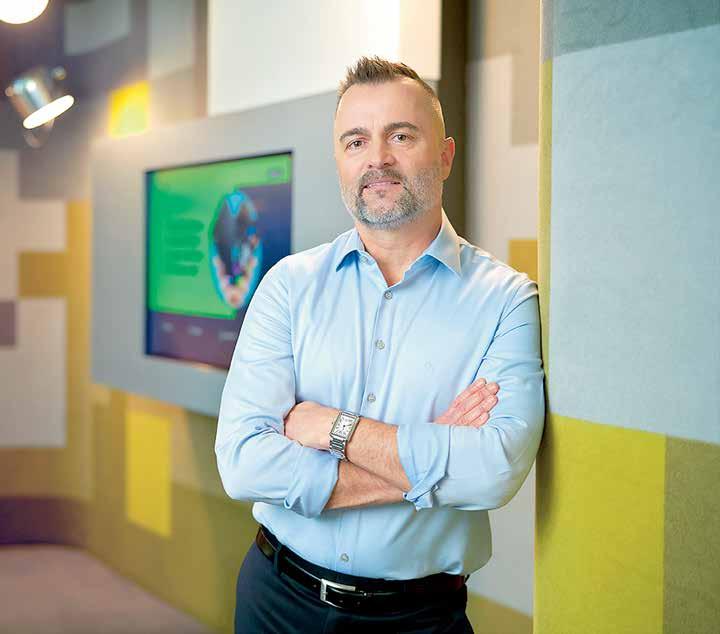
The FIC advocates for Serbia to pursue investment-led growth, aiming for a 25% share of investments in GDP to achieve a sustainable annual growth rate of 5%. Additionally, the focus should shift towards producing more commodities for export rather than solely providing services for domestic use
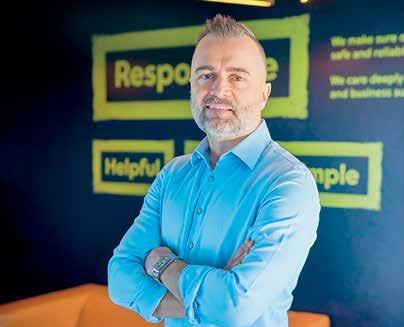
At this moment, it is uncertain whether investment will be an engine of growth over the next three years, but we at the FIC will do everything in our power to ensure that is the case
The White book is a treasure of wisdom from leading businessmen, offering expert advice on navigating the business world
We are in a rocky recovery, with the international order in a turbulent adjustment. There is still time until the end of 2023, so it is not so easy to predict precisely how the year will end, but it seems that both the U S and Europe are likely to avoid recession. In general, the slowdown in global growth will probably be less severe than previously expected, while inflation will remain high in many countries. All of this brings great uncertainty for everyone, especially for small economies like Serbia, says Mike Michel, President of the Foreign Investors Council and CEO of Yettel, summarising the year ahead of us
Consequently, no company was able to remain immune to all the events we have been exposed to. “That is why I think that the FIC’s job is more important than ever – to represent the unanimous voice of leading investors in the country by addressing a variety of regulatory issues that hinder day-to-day company operations, in very challenging times”, says the FIC president.
Which of the Serbian government’s measures would you rate as having contributed most to strengthening the stability and predictability of the economic environment in the preceding period; where do you see room for further action to be taken?
Without a doubt, these would be e-commerce and digitalisation, especially in electronic communication with public institutions. This was also the main conclusion of the FIC White Book, 2022 edition. We are aware that better outcomes were not achieved because of the challenging economic and geopolitical conditions, but some good things were done. I have to mention that, despite the crisis, the rules in the energy sector improved. As for business groups, real estate performed best. There are several laws that I’d like to highlight: the Law on Electronic Invoicing, which affects the implementation of VAT rules; the amended Law on Planning and Construction and regulation of conversion, adoption of Programme and Action Plan for the Suppression of the Grey Economy for 2023 -2025, Law on Safety and Health at Work , and the new Law on Electronic Communications.
There is still a lot to do. For example, implementation of ESG principles in Serbian regulation and business operations, modernisation and improvement of Labour Law and, also, aligning the Food Safety regulations with EU standards and fully implementing them. There is also the need to amend the Law on Forex Transactions.
We must provide steady funding for innovative and generic medicines and also promote energy saving and carbon pricing
An encouraging continuation of foreign investment inflows was recorded during the previous period. What would you recommend that the Government of Serbia do in order to maintain and even improve this tempo?
In 2022, investments did not grow, although foreign direct investments have partially recovered from the negative impact of the Covid-19 crisis. In 2018-19, investments were rooted in construction, but in 2020-22 there was a move to consumption and domestic trade. Industry expanded in 2022, but construction and agriculture contracted
We at the FIC think that Serbia should return to investment-led growth. Serbia should have a 25% share of investments in GDP to achieve a sustainable GDP growth rate of 5% per year. To reach that goal, private investment should increase by at least 3% to 4%. On the supply side, Serbia should produce more commodities to boost exports, rather than providing services for domestic use.
At this moment, it is uncertain whether investment will be an engine of growth over the next three years, but we at the FIC will do everything in our power to ensure that is the case.
To what extent are key decisions linked to economic development policies and the improvement of the business climate a reflection of consultations carried out
with the business sector and what should be improved in this segment in the period ahead?
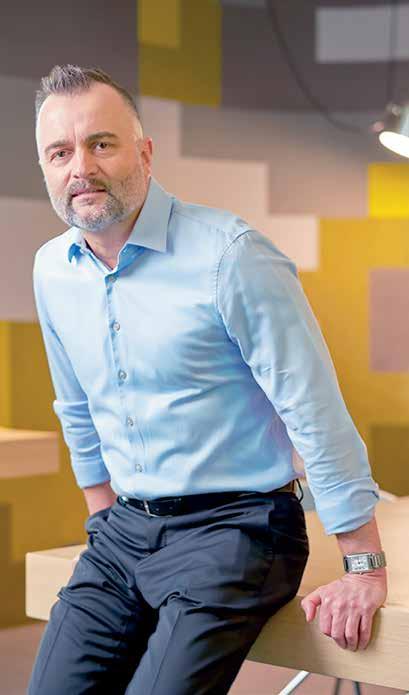
I’d say to a very great extent. Let me put it this way – our flagship project is our White Book. This is an overview of Serbia’s business climate and a collection of recommendations and proposals to resolve burning issues. Basically, you have 120 foreign companies, from all around the globe, from the EU to the U S China, Japan, and Russia, giving concrete, practical and, moreover, feasible recommendations on how to improve the business and investment climate. The 2022 edition consists of 55 articles with 372 recommendations written by 49 authors. For me, this is a pure treasure, having the leading businessmen in the country trying to give their expertise and knowhow on the way to navigate business.
The FIC’s job is to be the keeper and guardian of the pick of the recommendations, making sure that everybody is doing their part of the job. To this end, we implemented a series of activities to keep up the pace. For example, in October 2022, The Implementation of the E-Invoicing Law Conference was held at the Ministry of Finance, where our members had the opportunity to clarify open questions arising from the practical implementation of this law. In April 2023, we organised FIC Insight into the regulation and purposes of hedging as instruments for protection with the NBS Vice Governor as a special guest. In May, we organised FIC Insight on Unlocking ESG. As I have already mentioned, ESG is more important than ever. There are many innovations to do with ESG and Serbian companies should take urgent steps to familiarise themselves with these legislative changes and comply with them, regardless of whether they are related to non-financial reporting, protection of whistleblowers, carbon border adjustment mechanisms, or top-of-the-supply-chain management. In June 2023, we organised the first FIC Financial Services Conference with the participation of the NBS, the Ministry of Finance, Prevention of Money Laundering Administration and all relevant state bodies and business associations.
Considering the acceptance of the White Book recommendations and changes to the general legislative framework, how would you assess Serbia’s progress in terms of complying with the standards of the EU?
In what ways does the FIC contribute to that process?
Bringing domestic regulations into line with European standards and expediting work on the White Book recommendations is, by far, our main goal. We always insist on intensifying negotiations with the EU on membership status. At the same time, we are aware that better outcomes were lacking because of the new circumstances. We are also aware that acceptance of the FIC’s recommendations reached a low point in 2022. However, as I said, we are not here just to
point to what has not been done, but to propose, motivate, lead, and insist on the changes we want to see. We want to be a part of those changes, not just a silent observer. And, with all the activities I’ve spoken about here, I’m sure we are doing just that.
Our job is to represent leading investors in the country and address regulatory issues that hinder company operations, especially in challenging times



We believe that FDI inflows will reach around four billion euros by year’s end. This is good news, as it shows that investors recognise Serbia as a place with a favourable macroeconomic and regulatory environment even during periods of uncertainty and economic slowdown globally
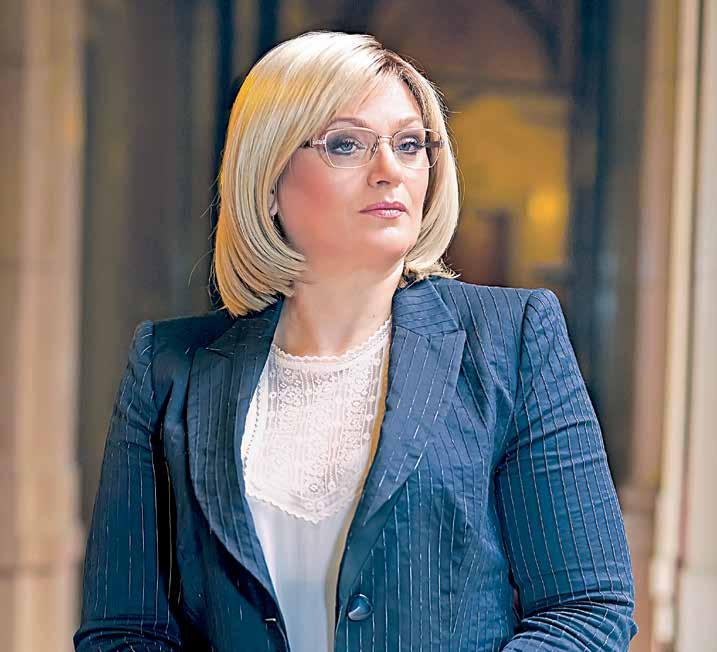
If growth accelerates in the euro area and investments in our country increase, Serbia could record economic growth in the range of 3% to 4% in 2024
In an environment of global instability, the use of all protective mechanisms must be an essential element of economic policy. One such mechanism is also the arrangement with the IMF
The inflation target of the National Bank of Serbia equals 3% with the tolerance band of ±1.5 percentage points, which is expected to be reached by the middle of next year. In the opinion of Governor Jorgovanka Tabaković, the best way in which the National Bank of Serbia can contribute to economic growth is to reduce inflation..

“We do this through the gradual, continuous and well-measured tightening of monetary conditions, while taking into account economic growth. We also contribute to this by maintaining the stability of the exchange rate, particularly during periods when we face pronounced global uncertainty. In such situations, we prevent a fall in business, investment and consumer confidence by preserving exchange rate stability,” explains Governor Tabaković.
As the Governor explains, we had a typical example of that in the first half of 2020, following the outbreak of the pandemic, and in the first half of 2022, following the outbreak of the conflict in Ukraine. However, in both instances, investments and exports very quickly returned to their previous levels.
What lessons has Serbia learnt with regard to the impact of events in the energy sector on macroeconomic stability and inflationary movements? Do we have enough reasons to believe that such disturbances will not happen again?
The most important lesson that should be considered every day in the economy is market diversification, in every sense of that word, but there’s also awareness of the importance of strategic fields in which the state must maintain an effective presence, because the state is expected to ensure conditions for doing business and for people’s lives, with energy stability and food production being top priorities. When it comes to Serbia, apart from the sudden hike in the price of gas, we were also hit by an extremely bad hydrometeorological situation that was not conducive to the generation of electricity, with coal production also hit hard. Despite these challenges, Serbia has once again become a net exporter of electricity, with net exports of electricity exceeding 300 million euros in the first six months of this year. At the same time, additional supplies of gas were provided during peak consumption months through the renting of gas storage facilities in Hungary. In the period ahead, it is important to continue reforming, restructuring and improving the governance of state-owned energy companies, so as to align their operations with market principles.
It is important to continue reforming the governance of state-owned energy companies, so that their operations are aligned with market principles
We reduce inflation through the gradual, continuous and well-measured tightening of monetary conditions, while taking into account the growth of economic activity
What are your expectations when it comes to overall FDI levels by year’s end 2023?
FDI inflows in the year to date have indeed been high, and our projection – which is conservative, as always – is that FDI will total around four billion euros at the year level. This is good news, as it shows that, even in a period of uncertainty and slowed economic growth globally, including geopolitical tensions that aren’t bypassing us, investors still recognise
Serbia as a safe place to invest and they recognise the favourable macroeconomic and regulatory environment that we’ve created. The strong inflow of investments in Serbia, from both traditional partners –European countries – and from the countries of East Asia and the Middle East, also testifies to our country being recognised around the world as a secure place for investment.
How significant for you is Serbia’s decision to request a new Stand-by Arrangement with the IMF?
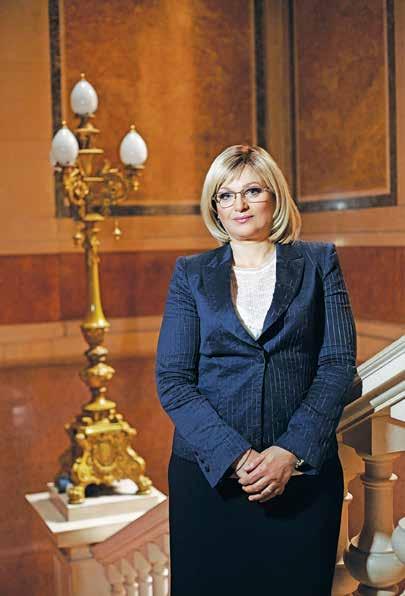
The fact is that Serbia has implemented robust measures over the course of the previous decade that have ensured the country’s macroeconomic stability, growth and better living standards for citizens. Nevertheless, under the conditions that the whole world has been operating in for a long time already, the use of all protective mechanisms must be an essential element of economic policy. One such mechanism is also the arrangement with the IMF. The agreed economic programme doesn’t include any reform goals for the National Bank of Serbia. However, the fight against inflation is the number one priority for us, as it is for most central banks around the world. In this struggle, we remain devoted to preserving the relative stability of the dinar exchange rate, which the IMF has also recognised as an important pillar of the country’s overall macroeconomic stability.
At the recent first conference on financial services organised by the Foreign Investors Council, we had an opportunity to hear new ideas about the introduction of digital solutions. Which of the ideas and initiatives presented at the conference were the most important for the National Bank?
Listening to the needs of the market and the demands of digitalisation, the National Bank of Serbia is investing great efforts to contribute to the development and modernisation of financial services. Testifying to this is the increasing popularity of our instant payments system. Serbian citizens have at their disposal a number of advantages enabling them to use the national DinaCard. The National Bank is working actively to prepare the draft law that will comprehensively regulate the crowdfunding of economic projects, which, I believe, will contribute greatly to the further development of small and medium-sized enterprises. We are also in the final phase of the process of digitising bills of exchange, the introduction of which will create conditions for businesses and citizens to make additional savings.
What are your forecasts for 2024 when it comes to economic indicators?
When it comes to projecting inflation, the most important thing is that it is now on a stable downward trajectory. According to our projections, which haven’t essentially
The National Bank is working actively to prepare the draft law that will comprehensively regulate the crowdfunding of economic projects, which will contribute greatly to the further development of SMEs
changed since November last year, inflation should fall to around 8% by year’s end, while it should return within the target tolerance band by the middle of next year. Our last official GDP growth projection for this year is in the range of 2% and 3%, and we still consider it most likely for growth to continue to move within that range, though it is more realistic for it to be closer to the lower level
When it comes to 2024, under the assumption that growth will accelerate in the euro area and investments in Serbia will further intensify, we consider it realistic for Serbia to record economic growth in the range of 3% to 4%.


The more reliable a country’s court system is, and the more corruption is being curbed and organised crime tackled, the more willing one is to invest in a country that feels like an investment in a safe place
The EU enlargement process and perspective has been, and remains, the key driver of economic and societal prosperity in Serbia, says EU Delegation to Serbia Head Emanuele Giaufret, who we interviewed for this year’s special FIC Guide. According to our interlocutor, support for Serbia’s future in the EU remains unequivocal and is visible through the delegation’s daily efforts aimed at supporting the country’s reform agenda and improving the lives of Serbian citizens.
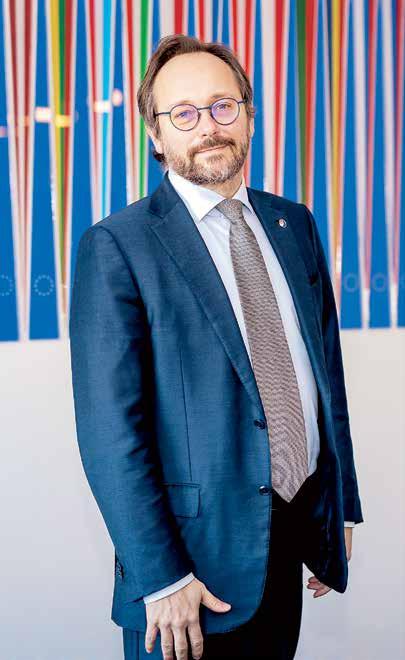
“I would like to highlight some of the reforms that we feel are key to instilling that sense of stability, transparency and predictability. We have, for example, seen and felt how important it is to have well-functioning and well-managed state-owned enterprises. The multiplier effect they can have on the economy as a whole is enormous, both in positive or negative terms. In that regard, we very much look forward to the adoption of the new Law on the Management of State-Owned Enterprises and applaud the commitment of the government to tackle this difficult issue.
According to Giaufret, this applies in particular to the reform of electric utility power company EPS. In particular, says the EU delegation head, companies like EPS that operate in Serbia’s energy sector need to focus on corporate restructuring, the professionalisation of their respective management structures and the modernisation of business processes, in order to ensure stable energy production systems over the long term.
In parallel, the EU is working together with Serbia to diversify energy supply sources, specifically in finding replacements for fossil fuels from Russia, accelerating the implementation of green energy technologies and reducing demand for energy. “The energy sector is in our focus due to its obvious impact on the economy under the current circumstances. However, reforming the energy sector is, of course, also key when it comes to meeting the goals of the Green Agenda for the Western Balkans,” explains our interlocutor.
“We also welcomed the National Assembly’s recent adoption of the Law repealing the law on special procedures for linear infrastructure projects. This was a long-standing Commission recommendation and a point that had been raised
Serbia has proven very resilient to crises, with impressive levels of foreign direct investment registered over previous years
The closer Serbia gets to the EU, the more attractive it will be for FDI. A big and prosperous market will be easier to reach
on various occasions. This issue was also being monitored closely by EU Member States. The repeal of this law is an important step in negotiations of Chapter 5 – Public procurement. A well-functioning and transparent public procurement system can be a catalyst for local economic development. And if it does not work right, it can also be a catalyst for the misuse of public funds, corruption and abuses of power – in any country, not only Serbia.”
Thus, says Giaufret, in alignment with the good European spirit, his delegation encourages the Serbian authorities to continue working to ensure that the principles of equal treatment, non-discrimination, transparency and competition are safeguarded in all public procurement procedures.
“In the same spirit, we continue to urge Serbia to ensure the respect of the principles of public procurement, competition and transparency, particularly in intergovernmental agreements with third countries, and to refrain from the application of special laws, in line with national legislation and the EU acquis.
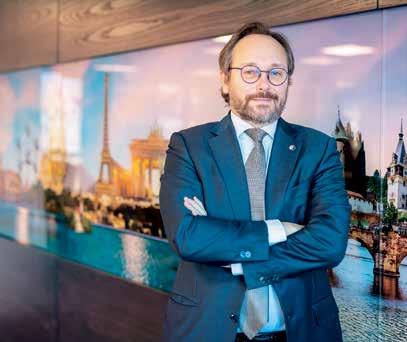
“In the same spirit, we look forward to amendments to Law on Planning and Construction. The main goals of these amendments include increasing the efficiency and transparency of permitting procedures for the construction sector, aligning with the EU acquis and introducing elements of the Green Agenda. So, another milestone in applying good EU practices.”
Concluding his introduction, Giaufret says that the bottom line is that everything is, and of course remains, linked to the Rule of Law in general.
Despite the EU integration process progressing slower than expected, particularly on the Serbian side, there seems to be acceleration in aligning the Western Balkans with the EU in terms of infrastructure, digitalisation, energy and green economy. How would you assess the pace and efficiency of these processes?
The EU is fully committed to support all Western Balkan partners in delivering the necessary reforms for the benefit of all citizens, and we’ve stepped up our support to develop Serbia’s infrastructure.
The Economic and Investment Plan, as well as the upcoming Growth Plan, are proof of massive commitments and investments that materialise in the form of concrete projects across the region. The Economic and Investment Plan identifies 10 investment flagships and allocates a substantial financial package of up to €9 billion in EU funds, with a potential to
EU companies have brought efficiency, modern technologies and knowhow to the Serbian economy, providing jobs for many Serbian people. They have been a booster for the economy and EU integration reforms
The EU will continue working with the IMF and other stakeholders in providing assistance to Serbia and its companies to overcome challenges in the energy sector
mobilise up to €20 billion of additional investments through the Western Balkan Guarantee Facility. So, these two figures add up to almost 30 billion euros of EU investments. This encompasses the span of time from 2021 to 2027.
The Plan supports investments in sustainable transport, clean energy, environment and climate, the digital future, business sector competitiveness and the development of human capital. And maybe I will name just some of the many important projects in Serbia: we finance, for instance, the new gas interconnector with Bulgaria, in order to secure the energy supply and foster the unbundling of the gas market so that Serbia is less dependent on Russian fossil fuels. We are helping on the construction of the new railway between Belgrade and Niš, while we are also financing the construction of the Tiršova 2 paediatric hospital in Belgrade. The Economic and Investment Plan is precisely there to help accelerate things and is already delivering results.
The single market has been a powerful engine for creating wealth and prosperity among EU member states, while it also has the potential to serve as an engine for economic transformation in the Western Balkans. From the perspective of integrating the Western Balkans into the EU market, which characteristics of Western
Balkan integration processes do you consider as being the most promising?
Simply put, we want to offer the Western Balkans some of the advantages of membership in advance. This means that certain requirements of membership also have to be met in advance, in particular the EU acquis will need to be enforced in relevant areas. This is one of the key objectives of the growth plan.
For all countries that have joined the EU over the last two decades, access to the Single Market has been the main driver of economic growth. Countries on the path to EU entry should also benefit from our Single Market and therewith an area that has great potential.
For example, the Western Balkans could join the EU Digital Single Market in areas such as e-commerce or cybersecurity. We have already seen positive developments in the area of telecommunications, with the reduction of roaming charges within the Western Balkans and, later this year, between the region and the European Union. We could facilitate our trade in goods and payments. For example, work is ongoing to deepen existing customs cooperation.
With many European companies re-evaluating nearshoring possibilities, attracting foreign investments becomes a sensitive process involving both political and economic considerations. How do you view Serbia’s position in attracting these foreign investments?
Serbia has proven very resilient to crises, with impressive levels of foreign direct investments registered over previous years. FDI statistics for 2022 confirmed all-time-high FDI inflows to Serbia of 4.4 billion euros, which increased by as much as 14% compared to previous record-breaking FDI inflows registered in 2021. These are impressive numbers. And EU companies have a large stake in this.
Looking at longer timeframes, EU companies are Serbia’s biggest foreign investors by far, accounting for around 60% of total FDI accumulated in the 2010-2022 period. This translates into more than €20.5 billion worth of investments coming from the EU over the previous 13 years. EU-headquartered companies have established their businesses in Serbia and have become an integral part of Serbia’s economy, with a very strong presence in the most relevant sectors of Serbia’s economy, including the auto and auto parts industry, electrical machines and apparatus, rubber and chemicals production, banking, retail, pharmaceuticals etc.
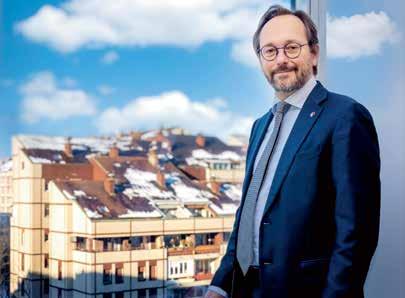
Some of these EU companies have persistently featured among Serbia’s top 15 exporters for years. German and Italian companies are among the top investors, to name two of the source countries of investments that come. EU-based companies are champions of investment and Serbia thus benefits from the jobs created through these investments. The closer Serbia gets to the EU, the more attractive it will be for foreign direct investments. A big and prosperous market will be easier to reach.
The EU Delegation consistently works with the Foreign Investors Council, the Chamber of Commerce & Industry of Serbia and numerous other business associations and bilateral EU chambers of commerce in order to better understand and support the improvement of the country’s business environment
Many European businesses, including those gathered around the Foreign Investors Council, are bringing their expertise and experience to the Serbian market. How do you, as an EU Delegation, coordinate your efforts to help Serbia improve the business climate with investors from the EU?
The EU Delegation consistently works with the Foreign Investors Council, the Chamber of Commerce & Industry of Serbia and numerous other business associations and bilateral EU chambers of commerce in order to better understand and support the improvement of the business environment in Serbia. They are also valuable contributors to our Annual Report that provides a detailed assessment of Serbia’s state of play in the EU integration process. We also have a dedicated project on the business climate that we finance, which is meant to bring improvements at a practical level. Overall, EU companies have brought efficiency, modern technologies and knowhow to the Serbian economy, providing jobs for many Serbian people. EU companies have also brought a new corporate culture and EU values to Serbia’s economy, changing the way the country’s economy operates, with an impact on all companies operating along their respective supply and value chains, but also with an impact on individuals and society as a whole. This has, in turn, significantly increased the productivity and competitiveness of the Serbian economy, boosting its export potential, increasing budget revenues and generating economic growth. Ultimately, the opening up of the Serbian market to companies from the EU has generated a variety of choice and lower prices for Serbian consumers.
On the other hand, in Serbia we are also tasked with preparing economic operators, particularly SMEs, to be able to compete on the EU single market. Our task is to work towards Serbia’s accession to the EU - when Serbian companies will become EU companies.
NLB Komercijalna Banka has defended its market leader position in the area of agricultural loans and in providing unconditional support to farmers. The economy recognises the bank as a strategically important partner, and citizens it as a reliable pillar of support in resolving important life issues
With sustainable and responsible operations, based on deep industry knowledge, we’ve justified the trust of both our parent group and the almost one million clients for whom we’re preparing a new and agile working model announces NLB Komercijalna Banka CEO Vlastimar Vuković, before revealing some of the bank’s numerous plans to CorD Magazine.
The merger of Komercijalna Banka and NLB is among the rare examples of foreign investors entering the Serbian banking sector in recent years. How would you evaluate this experience today?
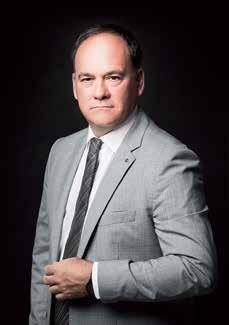
The merging of NLB and Komercijalna Banka took 430 days, with more than 500 employees and external partners successfully mapping and integrating all processes and organisational elements during that time. One of Serbia’s largest retail banking networks was formed, many branches were rebranded and around 200 applications were optimised, while the joint products and services portfolio was also expanded significantly. We achieved record results during this very challenging transitional period – exceeding all plans and expectations, and we used part of the profits to replace the entire ATM network with new and multifunctional latest-generation devices.
That’s why it comes as no surprise that this merger process is considered in professional circles as being among the most complex financial integration processes ever implemented in the region, but also one of the most successful. For us, this merger is merely the foundation for us to continue building a new first-choice bank for all employees and clients.
How are you responding to the ever-more prominent digitalisation trend and the inclusion of artificial intelligence in the sector?
While artificial intelligence, augmented reality and fintech solutions are being utilised increasingly, traditional working models are slowly giving way to modern alternatives. With an awareness of that, we followed the completion of the merger by initiating a comprehensive transformation of our business mo-
del, but also our ways of thinking and working. We launched 24 different projects and more than 3,000 activities, via which almost 400 employees from 29 different organisational units will optimise and modernise procedures, as well as digitalising most products and services. This will result in a new, agile working model that will make us faster, more efficient and even closer to clients.
How have you helped your business clients to navigate this challenging year?
Crises are a kind of test of relations between banks and their clients, particularly business clients, which rightly expect you to fundamentally understand their business, making every step in the banking process personal and more efficient. That’s why we’ve supported each of our clients from the beginning of the year until now, adjusting every aspect of our operations to suit them – from the portfolio of products and services, to our internal procedures. In the first half of the year, when the entire market was shrinking, we had growth of 7.3% in corporate lending and our share of NPLs dropped to a historic low. As a bank that’s systemically significant and one of the factors of stability for the entire market, we supported investments and the further development of the entire community. The high liquidity, stability and capacity of our bank and parent NLB Group to support capital projects were confirmed with the financing of the construction of the Krivača Wind Farm, with 142 million euros, and project financing worth 55 million euros for the Sava Centre. This is a clear indicator that we, together with our clients and the community in which we operate, are on the road to recovery.
While the entire market was shrinking, we had growth of 7.3% in corporate lending and our share of NPLs dropped to a historic low
Digital Serbia’s place is in a digital Europe, and this is best illustrated by the results we’ve achieved over the past six years. We are continuing to strengthen our country’s economy and invest in the construction of Serbia’s knowledge- and innovation-based economy
Serbia and the EU recently signed an agreement on our country’s participation in the programme Digital Europe 2021-2027. “That’s great news for our sector of information and communications technology, as well as for all our scientists, institutes, researchers and innovators,” says Serbian Information and Telecommunications Minister Mihailo Jovanović. We discussed with Minister Jovanović the continuation of the digital transformation process in Serbia and innovation-based economic development.
This programme has a total value of 7.5 billion euros and implies international cooperation, cooperation with the countries of the Western Balkans, but also economic development support with an emphasis on small and medium-sized enterprises. “The opportunity to apply with high-quality projects in the field of digitalisation will be available to all businesses and individuals registered as residing in the Republic of Serbia, and those include our universities, research organisations, the academic community and all start-ups,” explains our
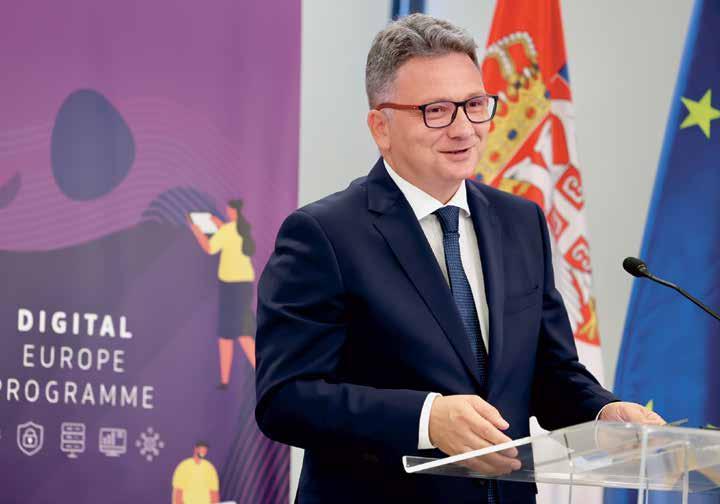
interlocutor. This support relates to grants from European Union funds, while the topics of candidate projects include artificial intelligence, digital connectivity, the development of digital skills, super-computing, the field of advanced use of technology and many others.
All those interested who apply for such financing from EU funds will be on an equal footing with applicants from EU member states when it comes to the allocation of these funds. Conditions for work and development in the field of digitalisation in our country will thus be improved greatly, and thereby also for the growth of foreign direct investments that are extremely helpful in terms of economic and social development.
How satisfied are you with the development of digitalisation in the domain of communication between the public administration and the business sector?
When we introduced digitalisation as one of the priority areas in 2017, at the suggestion of Serbian Prime Minister Ana Brnabić, we accelerated investments in the processes of digitalising public administration and infrastructure construction. We improved the public administration communication system significantly, and via the Government Service Bus (GSB) [Servisne magistrale organa (SMO)] exchanged more than 180 million pieces of data, while sending documents between public administration bodies means that our country’s citizens don’t have to appear at service counters. Citizens can use the eGovernment (eUprava) portal to download various
confirmations, such as registry extracts and citizenship confirmation, make payments of numerous administrative fees, schedule their children’s enrolment in nurseries, primary schools and secondary schools.

How much has digitalisation progressed in the field of healthcare?
Digitalisation processes for the healthcare system were launched ten years ago, with the introduction of e-Prescriptions (eRecept) significantly improving the work of healthcare workers and the access of citizens to the healthcare system. Citizens are definitely most familiar with the service “Baby, welcome to the world”, which has enabled parents to initiate procedures while still in the maternity ward for registering their baby’s name, ID number, place of residence and receiving a health insurance card and cash benefits for their child. More than 400,000 electronic registrations of births have been initiated from maternity wards, which means that parents didn’t need to visit a single service counter and instead received documents for their newborn at their home address. With the further development of digital services in the country, improvements are planned that will represent a new stride forward in terms of quality in the work of the healthcare system, primarily in terms of improving the quality of the health services that are provided to the citizens of Serbia. One of the most important elements of the digital healthcare agenda is the introduction of the eHealth Card, representing a unique card for citizens that will contain all of their personal health information. Another significant project
More than 400,000 electronic registrations of births have been initiated from maternity wards at a click
We are aware of the fact that places exist where paper and stamps remain crucial, but we are working continuously to digitalise all spheres of the administration where that is essential
that will impact positively on both the economy and employees is eSick Leave (eBolovanje), representing a system that should fully digitalise the process of realising the right to compensation through the connecting of all relevant institutions.
How will the construction of digital infrastructure and the project to develop broadband infrastructure in Serbia’s rural areas contribute to creating a better business climate in Serbia?
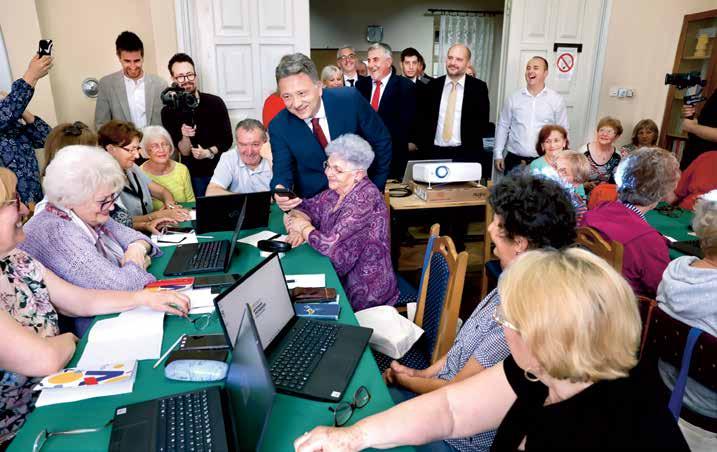
It was in December last year that we launched works on one of the largest projects of the Ministry of Information and Telecommunications, and that is the development of broadband communication infrastructure in rural areas of the Republic of Serbia. The first phase of the project will encompass the construction of a fibre optic route covering approximately 4,700 km, as well as encompassing around 700 rural settlements, almost 120,000 households and approximately 730 schools. The construction and commissioning of the network in the most rural settlements will be carried out in stages and completed by the end of 2025, by which time we expect over 99% of households in our country to have access to a fixed internet connection speed exceeding 100 Mbps. The introduction of high-speed internet will enable access to e-government services, digital schooling and digital content, even in the smallest separate classes of primary schools. The
great advantage of this project is that it will contribute to launching business, as well as the possibility to take advantage of e-commerce that makes agricultural produce and other products available at any time via the internet.
How does the new Law on Electronic Communications contribute to Serbia’s European integration process and the introduction of identical market conditions for all business stakeholders?
The new Law on Electronic Communications strives for full harmonisation with Directive (EU) 2018/1972 of the European Parliament and Council on the establishment of a European Electronic Communications Code. With the introduction of this law, we contributed to fulfilling obligations linked to the Stabilisation and Association Agreement and the adoption of EU acquis within the scope of Chapter 10 - Information society and media. This law encourages the connection and availability of electronic communication networks of the new generation and their use by citizens and businesses, as well as encouraging the development of the market and supporting the improvement of the business environment for all business stakeholders, enabling the more efficient management and use of limited public resources and providing additional protection for end users, while also enabling maximum benefits in terms of the choice, price and quality of services.
The introduction of high-speed internet will enable access to e-government services, digital schooling and digital content, even in the smallest separate classes of primary schools
In the increasingly intricate landscape of security concerns, Huawei has stepped up with an ingenious solution that represents a cornerstone in the fight against ransomware: OceanStor Pacific Scale-Out Storage

Huawei is a global leader in technology and information solutions that’s committed to shaping the future through innovation. With a focus on connectivity, cloud, artificial intelligence and more, Huawei’s cutting-edge solutions empower individuals, organisations and societies to thrive in a digital world.
In the increasingly intricate landscape of security concerns, encompassing personal safety and safeguarding digital ecosystems, the spectre of ransomware incidents has emerged as a pressing challenge. As we reflect on the events of 2022 – a year that was marked by a staggering surge in ransomware attacks globally, with reported cases surpassing 35.83 million – the call to arms for comprehensive ransomware protection mechanisms has become louder and more imperative. This surge, representing a stark increase of over 13 million incidents compared to the previous year, underscores the gravity of the situation, prompting a need for innovative and effective solutions that ensure the continuity, stability and resilience of diverse industries.
In the realm of cybersecurity, understanding the modus operandi of ransomware is crucial to mounting an effective defence. Distinctive in its nature, ransomware operates as a specialised form of malware that capitalises on data encryption to hold a victim hostage through orchestrated and targeted network attacks. This multifaceted attack is orchestrated through a series of phases: detection, attack implantation and activation, each of which requires a unique countermeasure to effectively thwart its progress. As the threat landscape continues to evolve, Huawei has stepped up with an ingenious solution that represents a cornerstone in the fight against ransomware: OceanStor Pacific Scale-Out Storage.
Distinguishing Huawei’s OceanStor Pacific Scale-Out Storage among the competition is its comprehensive suite of cutting-edge technologies specifically tailored to ransomware protection. This robust arsenal includes a multifaceted approach that includes data encryption, data tampering prevention, detection and analysis capabilities, and secure snapshots. These innovative layers of defence collectively serve to not only fortify data against malicious intent, but also to empower organisations to proactively detect and effectively respond to, and recover from, ransomware attacks, thereby bolstering overall data resilience.
This ensures that data remains inaccessible even in the face of potential breaches. Furthermore, data tampering prevention technology plays a pivotal role in maintaining the integrity of stored information. By preventing unauthorised modifications and leveraging Write Once Read Many (WORM) technology for unstructured data, OceanStor Pacific offers unparalleled protection against tampering and unauthorised alterations.
Moreover, the solution’s ability to detect and analyse ransomware attacks in real-time is a game-changer. Leveraging a multi-layered approach, it includes pre-attack measures that block known ransomware extensions, continuous monitoring during an attack, and post-attack analysis to identify the presence of ransomware within the filesystem.
In delving deeper into Huawei’s solution, its data encryption mechanisms offer a dual layer of protection, encompassing both storage and transmission encryption.
Equally remarkable is the secure snapshot feature that Huawei offers as part of its ransomware protection solution. By creating secure snapshots that cannot be deleted, the system preserves clean copies of data even in the face of a cyber threat. This functionality, coupled with timely alarms, empowers organisations to take swift action against ransomware, thus minimising the potential damage and reducing losses.
In an age where the significance of data is ubiquitous across industries, Huawei’s unwavering commitment to technological innovation serves as a beacon of hope
There can be no successful European integration for our region if we, as neighbours in the Balkans, don’t first integrate in an economic sense. We are interconnected markets, and we are already seeing that the Open Balkan initiative is yielding positive results in the fields of trade exchange and the labour market
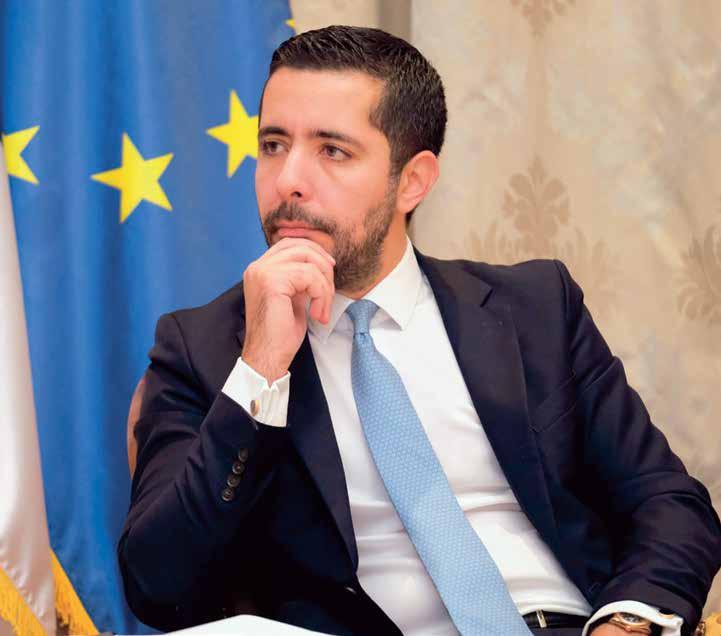
There can be no successful European integration for our region if we, as neighbours in the Balkans, don’t first integrate in an economic sense
The Ministry of Trade has placed high on its agenda the topic of reforms aimed at easing companies’ operations and increasing our country’s GDP
The positive effects of linking the countries of the Western Balkans are extremely evident in the domain of the work of the Ministry of Internal and Foreign Trade. “During the short period that this initiative has existed, we have succeeded in abolishing a large number of taxes and certifications, as well as unnecessary administrative procedures at the borders, thereby reducing the operating costs of companies in the region. The results are such that the time required to export or import food products has been reduced by up to 50%, while the direct costs of taxes and charges have been cut by up to 80%, which has resulted in increasing the volume of the trade exchange in the “Open Balkan” region by almost 30%,” explains Serbian Internal and Foreign Trade Minister Tomislav Momirović.
When it comes to connecting in the area of creating a unified labour market, this initiative is expected to yield significant results.

“We are bearing witness to the fact that Serbia and the region are today confronted by a labour shortage and that we are increasingly seeing workers coming from the world’s most distant countries. On the one hand, this is an indicator that our economies have advanced, but it also prompts a question as to how we can overcome these challenges, which we haven’t previously faced,” says Momirović, explaining that the Open Balkan initiative itself is seen as providing a solution to the labour shortage issue.
Minister Momirović announces that we are awaited by a further liberalising of the labour market by the end of summer, when workers from any of the three countries will be able, with “Open Balkan” identification numbers, to gain employment in these countries without any additional administrative barriers. “Our aim is to establish, as soon as possible, a unique identification number for all people on the market of Serbia, North Macedonia and Albania,” says Momirović.
What will be the most important steps you take in your capacity as chairman of the National Coordination Body for Trade Facilitation (NKTOT)?
For me, as a person who hails from the economy, the role of chairman of the National Coordination Body for Trade Facilitation is vitally important and I’ll do everything in the period ahead to ensure we achieve results that will be meaningful to our economy. The Ministry of Trade has placed high on its agenda the topic of reforms aimed at
The “Open Balkan” Initiative has enabled an up to 50% reduction in the time required to export or import food products among member countries
easing companies’ operations and increasing our country’s GDP. The Government of the Republic of Serbia strongly supports all economic and trade processes that target EU accession and strengthening regional economic cooperation. Moreover, negotiations are underway on free trade agreements with China, Egypt, the UAE and the Republic of Korea. We expect these agreements to contribute to further inflows of investments to Serbia.
Where do you see crucial barriers to trade that are hampering the further growth of foreign trade?
Our most important export market is the European Union, and our country also represents an important transit area
The market inspection sector conducted 5,345 inspections in 2023, removing goods worth close to 10 million dinars
which partners from the region use to trade with EU member states. For Serbia, long waiting times at borders for trucks transporting goods, particularly at border crossings with EU member states Hungary and Croatia, are an extremely important issue that impacts trade.
I must also underline the unilateral decisions of one of the trade partners in the Western Balkans that are leading to huge problems. Specifically, we have witnessed Priština deliberately making unilateral decisions that are intended to halt the free flow of goods and cause enormous damage to
all companies trading in these lands. These kinds of decision are completely at odds with all European principles, which imply the free flow of people, goods, services and capital. The Government of the Republic of Serbia, together with its partners in the Western Balkans, is exerting every effort in an attempt to relax and enable the free flow of people and goods, all with the aim of achieving progress and the economic development of the Republic of Serbia, but also of the entire region. I remain hopeful that our European friends will be able to influence things returning to normal and enabling free trade.
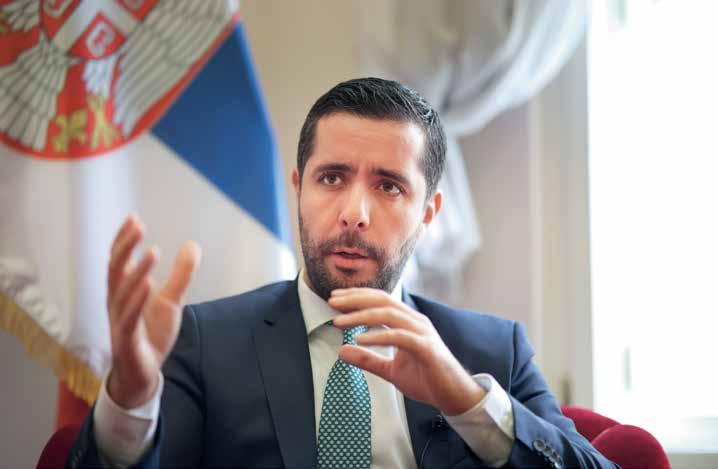
What steps are you taking in order to simplify and reduce formalities related to foreign trade and how do these efforts involve interested members of the business community?
We define activities in close cooperation with representatives of the business community and in order for us to work together to improve conditions and remove obstacles to foreign trade. Representatives of the Chamber of Commerce & Industry of Serbia, AmCham and the Foreign Investors Council are always present at all sessions of the NKTOT and their voice is always heard. We have extremely well-developed professional cooperation with
representatives of the business community, at both a high and professional level, and we formulate NKTOT activities on the basis of their initiatives and proposals. Our objective is to reduce formalities, to switch as much as possible to an electronic system of operations for all border inspections, to harmonise the working hours of border inspections with all neighbouring countries and establish, where possible, the integrated management of border crossings, i.e., a so-called ‘one-stop shop’.
What are your plans for the further development of e-commerce?
E-commerce is experiencing dynamic growth in Serbia, and data suggest that around 4.5 million citizens will use these services by 2027. With an awareness of these stats and the fast-growing e-commerce trend in our country, we will take all the necessary steps to respond to all the challenges in this field. We will continue activities that imply raising consumer awareness and trust when it comes to e-commerce and will continue further encouraging cashless payments. We are paying special attention to monitoring trends on the EU market, where we are awaited by significant changes in the legislative field in order to enable our companies to export goods to this market through e-commerce channels.
For me, the role of chairman of the National Coordination Body for Trade Facilitation is vitally important and I’ll do everything to ensure we achieve results that will be meaningful to our economy
In the dynamic landscape of the Serbian banking scene, one institution stands out as a beacon of excellence and innovation: OTP banka Srbija. As the local market’s top creditor, and with its prominent role in providing services such as factoring, e-commerce and leasing, OTP banka Srbija is at the forefront of redefining industry benchmarks in the fields of customer-centricity, corporate social responsibility and sustainability
The claims above are substantiated by the current position of OTP banka Srbija as the leading creditor in corporate and retail banking segments in Serbia, as well as the bank’s strong commitment to implementing the green agenda and developing a financial culture.
With the ambition to become the market leader in green financing, and with a steady transition towards carbon neutrality, OTP banka Srbija has aligned its business strategy with the principles of sustainable development and achieving a balance between economic, social and ecological impacts and objectives. In this regard, the bank has adopted its own ESG strategy with defined targets, KPIs, expectations and organisational structure. The reporting process is aligned with the internationally recognised standards of the Global Reporting Initiative (GRI) and OBSr has contributed directly to achieving nine of the UN’s Sustainable Development Goals.
Initiating, supporting and promoting green projects, both internally and externally, is part of OTP banka’s ESG commitment. One of the key projects in this domain is Generator ZERO, where innovators, start-ups, micro companies, SMEs and civil society organisations are invited to submit their innovative solutions focused on carbon footprint reduction and advancing the green economy. Through another extension of the Generator project - Generator of Good Deeds - the bank aims to increase visibility and provide support to small businesses.This initiative involves organising fairs showcasing social enterprises and environmentally-friendly businesses.
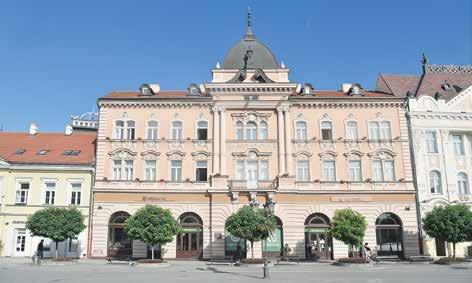
In 2023, OTP Fund Management, together with OTP banka Srbija, acquired ILIRIKA DZU, a Serbian asset management subsidiary of the ILIRIKA Group. This strategic move significantly expands the bank’s range of capital market products and services.
With total assets of 6.91 billion euros, OTP banka Srbija is now one of Serbia’s leading banks, while this acquisition is aligned with the bank’s ambitious plan to become a key player in the investment market within a period of five years. This also marks an important step forward on Serbia’s investment fund market, which is gradually expanding with assets under management reaching 630 million euros.
The forward-looking strategy of OTP banka Srbija is guided by four key pillars: elevating cu-
With a total of 154 branches in 90 cities and six regions nationwide, OTP banka Srbija has an extensive footprint and is the first bank of choice for more than 730,000 active clients.
stomer satisfaction; nurturing a thriving digital culture; streamlining operations through digitalisation; and advancing data-driven management practices. With these strategic objectives to the fore, OTP banka Srbija is dedicated to delivering exceptional banking experiences, driving digital transformation and contributing to a greener and more prosperous tomorrow for our country.
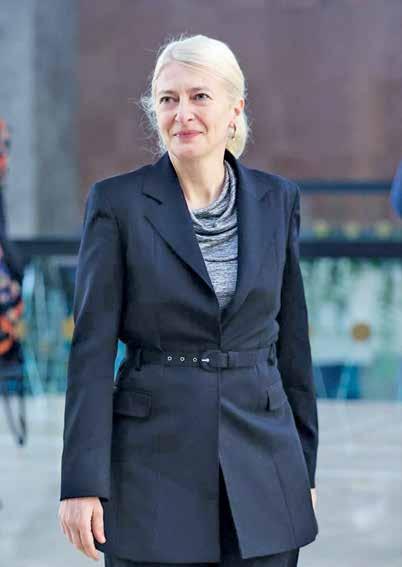
We believe that the future BIO4 ecosystem will help with the growth of GDP, the reducing of unemployment and the attracting of experts from all over the world, but that it will also improve our cooperation with domestic and foreign companies as well as contributing to the development of new sectors and start-ups
Construction of the BIO4 Campus, which is a multidisciplinary project that’s unique in the wider region, represents the central element of national investments in bioeconomic development. Apart from advancing domestic science and the innovation ecosystem, the operations of the BIO4 Campus will also significantly advance our economy.
“Our future depends on the development of science and technology,” says Jelena Begović, Serbian Minister of Science, Technological Development and Innovation. “Human capital is the foundation for the sustainable economic development of every society, and this kind of campus will enable research and development in the fields of biotechnology, biomedicine, biodiversity and bioinformatics, but also agriculture, pharmaceuticals and other industries that depend on biological resources. Scientists and innovators from these fields will be concentrated in one place, which will entice foreign investors.”
It is planned for the BIO4 Campus to start operating at the end of 2025, when the Ministry also expects the first visible results when it comes to attracting foreign companies. Certain companies have already expressed their interest in participating in this project. They are primarily companies from the biopharma field, such as Takeda, MSD, Roche and Swiss Rockets, but also BGI, the largest genomics centre.
The pilot project “Using artificial intelligence in the early diagnosis of rare diseases” was recently launched at three major health centres in Serbia – University Clinical Centre (UKC) Serbia, University Children’s Clinic in Tiršova and Clinical Hospital Centre (KBC) Zemun – in collaboration with the Institute for Artificial Intelligence of Serbia. This is one of the activities being conducted within the scope of the BIO4 initiative. Could you tell us more about this project?
We expect the BIO4 Campus to show the full potential of this long-term project within five to 10 years of the launch of operations
The Republic of Serbia is on track to no longer being merely an observer, but rather one of the important participants and creators in the processes of resolving global problems
This project, which our experts are working on in cooperation with company Takeda, represents a significant step towards improving diagnosis and treatment for patients suffering from rare diseases in Serbia. Diagnosis is crucial to the treatment of rare diseases, but a lack of data and experience means that this process is capable of lasting an extremely long time, resulting in delays in the applying of an adequate therapy, provided one exists.
Thanks to the application of artificial intelligence, this project has significantly eased and accelerated the process of identifying potential cases of Fabry disease, thereby providing a chance to make an early diagnosis and apply treatment in a timely manner.
New technologies have huge potential to contribute to improving patients’ quality of life, but also to advancing the healthcare system as a whole. The Institute for Artificial Intelligence of Serbia will be among the future tenants of the BIO4 campus and will continue developing biomedicine applications for this technology.
Speaking in one interview, you stated that science proved itself to be exceptionally important during the pandemic. Has that momentum been maintained and is there an increase in the number of examples of cooperation between science and business?
The scientific community demonstrated exceptional solidarity and its agility during very difficult times. It showed that the future of society depends on the development of science and technology. The momentum and awareness of that remain present, and cooperation between science and business is strengthening continuously.
The Ministry of Science, Technological Development and Innovation provides strong support to start-ups that emerge at colleges and institutes, but also beyond them, via – among other things – science and technology parks, the Innovation Fund and the Science Fund. Thanks to those efforts, but also to the unrelenting energy of our innovators, we are recording significant increases in the number of start-ups. Through the work of the BIO4 Campus, the number of start-ups in the field of biotechnology, including biomedicine, we will increase even further.
What is your Ministry doing to overcome obstacles hampering both the horizontal and vertical transferring of technology?
The scientific and innovation community in Serbia is yet to experience its full flourishing, thanks to the joint efforts of all of us
It is important for scientists to pose themselves a question as to whether there are applications for what they are researching, and for the answer to generally be yes. Of course, the technology transfer process requires new knowhow and skills that must be formalised in the education system.

We are working on the creation of an environment favourable to both horizontal and vertical transfers of technology and stronger cooperation between scientific institutions, universities, innovation system participants and the private sector, through programmes that ease the transferring of knowledge and technologies through the development of science and technology parks and networking them with start-ups and Smart City centres nationwide across Serbia.
The Katapult Accelerator programme of the Innovation Fund is developing an innovative ecosystem in Serbia and improving cooperation between science and business, which helps innovators to develop an entrepreneurial spirit and encourages them to market their ideas in the best possible way.
It is planned for the BIO4 Campus to start operating at the end of 2025
Could Serbia impact positively on the more balanced technological development of the region with the construction of science and technology parks?
In addition to the four science and technology parks that currently exist, in Belgrade, Niš, Novi Sad and Čačak, the launch of construction of another such park, in Kruševac, is also planned. There are also 21 innovative start-up and Smart City centres that have opened to date and are now operating, and by the end of this year there will be 26. The opening of new such centres is planned in Bajina Bašta and Loznica. We will next January open one of the country’s largest innovation centres, in Novi Pazar, which we can say with certainty will be like a mini science and technology park. Science and technology parks, as well as these kinds of centres, provide local researchers and innovators with better possibilities to access infrastructure and finances, and establish cooperation with business, universities and research institutions.
To what extent does our existing economic ecosystem value entrepreneurship and innovation and how much does FDI in this area contribute to the creation of this kind of ecosystem?
The establishment of the Ministry of Science, Technological Development and Innovation, within the framework of the Government of the Republic of Serbia, was born from recognition of the need to devote more attention and commitment in these areas. The institutional support that the Republic of Serbia provides to exceptional minds is certainly proof that we are enduring in this process, but also that we have something to work on.
I am convinced that the scientific and innovation com-

munity in Serbia is yet to experience its full flourishing, thanks to the joint efforts of all of us, and efforts aimed at creating a better future for future generations. The Republic of Serbia is on track to no longer being merely an observer, but rather one of the important participants and creators in the processes of resolving global problems
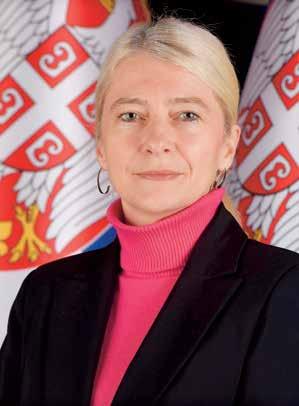
We are working to create an environment favourable to horizontal and vertical transfers of technology and stronger cooperation between scientific institutions, universities, innovation system participants and the private sector
 MARIJANTI BABIĆ, COUNTRY HEAD AT RIO TINTO, PROJECT JADAR
MARIJANTI BABIĆ, COUNTRY HEAD AT RIO TINTO, PROJECT JADAR

Serbia’s Jadar Valley is home to a high-quality deposit of lithium – a metal that’s critical to the global transition to a more sustainable and clean energy future
With an estimated capital investment of at least 2.55 billion euros, the Jadar project would be the single largest foreign direct investment in Serbia’s modern history.
You were recently appointed Rio Tinto’s Country Head for Serbia. What motivated you to take on this role despite the challenges being faced by the Jadar project?
Having worked on the project for the last four years, I truly believe in Jadar - that jadarite can be mined and processed sustainably. This is an exceptional project. It has the competitive advantage of being a significant resource that is strategically located near large EU markets. The economic opportunity that’s on the table for Serbia is huge. And developing Jadar does not need to come at the cost of the environment.
Jadarite would be mined underground, using the world’s best technologies to make it sustainable and safe. Importantly, local farming and agriculture would be able to continue alongside the mine.
There is still a lot of misinformation about the project, so we need to keep working with the Serbian public to ensure the project and the benefits it could bring are fully understood before the project is “dismissed”. This is most important for the local community, which is why our team is out in Loznica every day, talking to the wider local community, listening to their concerns and better explaining our project and the work we have undertaken over the years.
How has the mining industry changed to meet the needs of communities and policymakers?
Our world is changing and mining is changing with it. We are moving away from a linear model of “take, make and dispose” to a circular model
that explores ways for waste to be processed and reused. Our scientists and engineers have discovered ways to take mining waste and repurpose it to create useful products. This is something we are focused on in Serbia, and I am proud to say that our experts are developing innovative solutions that will allow us to reuse more than 50% of the residue from the processing facility. We know that we have more work to do, but we can draw on the expertise of our colleagues around the world who have already made significant breakthroughs in this
area. For example, at our Canadian aluminium operations, we are able to repurpose 85% of the waste to make new products. In Quebec, we are recovering scandium from titanium dioxide waste, without the need for additional mining. In just two years, we’ve taken this from a concept in a laboratory to now supplying about 20% of the global scandium market - all from waste. At our Kennecott Copper operation, we have discovered how to extract tellurium from our refining waste, making us one of only two U.S.-based producers of tellurium – a mineral that’s used in solar panels. I’m really encouraged by these innovations and how we’re changing our approach to mining for the better.
Critical minerals are needed for the energy transition, but the challenge for the mining industry is finding ways to extract them sustainably.
The World Bank has predicted that the global production of minerals will need to increase by almost 500% by 2050 in order to meet the growing demand for renewable energy technologies. This means we’re going to have to mine more and recycle more. While it’s clear that mining is central to a more sustainable future, I believe our industry needs to do more to prove it can be done sustainably.
Technology has a big role to play. Mining technology has come a long way over recent decades and Rio Tinto is doing a lot in this space. For example, some of our mine haul trucks in the Pilbara region of Western Australia are directed by a controller sitting almost 1,500 kilometres away, from the safety and comfort of our Operations Centre. Moreover, in 2019 we operationalised AutoHaul, the world’s first fully autonomous, long distance, heavy-haul rail network.
While technology and innovation are important in helping us to mine safely and efficiently, ESG is central to what we do. What this means in practice is that we are
Our experts are developing innovative solutions that will allow us to reuse more than 50% of the residue from the processing facility
working closer than ever before with communities to ensure that they benefit from our operations. In parallel, we can continue to support the global energy transition through the production of the minerals needed for cleaner, greener technologies.
But it’s not enough to simply provide the materials for the energy transition – we also need to play our part in tackling climate change by decarbonising our own operations.
Our goal is net zero emissions by 2050. We are investing around $7.5 billion before 2030 to deliver our decarbonisation strategy and reduce Scope 1 and 2 greenhouse gas emissions by 50% in that timeframe. We are moving to renewable energy sources, electrifying everything we can and increasing our investment in R&D to accelerate the development of new technologies that will help our customers decarbonise. And, finally, we’re aiming to increase the production of materials that enable the energy transition, such as lithium and copper.
How is Rio Tinto’s Battery Materials business responding to the world’s growing demand for battery materials?

The sustainable development of batteries and large-scale energy storage is a key enabler of the transition to renewable energy. Lithium-ion batteries are extremely important to the energy transition, because they’re lightweight, charge faster, last longer and have a higher energy density than the alternatives.
The rising demand for lithium is driven by the e-mobility revolution. Electric cars need batteries and those batteries need lithium. This brings us back to the Jadar project. The Jadar discovery ranks among the most significant undeveloped lithium deposits in the world. It could supply internationally significant quantities of lithium products to the electric vehicle value chain for decades to come.
How can Serbia capitalise on the opportunity created by the e-mobility revolution?
With an estimated capital investment of at least €2.55 billion, the Jadar project would be the single largest foreign direct investment in Serbia’s modern history. The project would increase the country’s GDP by around €1.9 billion – the equivalent of more than 3% of current GDP – and, more importantly, it could act as a catalyst for an entire home-grown electric transport industry.
The global electric transport revolution offers Serbia many opportunities. It’s predicted that more than a trillion euros will be invested globally in the e-mobility sector between now and 2030. Serbia could capitalise on that opportunity. Analysis suggests that vertical integration in the e-mobility ecosystem could multiply the value of FDI in Serbia and have far-reaching impacts on job creation: €6.2 billion in new FDI, and the creation of over 21,000 highly skilled, highpaying jobs.
However, trust and credibility come before figures and numbers: they are the key to the future of mining in Serbia and beyond. We are committed to developing Jadar in a fully transparent and accountable way to the highest environmental standards.
We are working closer than ever before with communities to ensure that they benefit from our operationsNICOLA PONTARA, WORLD BANK COUNTRY MANAGER FOR SERBIA
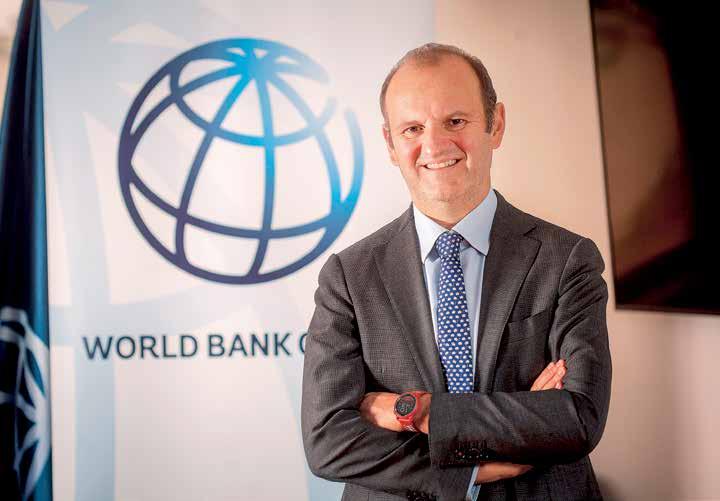
Serbia’s potential for accelerated growth lies in enhancing its public institutions and governance, investing in human capital development to increase productivity, promoting regional integration and connectivity, and transitioning towards a more environmentally sustainable economy
The World Bank is involved in multiple projects in Serbia that are aimed at enhancing digital services, improving public financial management, promoting early childhood cognitive development, strengthening primary healthcare, enhancing railway sector maintenance, building local selfgovernment capacities for climate-resilient infrastructure, reducing trade costs, boosting household energy efficiency
and enhancing the productivity and competitiveness of Serbian farmers. Here we discuss these and many other topics with World Bank Country Manager for Serbia, Nicola Pontara.
What, in your opinion, presents the biggest hurdle for the Serbian government in implementing systemic reforms and reorganising public enterprises?
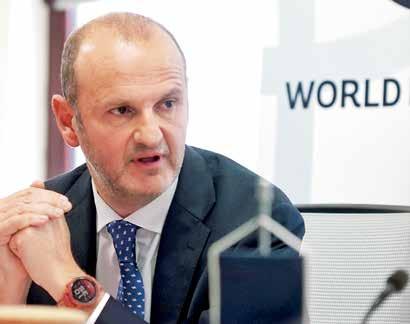
The energy crisis may be over, but we still need reforms for long-term power sector stability and decarbonisation
Building private sector confidence is crucial for Serbia, because it has one of the lowest rates of domestic private investment in Eastern Europe
Serbia has achieved substantial progress in selling and restructuring more than 500 state-owned enterprises over the last decade. And yet, some important sectors of the economy (energy, transport) are still managed through state-owned enterprises. Some of these enterprises can become a source of systemic risk: we saw this with Elektroprivreda Srbije (EPS) during the recent energy crisis. The remaining large, state-owned enterprises need to be put on a financially sustainable footing, with greater commercial orientation and stronger corporate governance. Some provisions of the recent law on public enterprises represent steps in the right direction. Welcome developments also include the recent transformation of EPS into a joint stock company, the appointment of supervisory and executive board members, as well as efforts that are underway to select a general manger though a competitive process.
The World Bank has 14 active projects in Serbia, covering areas such as construction, education, transportation, governance, finance, energy, agriculture, healthcare and macroeconomics. Which of them do you consider as being the most helpful when it comes to removing obstacles to growth?
Serbia can grow faster if it manages to strengthen its public institutions and governance, build human capital and foster productivity, boost regional integration and connectivity, and decarbonise the economy. Several World Bank projects seek to improve the digitalisation of services (cadastre, tax administration) and improve public financial management. In human development, we seek to build the cognitive skills of Serbian children in early childhood and to strengthen primary healthcare. In transport, we work to strengthen maintenance in the railway sector, build the capacity of local self-governments to manage climateresilient infrastructure and reduce the costs of exporting and importing. In energy, we want to increase the uptake of energy efficiency by households. In agriculture, we strive to improve the productivity and competitiveness of Serbian farmers.
To what extent have we addressed and resolved the domestically induced energy crisis from last year, considering its significant impact on growth prospects and state financial resources?
Serbia must expedite its economic growth to reduce the time required to reach the average per capita income of the EU27
The energy crisis may be behind us, but reforms still need to be implemented in order to stabilise the power sector in the long-term, while decarbonising the power generation mix. In March 2023, in order to help the government deal with the impact of the energy crisis and reform the energy sector, we approved $160 million in fast disbursing budget support under the First Green Transition Programmatic Development Policy Loan. Parallel financing also came in from the German KfW and French AFD. This loan aims to ‘green’ the state budget and investment framework; stabilise and modernise the power sector through the corporate restructuring of EPS, scale up renewable capacity and strengthen the energy efficiency of public and residential buildings; and to align Serbia’s regulatory frameworks on climate change with EU directives.
How would an economic growth rate below 3% this year in Serbia (according to some economists it might be below 2%) impact the country’s quest for convergence with the living standards of European Union members?
Our most recent projections indicate that economic growth for 2023 may be lower than previously expected, due to a slowdown across Europe, including among Serbia’s key trade partners, as high inflation dampens business and
Promoting innovation in Serbia, with the World Bank’s decade-long support, is vital for improving productivity, creating better jobs and driving economic growth
consumer confidence. Some of the leading indicators that we use to estimate growth – such as retail trade, construction, and agriculture – suggest that growth may hover around 2% in 2023. Serbia needs to accelerate the pace of economic growth to shorten the time required to converge with the average per capita income of the EU27. Some areas for action include improving the quality of education, removing barriers to labour market participation (especially for women), as well as increasing standards of governance and SOE oversight.
The World Bank study “New Growth Agenda”, which was published before Covid-19 hit, highlighted productivity in Serbia as being generally low, thereby limiting the potential for wage growth. How should we address this concern effectively?
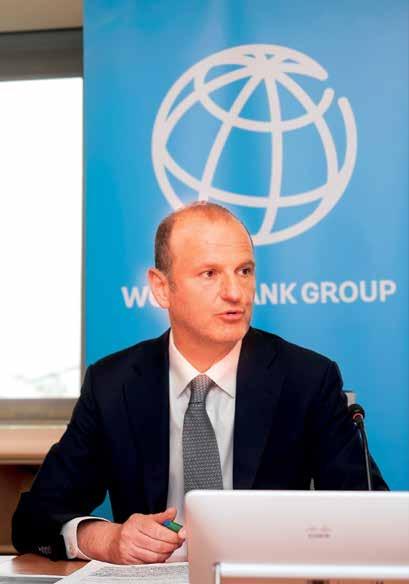
Increasing the level of productivity in Serbia will take time. Some of the required changes are not under the direct influence of the government. It is up to the private sector to change management practices, improve skills and invest in new technologies. But the government could help implement reforms to enable a better business environment: reducing red tape, streamlining the tax and customs system, and reforming the education system. Boosting private sector confidence is important, since Serbia has one of the lowest rates of domestic private investment in Eastern Europe. Serbia also needs to attract FDI to sectors with higher productivity, which can create high-quality jobs and have the potential for linkages to the local economy, such as smart mobility and advanced IT services.
According to the European Innovation Scoreboard 2023, Serbia is improving when it comes to the innovation field. How do you support this progress?
Fostering innovation is essential for Serbia to increase productivity, create quality jobs and raise the economic growth rate. The World Bank has partnered with Serbia for over a decade to support the country’s innovation capacities. Our initial collaboration, in 2011, resulted in the creation of the Innovation Fund, which today disburses around 30 million euros annually to contribute to the innovation of Serbian enterprises. Our current flagship innovation project, the Serbia Advancing Innovation and Growth Entrepreneurship, builds on these efforts, in partnership with the EU. Our next exciting prospect is to help the government move into the artificial intelligence space.
The World Bank recently approved a loan aimed at assisting the Government of Serbia in implementing its Capital Market Development Strategy by strengthening relevant capital market institutions, one of the weakest spots in the reform process. What factors led you to believe that now is the right time to initiate this process once more?
The financial sector plays an important role in channelling a country’s savings to firms so they can invest and grow. In recent years, several state-owned financial institutions were streamlined and asset quality improved, while non-performing loans fell sharply. The macro-fundamental prerequisites for the development of capital markets are in place, but diversification of long-term financing sources beyond banks still has some way to go. We are supporting the government and its Capital Markets Development Strategy through a project to develop the corporate bond market, including through green and other thematic issuances.
It would be important to financially stabilise the remaining state-owned enterprises by instilling a more commercial focus and enhancing corporate governance, with some positive steps having been taken through recent legislation on public enterprises
Nestlé Serbia, as the first Nestlé company in the region, has begun applying regenerative agriculture practices and continues to expand the number of domestic producers it includes in this pioneering programme.
Our plan is to source half of our key raw materials from regenerative agriculture by 2030, which will impact positively on the environment and local communities – announces Nestlé’s Ivanka Stojnić, before presents more details of the company strategy that’s being applied at the global level.

What are the key benefits of regenerative agriculture and how do you promote these kinds of practices in Serbia?
Regenerative agriculture represents a response to the challenges brought to the planet and society by conventional agriculture. Instead of securing food supplies, conventional farming practices are becoming a worse source of pollution than, for instance, the energy sector, which is worrisome. Regenerative agriculture paves the way to a more sustainable, environmentally responsible and economically prosperous agricultural sector. With a focus on restoring the soil and preserving biodiversity, it encompasses practices like strip till, cover crops, organic fertilisers and technologically advanced precision agriculture. Through partnerships with local producers of vegetables, sunflowers and – as of this year – soybeans, Nestlé wishes to promote sustainable practices in agriculture and to support local communities. These and similar partnerships enable new agricultural practices to be applied in the production of the raw materials that are crucial to our products, which in turn contributes to the company’s long-term sustainability and more
environmentally responsible operations, while we believe that it also sets a good example for the agricultural sector, with the aim of preserving the land for future generations.
Why did Nestlé opt to promote this approach to land cultivation?
Our plan is to source half of our key raw materials from renewable agriculture by 2030.
Let’s use the strip till technique as an example. So-called shallow ploughing contributes to preserving soil and concentrating organic matter, while it also reduces the ecological footprint of agriculture and improves the sustainability of supply chains. The preservation of soil fertility is thus encouraged, with its erosion reduced, while savings on production resources are also made, with reduced fuel and fertiliser consumption, which also has positive economic effects. Furthermore, biodiversity isn’t only a key aspect of regenerative agriculture, but is also essential to the long-term sustainability of all food production systems. If the organic matter in soil continues to fall, the soil loses its quality and has a reduced ability to produce high-quality yields, which is why promoting regenerative agriculture practices is a task of both private companies and society as a whole. This is all reflected in our commitment to responsible operations and caring for the planet, and forms part of our strategy to impact the environment positively while simultaneously providing high-quality products.
How does this approach correspond to your environmental responsibility policies?
As a signatory to the UN’s Global Compact against climate change of 1.5°C, Nestlé has published a detailed plan to combat climate change. One of the elements is reducing emissions of harmful gases, with the end goal of achieving net zero by 2050. At the global level, Nestlé is already collaborating with 500,000 farmers and 150,000 suppliers in order to support them in applying regenerative agriculture principles that are ultimately directed towards restoring the ecosystem.
STOJNIĆ, SUSTAINABILITY MANAGER FOR THE SOUTHEAST EUROPEAN MARKET AT NESTLÉ
Regenerative agriculture paves the way to a more sustainable, environmentally responsible and economically prosperous agricultural sector
ALESSANDRO BRAGONZI, HEAD OF THE EIB REGIONAL REPRESENTATION FOR THE WESTERN BALKANS
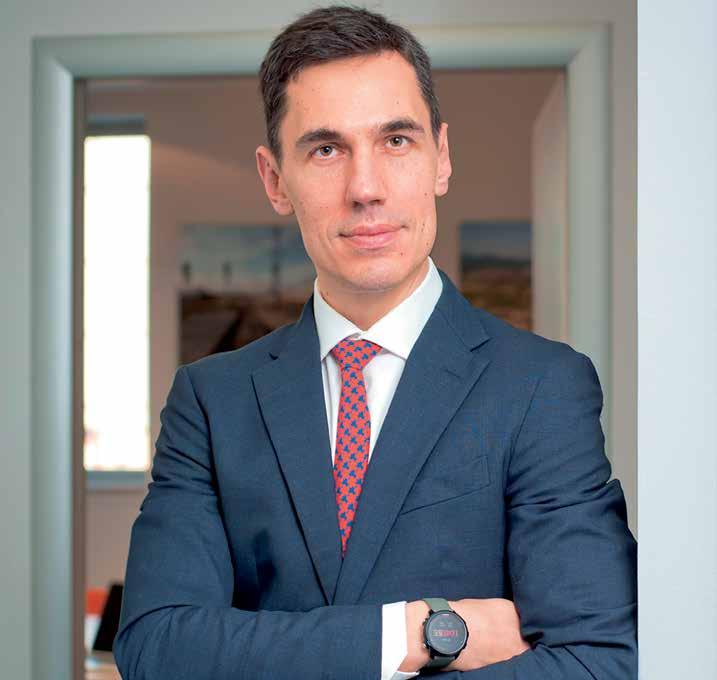
Amid the current challenges, Serbia can benefit further by using the impetus of nearshoring to move ahead with reforms within the accession process, scale up skills and create a greener, more integrated and more digitalised market
Serbia needs to align the quality and relevance of its education and training with labour market needs and prepare its market for the new digital era that is already unfolding
Serbia is exerting tremendous effort to transform itself into an alternative to more traditional ICT markets, prioritising this sector as one of the key pillars of its economy
Arecent investment survey conducted jointly by the European Investment Bank (EIB), the European Bank for Reconstruction and Development (EBRD) and the World Bank states that weak management capacity, political instability, taxes and low workforce skills are key obstacles for firms in the Western Balkans. “If I were to pick one obstacle where we see room for improvement, I would single out the expansion of workforce skills”, says Alessandro Bragonzi, Head of the EIB regional representation for the Western Balkans. According to our interlocutor, this issue is a key enabler for the region’s competitiveness and for seizing the opportunities of nearshoring. “The lack of (particularly digital) skills continues to hamper further economic progress both at the regional and European Union level. On top of that, the prevailing uncertainty regarding the economic outlook is expected to further constrain both government and firm-level investment in skills development,” he adds.
In Serbia, the EIB sees that the country is implementing measures to address this issue. EIB Global, the bank’s specialised branch for activities outside the European Union, has financed two projects to advance Serbia’s digital transformation. The first, with the government of Serbia, entails the introduction of new digital equipment, broadband infrastructure and skills in over 1 500 schools, helping to improve the digital abilities of the future workforce, contributing to better job prospects and the digitalisation of the economy. The second project concerns upgrading the existing 4G network and rolling out 5G across the entire country, enabling people from remote and rural areas to access high-speed internet and mobile services. “This will help mitigate the rural-urban digital divide in Serbia, leading to new job opportunities and equal access to information”, notes Bragonzi.
EIB Global aligns its activity with the EU enlargement strategy and its financing reflects the policies and priorities as set out by Serbia and the EU.
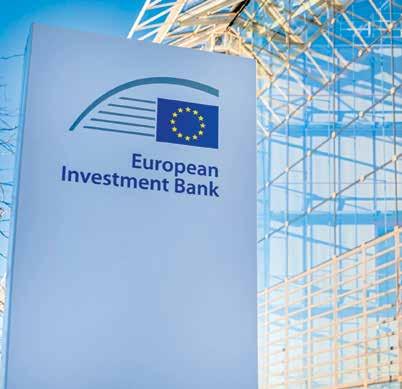
According to the European Commission’s 2022 report on Serbia, the country has continued the work on harmonising with EU standards in many areas, particularly on company law, freedom of movement for goods and workers, intellectual property rights, research and innovation and financial control. Further progress in the internal market area will be essential for early and stronger integration with the EU market and the creation of the Common Regional Market. There is still room for improvement regarding
We are proud to see an EIB loan to Serbia of €200 million fully allocated to the research and development sector, mainly to universities, scientific facilities and innovation centres
The EU Bank has significantly expanded its local team in Belgrade to deploy new innovative financial instruments in Serbia and across the whole of the Western Balkans
public administration and public financial management, especially regarding the full implementation of a single mechanism for prioritising all investments regardless of type and source of financing.
How attractive do you think the Serbian business environment is for major global chains that are considering nearshoring?
Solid and skilled human capital, combined with attractive labour costs, have been one of the country’s key advantages as an investment destination. In 2022, both import and export volumes kept growing considerably, reflecting strong foreign direct investment and continued integration into global supply chains. Despite the general slowdown in economic growth, unemployment fell from 11% in 2021 to below 9.5% in 2022. According to the International Monetary Fund (IMF), Serbia’s open economy has significant potential overall — including from the further relocation of skilled migrants and businesses and continued nearshoring — despite FDI inflow sensitivity, such as due to recent geopolitical developments.
In Serbia, we are particularly proud of the exports of the IT sector. However, it seems from your research that there is really a lot of room for improvement here?
These are remarkable achievements. However, remaining competitive means quickly adapting to the challenges of the future. In order to fully seize the opportunities arising from the fourth industrial revolution, progressive upscaling in the global value chains model, investing in digital infrastructure and speeding up the digital transformation of the economy are all essential. This also means a strong focus on skills.
Innovations, start-ups, connecting the economy and the academic community, building science parks – these are all initiatives that receive significant attention from the government of Serbia and donors, including the EIB. How ready are we to build a knowledge-based economy in this domain?
Modern research infrastructure, highly skilled individuals and quality research underpin the ability to innovate successfully. In Serbia, we are proud to see an EIB loan of €200 million fully allocated to the research and development sector, mainly to universities, scientific facilities and innovation centres that have been built and/or reconstructed thanks to the EU bank. These include the construction of the new science and technology parks in Belgrade, Novi Sad and Niš, which are already helping Serbia take a leading position in innovative technologies. Most recently, the new building of the cutting-edge BioSense Institute was opened in Novi
Serbia reached €2.7 billion of ICT service exports in 2022, representing a 45% increase compared to 2021
Sad, offering almost 7,000m2 of state-of-the-art facilities for scientific research and business ventures.
Along with investment in infrastructure, the university curriculum should be aligned with market demands and emerging job positions.
In parallel, it is important to support innovative startups and companies with dedicated financial instruments, which are often considered too risky for commercial banks. Interestingly, the European Investment Fund (EIF), part of the EIB Group, has supported almost half of the unicorn companies that have emerged in Europe over the past 15 years, including Skype, WeTransfer, Wise, Spotify, Shazam and Rovio.
We are glad to see that, with the set of energy laws adopted in 2021, Serbia is progressing in the area of energy security, energy efficiency and production via renewable sources
Companies in the region will benefit from the latest Western Balkans Guarantee Facility for green investments, innovations and the digital transition. This will be channelled through the Western Balkans Investment Framework.
How well is Serbia integrated with the EU at present?
I would say that Serbia is very much integrated with the European Union in terms of economic relations and has already benefited from immense EU support spanning several decades. The European Union is Serbia’s largest trade partner by far, accounting for around 60% of the country’s total trade.
At the same time, close economic ties with the European Union have led to knowhow and technology transfers, boosting productivity and competitiveness, and increasing budget revenues and economic growth.
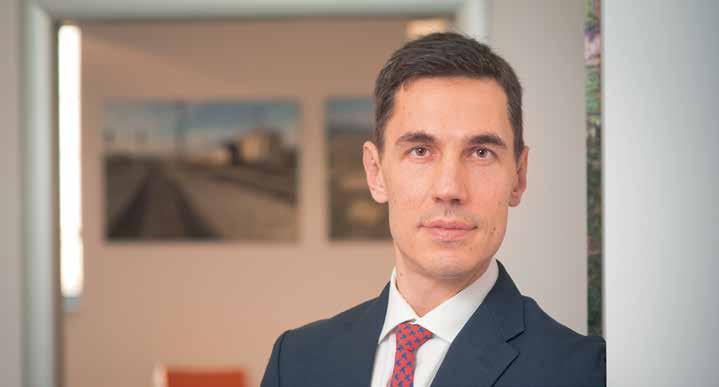

The Serbian Export Credit and Insurance Agency is a reliable partner to domestic exporters for whom it is essential to know that they will be able to collect on their foreign claims. That is a fundamental prerequisite for the normal operations and planning of every company, and for the economy of our country as a whole
According to the six-month review and projections, AOFI expects to achieve its highest level of insured limits and customer numbers in 2023 – despite the many difficulties caused by the economic downturn in the EU, which is Serbia’s main foreign trading partner – thus additionally helping the economy to grow.
Have your operations been impacted by the EU’s economic downturn and consequent reduction in Serbian exports?
Although the European economy is experiencing a downturn due mostly to the Ukrainian crisis, this is not the case with the Serbian economy and exports. According to official data, the Republic of Serbia’s goods exports increased by 1.2 billion euros, or 9.4%, in the first six months of 2023, thanks mostly to the rise in exports of the manufacturing industry, or more specifically the machinery industry, which recorded growth of 39.1%, the metals industry, with growth of 28.9%, and the electronics (28.7%), automotive (27.4%) and rubber industries, in which exports grew by 9.2%. AOFI, as the official export credit agency of the Republic of Serbia, has followed, and continues to follow, the growth trend of Serbian exports, mostly in terms of increasing the insurance of receivables.
In how many countries does AOFI today offer insurance for Serbian exporters?
AOFI is present on all continents and insures the claims of Serbian exporters in more than 80 countries. We try to meet as many of the requests of our clients as we possibly can and to enable, in cooperation with similar institutions from all over the
world, Serbian exporters to maintain and expand their existing markets and conquer new ones by working in cooperation with us. Accounts receivable insurance, as our primary product, should provide Serbian exporters with certainty and assuredness of payment, and thus continuous cashflow, which is one of the basic preconditions for growth. This product is plays a special role in the current conditions of the crisis that has gripped the entire world. Assuredness that a Serbian exporter will be able to collect on their foreign claims is a fundamental prerequisite for normal operations and planning, or for sustainable growth, as I have already noted.
To what extent do Serbian companies utilise AOFI’s services when it comes to short-term lending?
Short-term lending is indeed one of the products that AOFI has in its portfolio. It is predominantly intended for SMEs and entrepreneurs, given the current situation in the Serbian banking sector. It is necessary for clients wishing to apply for a short-term loan to satisfy mandatory conditions, such as realised exports with a value exceeding €100,000 over the previous year, a signed contract on the article for financing, net profits generated over the previous year and no outstanding taxes and obligations.
I would like to take this opportunity to mention that AOFI has brought to the market nonrecourse factoring with the insurance that AOFI conducts, either independently or in cooperation with banks. And it is precisely this product that can additionally accelerate the liquidity of Serbian exporters without running the risk that the non-payment of invoices on the part of customers will burden their cashflow, given that they are insured.
Accounts receivable insurance, as our primary product, should provide Serbian exporters with certainty and assuredness of payment
Inos Balkan, as a part of the Viohalco Group, monitors regulatory framework and technology developments closely and integrates them into its business operations, because the company is interested in establishing a transparent, secure and efficient procedure for inspecting the quality of raw materials

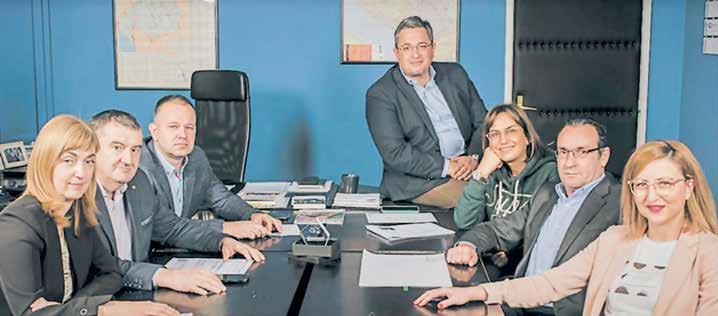
Investments in recycling Infrastructure, as well as technology transfers and exchanges of knowledge, could benefit Serbia’s secondary raw materials industry the most, as well as facilitating Serbia’s harmonisation with the European acquis. Here Inos Balkan GM Iosif Vangelatos explains how that is achieved.
How does implementation of the European Green Deal impact the secondary raw materials industry within the EU and,
more specifically, how does it influence the Serbian market?
The European Green Deal is a comprehensive policy initiative of the European Union that aims to make the EU climate-neutral by 2050 and that promotes sustainable econo-
mic growth. While the Green Deal focuses primarily on environmental sustainability and reducing greenhouse gas emissions, it has several implications for the secondary raw materials industry within the EU, but also in markets beyond the EU, including Serbia’s.
The Green Deal promotes circular economy principles, which prioritise the recycling and reuse of materials, and we should therefore expect to see increased demand for secondary raw materials. End users in all industries demand green products, while major manufacturers are striving to assess their entire supply chain in order to secure the minimising of their environmental footprint. Furthermore, financial institutions are including environmental aspects in their terms and conditions of financing. Investments in recycling Infrastructure, as well as technology
Combating illicit economic activities in the secondary raw materials sector requires a multifaceted approach involving legislation, enforcement, technology and international cooperation
transfers and exchanges of knowledge, could benefit the Serbian secondary raw materials industry the most, as well as facilitating Serbia’s harmonisation with the European acquis.
Which key prerequisites do you consider essential for attracting higher flows of foreign direct investment into the Serbian secondary raw materials market?
Attracting higher FDI into any sector of the Serbian economy, including the secondary raw materials industry, would require a combination of many parameters that would secure an environment conducive to busi-
vities, including illegal dumping, tax evasion, smuggling recyclables and the unauthorised collecting and processing of recyclable materials. These illicit activities have significant negative environmental, social and economic impacts, and thus every country needs to make addressing them a high priority. Combating illicit economic activities in the secondary raw materials sector requires a multifaceted approach involving legislation, enforcement, technology and international cooperation. I would emphasise the following:
Strengthen Regulatory Frameworks: enhancing and enforcing regulations related to
the secondary raw materials industry; and how are you preparing to embrace such changes?
Before I reply to your question, please allow me to note that we no longer need to envisage the influence of technological advancements on the secondary raw materials industry, as the 4th Industrial Revolution has already arrived. Technological advancements are already playing a significant role in shaping the new way that the secondary raw materials industry operates. Efficient sorting and separation, such as automated optical sorting systems and artificial intelligence algorithms, enable
ness. In order to flourish and develop more business opportunities, the secondary raw materials sector needs a clear regulatory framework, transparency and the rule of law, appropriate transportation infrastructure, a skilled workforce, public awareness of environmental issues and, of course, appropriate financial tools.
Over the last ten years, we’ve been witnessing the disinvestment of at least three major European recycling companies in Serbia. It is difficult to attribute these disinvestments to specific parameters among those I just mentioned, but I am confident that securing those parameters will create a more attractive business field for future FDI in our sector.
In the context of the secondary raw materials sector, what level of vulnerability to illicit economic activities exists and which strategies should be adopted to address this challenge effectively?
The secondary raw materials sector can be vulnerable to various illicit economic acti-
waste management, recycling and the secondary raw materials sector, focusing on waste management transparency and traceability;
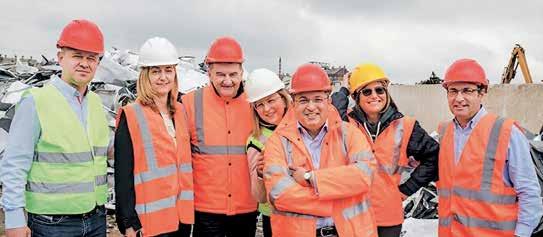
Environmental Audits: conducting regular environmental audits and inspections of recycling facilities and waste management operations to ensure compliance with environmental regulations and to additionally foster collaboration between government agencies, law enforcement, industry associations and environmental organisations in order to share information and intelligence on illicit activities;
Licensing and Permits: implementing a simplified (one step, if possible) and transparent licensing system for recycling facilities to ensure that only legitimate operators are allowed to participate in the sector;
Cross-Border Cooperation: collaborating with neighbouring countries to combat illegal cross-border activities related to recycling and trade in secondary raw materials.
How do you envisage technological advancements influencing the landscape of
the more efficient separation and utilisation of materials. When it comes to waste tracking and traceability, block chain and other digital ledger technologies could be used to create transparent and traceable supply chains for recyclables, enabling higher levels of accountability and the more efficient combating of illegal activities. Moreover, robotics and automation are also being applied to recycling processes. Robots can perform tasks like picking and sorting materials, especially in environments that are hazardous or require high precision. These are just a few examples of how technology is creating greater efficiency, sustainability and profitability in the secondary raw materials industry, as well as reshaping the business field in our industry.
We are monitoring those developments closely and our group is gradually integrating most of them into our processing of secondary raw materials. We are interested in establishing a transparent, secure and efficient procedure for quality inspections of our raw materials.
Efficient sorting and separation, such as automated optical sorting systems and artificial intelligence algorithms, enable the more efficient separation and utilisation of materials
Solving geopolitical tensions, some of which are not within Serbia’s control, would support and strengthen foreign direct investment (FDI). Additionally, the ongoing trend of EU countries nearshoring could potentially lead to even higher levels of FDI in Serbia
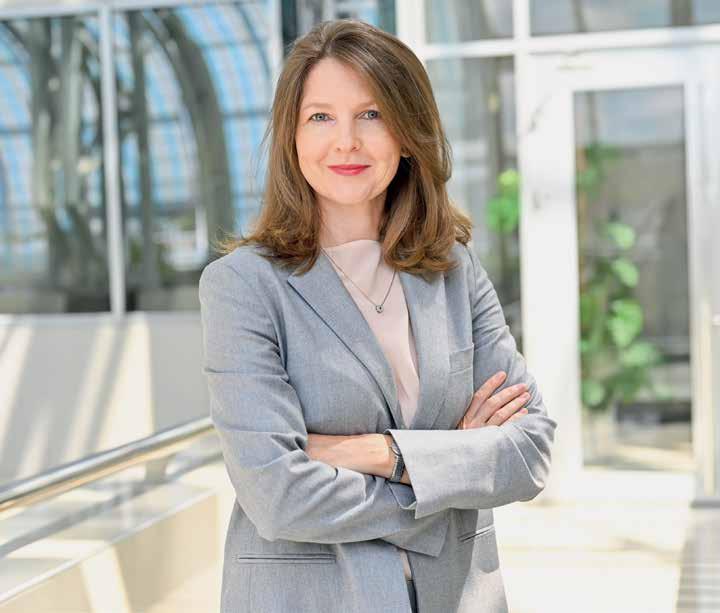
Continuing strict economic policies to reduce inflation is vital, because inflation remains a major challenge, and sustainable growth depends on stable prices
Serbia has experienced remarkably robust foreign direct investment inflows in the past ten years, surpassing its neighbouring countries in the region
Serbia has achieved remarkable economic progress over the last decade, with the government successfully preserving these gains in recent challenging years,” says Yulia Ustyugova, IMF Resident Representative for Serbia.

Living standards improved, inflation fell, public finances were strengthened and reserves were increased to an all-time high, helped by ample FDI inflows. The pandemic only temporarily interrupted this strong performance. Reflecting these positive developments, Serbia’s sovereign credit ratings were upgraded steadily over the past decade and now stand just one notch below investment grade, says our interlocutor.
“The past few years have, however, brought about crisis upon crisis,” says the IMF Resident Representative for Serbia.
Spillovers from Russia’s invasion of Ukraine, the sharp increase in international energy prices, domestic electricity production problems and tighter global financial conditions have increased Serbia’s external and fiscal financing needs. In response, the authorities have focused on preserving macroeconomic stability through their policies under a new Fund-supported Stand-By Arrangement (SBA).
“We are pleased to report that we see good results: macroeconomic imbalances have already started declining and further improvements are expected over the medium term. The 2022 fiscal and current account deficits have turned out far lower than previously expected, and foreign exchange reserves are now well above projections. The labour market has remained resilient, public debt is on a downward trajectory, and there is a continued influx of FDI supporting investments and exports, and bolstering reserves,” says Ustyugova.
High inflation has been a serious concern to citizens, businesses and policymakers around the world, including in Serbia. For citizens, high inflation increases living costs. We can see this in Serbia’s statistical data suggesting weakness in private consumption in the second half of 2022 and the first half of this year. For businesses, high inflation tempers investment because of rising input costs and increased uncertainty amid restrained consumer spending. The data shows that gross fixed investments decreased in the second half of 2022 and firms chose to run down previously accumulated inventories. As a result, economic growth slowed down.
The authorities responded to high inflation by tightening macroeconomic policies. This has been an appropriate
Priority reforms should improve both FDI conditions and local business opportunities, while ensuring fair competition between domestic and multinational firms
development, reducing regulatory expenses, enhancing infrastructure and refining governance
policy response. The National Bank of Serbia has been raising policy rates steadily. Fiscal consolidation has been supporting disinflation efforts. There is, of course, a cost to tightening in terms of softer growth in the near term, but not getting inflation under control now, and allowing it to become entrenched, would lead to much greater and longer-lasting pain later, including steeper rate hikes, weaker investment and weaker growth.
On a positive note, headline inflation has fallen from a peak of more than 16 per cent in March to 12.5 per cent in July, driven by favourable base effects and easing inflation momentum. And it is expected to fall further. Another positive observation is that, while employment growth has slowed in recent quarters, as businesses have been confronted by higher production costs, unemployment remains at a historic low. And the data suggest that economic growth accelerated in the second quarter of 2023. Having said this, it is important to continue to maintain tight macroeconomic policies in order to lower inflation further, as inflation
Critical areas for reform encompass continuous improvements in energy and broader changes to state-owned enterprises (SOE), investing in human capital
remains a key challenge and there cannot be sustainable growth without price stability.
How likely is it that the fiscal policy will remain relatively tight in 2023, given the approved and expected additional spending measures?
The government did approve additional spending measures in mid-2023, but this has not changed fiscal targets for 2023 and beyond, envisaged under the Fund-supported SBA. This is because the new measures will be financed from revenue overperformance, savings in other public sector expenditure items, including lower subsidies to energy SOEs, and some targeted revenue measures. This means that an overall restrictive fiscal stance, planned for 2023, is being maintained and supports disinflation and debt reduction.
Deep structural problems persist in the energy sector and are a key focus of the SBA. How do you assess the government’s efforts in dealing with this problem?
The government recognises the importance of a robust energy sector in driving overall economic development and managing fiscal risks. Therefore, energy sector policies play a central role under the SBA. The planned reforms focus on a wide set of issues: securing financial viability and enhancing the corporate governance of energy SOEs, boosting Serbia’s energy security, and laying the foundations for green transition. A set of measures has already been implemented: EPS has undergone legal restructuring and a professional supervisory board has been appointed. The process of selecting a new CEO is underway and a broader EPS restructuring plan is being prepared. Furthermore, ongoing tariff increases for electricity and gas are helping secure the financial viability of the energy SOEs. These tariff increases should also help finance crucial energy investments in the coming years which, according to the recently adopted energy investment plan, are needed to enhance energy security, stabilise electricity generation and conserve energy. As we wrote in the latest IMF report on Serbia, so far the authorities have delivered on all the energy sector reform commitments envisaged under the SBA.
As stated in the Staff Report and Statement by the IMF Executive Director for the Republic of Serbia during the first review of the SBA, long-standing geopolitical challenges persist, while FDI inflows, a core element of Serbia’s growth model, are sensitive to geopolitical developments. What do you foresee as the likely impact of these circumstances on the overall economic growth of the country?
Serbia is considered an attractive FDI destination that offers macroeconomic stability, a strategic geographical location next to the EU market, with strong transport links, competitive labour costs, a skilled workforce and suppor-
The most recent IMF report on Serbia noted that the authorities have successfully fulfilled all energy sector reform commitments outlined in the Stand-By Arrangement (SBA).
tive tax and investment policies. This is clearly recognised by international companies, as FDI inflows to Serbia have been exceptionally strong over the past decade, exceeding its regional peers. These large inflows have helped drive investment, employment and economic growth. Resolving geopolitical tensions – some of which are beyond Serbia’s control – would help underpin this FDI, and ongoing nearshoring trends among EU countries could see it increase even further.
What do you consider as being the most important steps that Serbia should take to improve the business climate and attract more foreign capital, apart from what has been already said?
Preserving macroeconomic stability is a prerequisite for a good investment climate and attracting foreign capital. And the authorities have delivered well here. Going beyond this, targeted structural reforms will also help Serbia remain an attractive destination for foreign direct investment. Important reform areas include ongoing energy and broader SOE reforms, supporting human capital development, reducing regulatory costs, boosting infrastructure and improving governance. Regarding the latter, strengthening the rule of law, improving the efficiency of the judicial system and curbing corruption are critical. Importantly, the recently-adopted energy investment plan, which aligns with investor demands for reliable and green energy access, needs to be implemented. The priority reforms, however, should focus not only on improving the investment climate for FDI, but also on maximising spillovers to local firms and levelling the playing field between domestic and multinational firms.
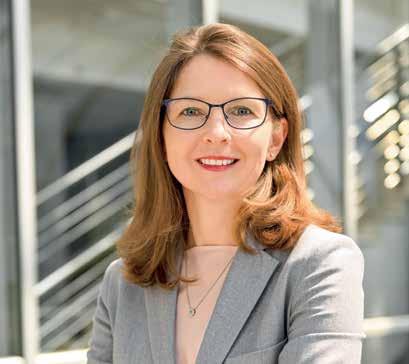
Both foreign investors and domestic companies must harmonise their processes, products and services with international standards and criteria, which is why our interlocutor expects demand for his company’s services to increase.

How does the growth of foreign investments and the inclusion of Serbian manufacturers in large supply chains impact demand for testing, inspection and certification services?
As a global leader, SGS develops and validates its own methods continuously, utilising resources and knowledge at the global level. In this sense, in order to survive on an increasingly challenging market, foreign investors, but also the most successful Serbian companies, must harmonise their processes, products and services with the requirements of technical and international standards and criteria, which are demanded through relevant international certification schemes, such as IFS and BRC, or criteria required in the areas of social responsibility, such as the SA8000 Standard and the requirements of BSCI or SMETA. This is precisely why we expect demand to increase.
How can your services contribute to controlling the grey economy in the field of energy products and in other sectors in Southeast Europe?
In the world of global trade, in endeavouring to preserve transparency and trust, SGS also offers solutions that combat the grey economy, especially in the area of energy smuggling. SGS
has already spent ten years as a reliable partner of the Government of Serbia in the work of marking and monitoring petroleum derivatives in the Republic of Serbia. This refers to the first anti-corruption programme in the fight against the grey economy in Europe. The aim is for the marking of derivatives in production and when importing to ensure the successful monitoring of the legality of traffic, with the recouping of losses in revenue from unpaid customs and excise duties, as well as to prevent the adding of illegal components to petroleum derivatives
with the aim of improving the protection of both the environment and consumers. In the first year of implementation alone, the state generated income of 139 million euros in additional taxes, with more than 1.5 billion euros pouring into the state coffers over the subsequent decade, while the grey economy in this area fell to below 1%.
Due to the planned advancement and automation of the marking process, SGS has developed automatic marker injection devices (AMID) that have become crucial to the revolutionary transformation of marking technology and that play an important role in combating illicit trade in Serbia.
Which new services have you developed to address the need for companies to harmonise their operations with the European Green Deal?
SGS welcomed the Green Deal with readiness, given that we’ve been working since the signing of the Kyoto Protocol to develop specialist verification services for reports on emissions of greenhouse gases (GHG), as well as other services that encompass checks against international standards on environmental protection, GHG emissions, carbon footprints, as well as technical analysis services of project feasibility and environmental impact.
SGS is accredited according to ISO 14065 to conduct the verification of reports on GHG emissions for a range of local, regional and global schemes, while the company also provides inventory services for GHG emissions that are aligned with the standards of ISO 14064-1, GHG Protocol, PAS 2060 and PAS 2050. SGS assists companies in developing a verifiable carbon footprint of their organisation or product, as well as in identifying possibilities to make savings through the development of business strategies and roadmaps for reducing carbon emissions.
SGS, a global leader in control, verification, testing and certification services, has for ten years been a reliable partner of the Government of Serbia in the work of marking and monitoring petroleum derivatives in the Republic of Serbia
Due to the planned advancement and automation of the marking process, SGS has developed automatic marker injection devices (AMID)

Relying on the international experience and expertise of the parent Intesa Sanpaolo Group, Banca Intesa pays special attention to continuously monitoring trends, improving existing products and services, and introducing new ones, as well as advanced practices on the domestic market.
One of the latest examples is the launch of Confirming, a new digital factoring platform developed by Intesa Sanpaolo. This new platform, which is a unique solution for financing international supply chains, enables suppliers (exporters) that operate in Italy, Romania, Hungary, Slovakia, Slovenia, Albania and Serbia to connect online and sell receivables to buyers located in the aforementioned countries without recourse basis. The system will soon expand to include Croatia and Bosnia-Hercegovina. These countries, which operate within Intesa Sanpaolo’s International Subsidiary Banks Division (ISBD), are launching the platform after Italy, where this system already operates successfully, with over 3,000 active companies.
The digital Confirming platform optimises liquidity management for buyers and ensures fast payments to suppliers, which reduces delay-related costs for both parties while eliminating the risk of non-payment. At the same time, the bank becomes a partner in the supply chain, which raises the level of trust for both buyers and suppliers.
“By introducing the Confirming platform on the Serbian market, Banca Intesa offers its exporter clients the possibility to digitally sell international receivables from foreign customers quickly, efficiently and without the need to sign additional documentation, enjoying the benefits of faster cash flows and obtaining financing without additional obligations to the bank. On the other hand, importer clients will be able to sell receivables without the right to recourse to their foreign
suppliers, achieve more favourable terms for procurements, and potentially expand the scope of cooperation with their partners. During this time of huge pressure on global supply chains, we are enhancing regional cooperation between buyers and suppliers, supporting the export-import oriented businesses that have the capacity to help increase economic activity
in our country,” says Predrag Milenović, Head of Corporate Division and an Executive Board Member at Banca Intesa .
“We are committed to supporting our clients’ development, providing them with access to new business opportunities on the markets of central and southeast Europe where we operate,” says Giuseppe Ferraro, Head of the Corporate and SME Department C&SEE – ISBD. “In line with the new dimension of international business, Confirming enables unobstructed transactions and improves the role of international supply chains in which both large and small businesses play crucial roles in supporting the economy.”
Thanks to the introduction of the Confirming platform on additional markets, Banca Intesa is becoming an important partner in the interregional commercial value chain, which will bring direct benefits to all Banca Intesa clients.
The digital Confirming platform optimises liquidity management for buyers and ensures fast payments to suppliers, which reduces delay-related costs for both parties while eliminating the risk of non-payment

Behind the unusual name of this newly founded firm – SOG in cooperation with Kinstellar – stands a new brand on the market of legal services. This is one of the largest regional law firms in terms of the number of offices, clients, employees and revenue
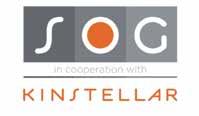
spectives and the building of a new business culture?
We expect the integration to lead to us working on significantly more complex, high-profile, cross-border transactions, and to us positioning ourselves as one of the key law firms dealing with commercial law in Serbia.
The new firm faces a challenging period in which it will combine the strengths and legal talent of both sides I order to strengthen its teams and deepen its expertise in key areas of law. And here Milan Samardžić, one of its partners and founders, reveals just how they will achieve all this.
The firm at which you are a partner and founder represents something special and unique on the legal services market. Could you tell us more about it?
Kinstellar is a legal services market leader in Central and Southeast Europe, with offices in 11 dominions and a team of more than 400 lawyers. Apart from Serbia, SOG in cooperation with Kinstellar will focus primarily on the wider area of the former Yugoslavia. However, in joining forces with Kinstellar, we will have the possibility to provide services to clients across the entire CEE region from Belgrade. Kinstellar was created by separating the offices of Linklaters from the CEE region and uniting them in a fully integrated office under a new brand.
Kinstellar’s business strategy is to provide international clients in these less economically developed countries with legal services of a uniform quality, at a level that’s comparable to that of the best international law offices around the world. Clients can thereby count

on receiving top quality legal services in every jurisdiction where they work with Kinstellar, and on being able to communicate exclusively with a lawyer with whom they’ve already established a relationship in their country of origin, and who will then internally organise the servicing of the client in all jurisdictions required.
Could the bringing together of the two firms’ legal experts result in a deeper understanding of market per-
Kinstellar invests significant resources in specialised training and development for employees at all levels, and in so doing strives always to attract top professionals. Kinstellar also has an active associate exchange programme between its offices, which brings new experiences to lawyers and deepens their international perspective. We believe this will help us entice the most talented young people to join our team.
This merger makes you the largest integrated law firm in the region. What do the numbers say?
Kinstellar has been present in Serbia since 2010, via cooperation with the Joint Law Office Marić, which has joined forces with SOG in its full composition. SOG in cooperation with Kinstellar has formed a team of 45 people and become equivalent in terms of strength to Kinstellar’s large offices in Budapest, Sofia and Bucharest. We will work on the synergy of these four offices – together with the Žurić and Partners law firm from Croatia –taking a dominant role on the legal services market in the region of Southeast Europe. Although firms often join forces to form regional networks, Kinstellar differs in this sense in the fact that we really operate as a single team, and we consider that this gives us a huge comparative advantage over the competition.
We expect to position ourselves as one of the key law firms dealing with commercial law in Serbia
The merging of two firms with very similar business cultures led to the multiplying of what SOG had at the local level and what Kinstellar had globally. This synergy proves, among other things, that legal affairs are becoming more interconnected than ever before
From its Belgrade base, newly established law firm SOG in cooperation with Kinstellar covers Central and Southeast Europe, and Central and Southeast Asia, and does so directly, through associates at Kinstellar. Clients from Serbia will also be able to count on their legal services needs being covered worldwide.

Will the integrating of your two firms benefit all participants in the process?
Kinstellar has long been present on the local market, but with a primary focus on working for clients referred to them from Kinstellar’s network and the over 250 international law firms with which Kinstellar cooperates globally. On the other hand, SOG has always been oriented towards working with foreign law firms, while it has also nurtured a strong local presence. Their integration is expected to bring synergy and a result that is greater than the simple sum of their parts. We are thus working to ensure that the merger results in 2+2 equalling 5. We will work around the clock on the combination of our business cultures bringing all our associates and clients a unique, high-quality experience on our market.
striving to maintain their service quality level. In this specific case, SOG is mostly profiled as providing services in five traditional areas of law: corporate law and M&A, labour law, real estate law, dispute resolution, and banking & finance. Alongside these five areas, SOG has worked extremely hard over the past five years in an effort to strengthen its expertise in the fields of personal data protection and competition law. Integration with Kinstellar will contribute to improving expertise in all of the aforementioned areas, but will also bring a greater focus on sectors in the business world. The lawyers of our integrated office will thereby strive primarily to develop an understanding of the sector in which the client operates, and only then to provide a service in the legal area requested.
Will you now be able to more quickly and easily provide services to clients throughout Southeast Europe, directly from your Belgrade offices?
the
be considered as proof of your tenacity and excellence throughout the years, and of the view that legal affairs are becoming
The integration trend on the global market of legal services has been extremely pronounced over the last decade. Some of the world’s largest law firms are even merging with their previous competitors. For smaller firms, inte-
gration equates to stability, while larger firms have to keep pace with the expansion of their clients’ operations and growth tendencies among the competition. Law firms compete in terms of the number of new services they will provide clients, while at the same time
Even prior to the integration with Kinstellar, SOG had a one-point-of-contact policy. This meant that the Belgrade office was sufficient for the client to do business across the entire region of the former Yugoslavia, as we had a strong network of associates. That business case remains the same for us, only it is now much stronger. It is important to note that Kinstellar maintains relations with over 250 law firms around the world, which means that our clients in Serbia will also be able to rely on their legal service needs being covered worldwide. When it comes to cross-border transactions, we expect the upward trend to continue and far greater representation in our portfolio.
For smaller firms, integration equates to stability, while larger firms have to keep pace with the expansion of their clients’ operations and growth tendencies among the competition
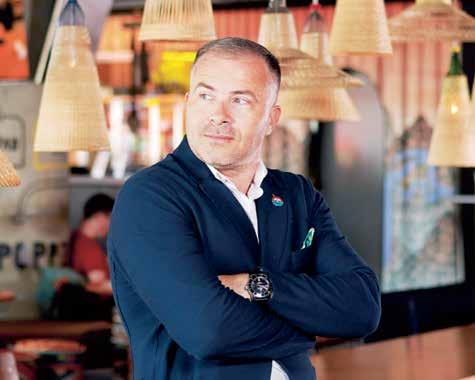
Mama Shelter is recording growth in guest numbers year on year, thanks to its unique interiors, top selection of delicious food and various drinks, but also thanks to staff who love their job

Thanks to family-like relations that date back to the founders, the Trigano family, Mama Shelter has a fantastic team that makes magic every day and represents the renowned group to which this hotel belongs in the best possible way.
How much has the Serbian tourism sector changed since Mama Shelter first appeared on this market and what implications does that have on your positioning?
The tourism sector has changed for the better a lot, and there is still room for improvement. In a way, we also deserve an award for that, because we fought for the city to have a better and higher quality tourist offer. Looking only at the number of direct flights from Belgrade today compared to 2018, it is clear how much we have advanced as a destination. And that’s not forgetting that we also had a pandemic during this period, which – at least for Mama Shelter – meant coming up with a more creative, concrete and diverse offer with enhanced possibility to adapt to changes.
It’s long been suggested that Belgrade could become a centre of congress
tourism. How noticeable is such a trend in the structure of your guests?

We are certainly still considered a business destination, so congress tourism suits
the Mama
concept very well. With due respect to all other capital cities in the region, Belgrade is still the leader and the centre of all events. In this regard, I believe
that Belgrade is already a centre of congress tourism.
The pandemic caused an increase in the number of people working remotely or wanting a workplace environment that’s closer to a home than a regular office. What can Mama Shelter offer such a clientele?
We were a favourite spot for lovers of co-working spaces even before the outbreak of the pandemic, precisely because of that laidback atmosphere and the feeling of working from home. On the other hand, there is also our large selection of delicious and varied food and drinks. I think that’s also the case with our conference rooms, which is why many
companies hold workshops at our hotel, and why they frequently make the comment that people are more productive and don’t feel like they’ve spent a workday somewhere.
We should also note that Mama Shelter is a brand in the Accor Group portfolio. It is an honour and a privilege to be part of the Accor



Group, but also an obligation to be a proper representative of such a renowned hotel group, while of course always remaining faithful to the Mama Shelter style.
Many are complaining about workforce shortages, while you always boast of the dedicated team behind the magic of Mama Shelter. What’s your secret?
The secret, and it isn’t a platitude, is the family-like relationship that dates back to the founders, the Trigano family. That permeates through my management team, and me personally, to every employee. We try to ensure that every employee at Mama Shelter feels as though the hotel is, first and foremost, like their own home.
Many companies hold workshops at our hotel, and comment that people are more productive and don’t feel like they’ve spent a workday somewhere
that serves to accentuate the importance of our first goal: sustainability and durability.
The Trace Code of Conduct prioritises professionalism and vision, to ensure that the work we do remains for the generations to follow. The financial result serves in the function of the first objective, and not the other way around ~ says Stoyko Ivanov Meshkov, CEO of Trace Group Hold PLC Belgrade Branch, which is engaged in a large number of highway construction projects in Serbia, as well as railway reconstruction and modernisation works across the country.

What distinguishes Trace from its competitors the most, in the opinion of our interlocutor, is perhaps the desire to change and advance not only at the level of the company, but also at the national and international level. “The company and management team, headed by Professor Nikolay Mihaylov, have spent many years working on the development of the construction environment across the region. For us, construction is not just a business, but rather a mission, and part of that mission is shaping the Western Balkans as an important geopolitical region,” says Meshkov.
The Trace Group invests continuously in young experts by offering them positions that enable their professional development, as well as the opportunity to feel as though they are part of a company with a tradition and a strong company culture.

Sustainability, diversification and growth are key words that define our development path over the course of the next decade. Development
that’s evolutionary, as opposed to revolutionary, is one of the fundamental models of our journey to sustainability.
We ensure our growth by expanding the scope of our activities, which are already established in our portfolio, with an emphasis on the digitalisation of construction processes.
The desire for diversification is linked to our positioning on another market beyond those of Bulgaria, Serbia and Romania, which the Holding management team is already working on implementing. Experience shows that this is a process
In which areas does your expertise find its most effective applications when it comes to Serbia?
Our comprehensive experience in the construction sector makes us unique when it comes to specific projects that combine different infrastructure elements, for example, a metro and railway, the construction of residential and commercial properties with deep underground levels and a ground floor setup that includes accompanying infrastructure etc.
In the area of railway infrastructure, Trace designs and implements key projects for the Republic of Bulgaria, while in 2020 it signed the Agreement on the Modernisation and Rehabilitation of Railway Tracks in the Republic of Serbia. Trace has been participating from the outset in the Sofia Metro, which represents the most successful infrastructure project in Bulgaria. Trace’s own designers, engineers and construction teams have successfully constructed 11 metro stations, including some that had complex geological and hydrological conditions, and one that passes under the active tunnels of Line 1. Our colleagues are currently building the Trakija metro station, which forms part of Sofia Metro Line 3.
In terms of future works, what area are you interested in developing?
The implementation and use of artificial intelligence in construction. AI can do anything that crosses your mind, but it lacks intuition and emotion. In corporate governance and managerial actions, leaders very often make decisions by paying attention to their intuition or listening to their heart. The challenge for us is to understand how these two forms will fit together.
For us, construction is not just a business, but rather a mission, and part of that mission is shaping the Western Balkans as an important geopolitical regionSTOYKO IVANOV MESHKOV, CEO, TRACE GROUP HOLD PLC BELGRADE BRANCH
We ensure our growth by expanding the scope of our activities, which are already established in our portfolio, with an emphasis on the digitalisation of construction processes

The EBRD expects Serbia’s GDP to increase by around two per cent this year and 3.5 per cent in 2024. A much faster growth rate of around six per cent would be needed in order to achieve convergence with EU income levels within two to three decades, which is an ambition that this region should have
Achieving growth rates of six per cent or more in Serbia is not out of reach, but would require a substantial pick up in productivity, particularly through the boosting of private sector investment in innovation and digitalisation –says Matteo Colangeli, EBRD Director for Western Balkans.
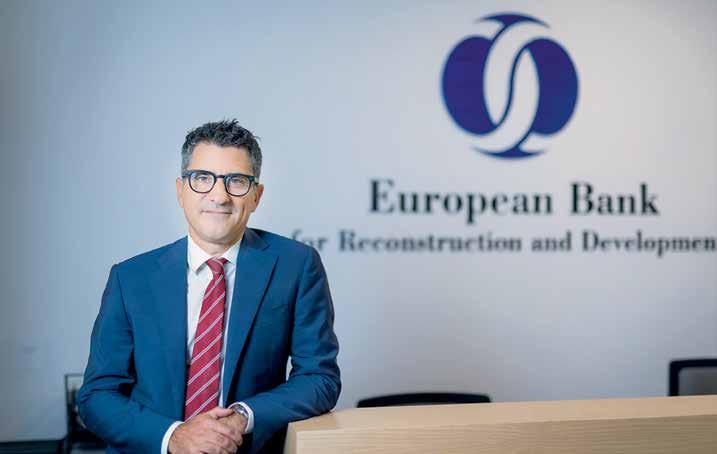
“We see a substantial upside in unlocking the growth potential of Serbia’s SMEs, helping them to integrate into global value chains and capitalise on the opportunities brought by foreign direct investment. Continuing to reform state-owned enterprises could also contribute to accelerating growth, leading to the more efficient provision of public
services and freeing up resources to accelerate Serbia’s public investment programme, particularly when it comes to the main European rail and road corridors,” notes Colangeli.
Finally, but importantly, he adds, the green transition is a key cross cutting theme that requires an urgent focus, particularly in view of the impact that the EU’s carbon border adjustment mechanism could have on Serbia’s competitiveness.
The beginning of this year brought positive news about foreign direct investment (FDI) inflows. However, how
Investments in the road and rail network were a key enabler of the country’s success in attracting foreign direct investment over recent years
We believe that Serbia took a courageous step with the adoption of the Strategy for State Ownership and Management of Business Entities Owned by the Republic of Serbia
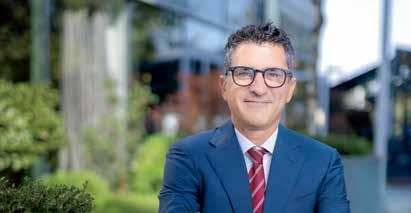
do you assess the potential shortage of labour for economic activities in Serbia? What are the key challenges that need to be addressed?
Indeed, FDI flows to Serbia have been strong over the past five years, at around 7-8 per cent of GDP annually. Looking ahead, it is important to attract investments in higher value-added activities that are less sensitive to labour and energy costs. We have financed a few good examples in recent years and believe that Serbia remains well placed to continue to be a success story in attracting high-quality FDI.
When it comes to the labour market, boosting youth and female employment would help ease the pressure on the workforce supply side, as would a systemic approach to attracting foreign workers where needed. But the ultimate goal should be to stem the brain drain and reverse the outflow of talented young Serbs from the country. A focus on creating economic opportunity is paramount for that, including beyond the Belgrade/Novi Sad area. For this, continuing to upgrade domestic transport infrastructure will be important, as will creating favourable conditions to attract investments to less developed areas of the country. However, dealing with the reasons behind emigration is a much broader topic that is ultimately linked to expectations about living standards in the country, especially when it comes to health, education and a clean environment.
Recent events have prompted us to contemplate Serbia’s energy dependence and the significance of a stable energy system for business and investment activities.
How would you evaluate recent developments in this sector, and what steps need to be taken to ensure sustainability and efficiency in the energy sector?
The energy crisis prompted governments to take emergency action to ensure the security and affordability of supplies. In parallel, national energy strategies and policies are developing around the transition from fossil fuels to clean energy, improved energy efficiency in industry, buildings and transport, and more energy storage. Considering that renewables have a low marginal cost, are abundant, inexhaustible and domestic, it is not surprising that they are seeing an extraordinary new phase of fast growth.
Serbia is no exception to this global trend. We are pleased with the support that we are providing to the Ministry of Mining and Energy for the country’s first renewable energy auction, which was recently conducted. We are confident that this will deliver cost-effective power to Serbian consumers, fostering investment and private sector participation, energy
We are pleased with the support that we provided for the Belgrade airport PPP, and we see potential for our further engagement, such as in the field of river ports
mix diversification and a subsequent reduced reliance on imported fossil fuels. And the ongoing auction is only the first round of a three-year plan that envisages the total allocation of 1,000 MW for wind power generation capacity and 300 MW for solar PV. We are fully committed to continue supporting this process, including by providing financing for investors that will be awarded capacities under the auctions, as well as to upgrade Serbia’s power transmission and distribution networks so that they can absorb the increased volume of intermittent solar and wind generation. The other key aspect of energy transition is reducing energy waste. We are going to significantly scale up our activities in this area, from direct financing of larger corporations to credit lines channelled through commercial banks for MSMEs, to accelerating the renovation of public and private buildings.
Where do your concerns lie and in what ways does the EBRD provide the most significant support to Serbia in continuing reforms in the sector of state-owned enterprises?
The improvement of corporate governance and the commercialisation of state-owned enterprises promotes and sustains market economies, but should also benefit state enterprises themselves, through improved competitiveness and greater efficiency. This, in turn, has benefits for society as a whole, through an improved level of the quality of public services and a reduced reliance on the state budget. All of this requires a clear definition of objectives for public enterprises by the state, as well as careful monitoring of whether and how those objectives are delivered, and this is where the greatest challenge lies.
We believe that Serbia took a courageous step with the adoption of the Strategy for State Ownership and the Mana-
The green transition is a critical overarching theme that demands immediate attention, especially when considering the potential consequences for Serbia’s competitiveness as a result of the European Union’s carbon border adjustment mechanism
gement of Business Entities Owned by the Republic of Serbia for the period from 2021 to 2027, which the EBRD helped to develop and which sets the ambitious vision that inspired the new law on public enterprises. In addition, the EBRD is providing further support through corporate governance and corporate development activities linked to EBRD loans to Serbian public enterprises. For example, Srbija Voz [national passenger railway company] has already benefitted from a corporate governance improvement programme developed and implemented with EBRD assistance, while similar programmes are to be implemented for Serbia Cargo and Serbian Railways Infrastructure later this year. The EBRD is also supporting EPS [national electric utility power company] through a corporate development programme, which will include activities aimed at enhancing risk management, procurement and energy trading functions, among others. We also stand ready to assist the authorities in further defining governance standards through secondary regulation, all under the active role of the Ministry of Economy, which is supposed to become a central ownership entity that will coordinate with other ministries and agencies as and when needed.
Despite the delays in the EU accession process, significant progress has been made in establishing strong connections between the EU and Serbia in the transportation infrastructure domain. What would you emphasise as the most crucial steps that Serbia has taken with EBRD support?
Serbia is investing heavily in its road and rail network and I believe this has been a key enabler of the country’s success in attracting FDI in recent years. Beyond increasing connectivity with the EU and other countries of the Western Balkans, I believe these investments are also crucial for regional economic development and reducing the rationale for internal migration to the capital. When it comes to the EBRD, transport infrastructure is a core priority and represents a large share of our portfolio in Serbia. In the rail sector, we last year signed a €550 million financing programme for the modernisation and upgrade of the ca. 230 km-long electrified railway infrastructure section between Belgrade and Niš. This Project is a strategic priority for Serbia, as it forms part of the main rail transport corridor running through the country and is supported by the largest EU grant that the country has ever received. We, at the EBRD, are also committed to enabling public-private partnerships for the delivery of infrastructure, mobilising private capital and knowhow through competitive processes. We are pleased with the support that we provided for the Belgrade airport PPP, and we believe there are opportunities to do more, for example in the field of river ports.
Returning to the initial question that sparked our discussion, regarding economic growth, to what extent has
Serbia made progress in building a knowledge-based economy? To what extent are investments in innovation infrastructure helping on the retention of talent and entrepreneurship in Serbia?
Serbia has progressed well in certain areas of the knowledge-based economy, increasing its exports of ICT services more than elevenfold between 2010 and 2022. Serbia’s ICT exports now exceed those of Estonia, which is one of the forerunners of digital services in Europe. This was helped by increasing global demand for digital services, relatively low labour costs and increasing interest in ICT education in the Western Balkans. However, the region’s wage competitiveness is decreasing rapidly and the future pool of experts may be constrained by demographic trends, especially as a higher share of those with more advanced digital skills are more likely to emigrate. Investments in education, research and business facilities are an important step in making the ICT boom sustainable. That is why the EBRD is financing the expansion of existing science and technology parks, and the development of new ones, in Niš, Čačak and Kruševac, as well as the Bio4 campus in Belgrade. We believe this infrastructure will support the incubation and growth of innovative start-ups and businesses in Serbia. Equally important will be the rural broadband project, also EBRD financed, which will roll out high-speed internet to smaller communities across the country. Beyond infrastructure, we will also continue our SME advisory programme, supporting local enterprises to acquire the skills needed to succeed in the digital economy and integrate into international value chains.
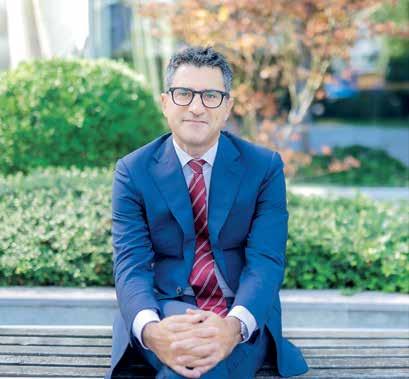
The ultimate goal for Serbia should be to stem the brain drain and reverse the outflow of talented young Serbs from the country

The biggest logistics park in Serbia, covering 135,000m², is currently being completed in New Belgrade, while an additional five construction sites will add another 144,000m² to this developer’s Serbian portfolio
order for us to guarantee that it satisfies the CTP gold standard.
Our parks are in prime locations and provide complete support, so our clients can devote themselves fully to their core business ~ explains Mr Kovačević, noting that every CTP building in Serbia is characterised as green, energy efficient and BREEAM certified.

You launched the construction of CTPark Belgrade City at the New Belgrade-Kvantaš location late last year. How are works advancing and how much have you progressed when it comes to leasing?
Our team on the ground, together with our works contractors, are really doing a wonderful job. We are extremely satisfied that everything is unfolding according to the plan and defined dynamics. The uniqueness of this project is represented principally by its prime location, close to both the city centre and the airport, and the fact that it will be the largest logistics centre in Serbia upon completion. Our clients have also recognised this location’s potential, and we can thus boast of having already leased out almost 80% of the space. We expect the park to achieve full occupant capacity by the end of construction, by December.
You often emphasise that you never deviate from the “CTP gold standard”. What does this notion symbolise?
When CTP builds, it builds for itself, which means that when we build something, we
build it according to the highest standards of quality so we can ensure it lasts. We don’t construct mere buildings, but rather sustainable business ecosystems of the future, which is why our buildings have an average lifespan of 40 years. Everything that we deliver is implemented and controlled by our team in
A whopping 80% of your new business comes from the existing network of tenants. What makes you such a good and desirable partner?
Our network of 1,000+ tenants has a retention rate of 92%, while 80% of our new business comes from our existing network of tenants. This means that, as they grow, we also grow. And they choose to grow with us because we are recognised as a partner that is fully committed to the needs of clients. Considering that our parks occupy prime locations and provide tenants with complete support – with a team of property managers on site, organised common areas, 24/7 security – our clients can devote themselves fully to their core business.
Do your existing capacities satisfy current demand or do you see room and opportunities for further expansion?
Apart from CTPark Belgrade City, we have active construction sites at five other locations with which we’re adding another 144,000m² to our portfolio. A good part of that area has been agreed for lease in advance, while we build a certain part of the space in locations where we see great potential, without an identified client. The reason for this kind of development strategy is reflected in the fact that we always want to be ready to handle requests from logistics companies and to have the possibility to offer them different locations. I would say that we’ve assessed the current demand well and that we’re continuing further development at both current and future locations.
Our network of 1,000+ tenants has a retention rate of 92%, while 80% of our new business comes from our existing network of tenants
G4S Serbia is usually associated with physical security and Cash in Transit services, but engineering and technology also define a big part of its business and products
The aim of G4S Serbia is to provide products that will enable its customers to gain a competitive edge, and the company’s ambition is to become a fully customer centric organisation.
G4S Serbia’s aim is to provide products that will enable our customers to gain a competitive edge. In cash management, this role will be played by our newly launched Cash360 product, with which G4S covers E2E cash cycle with Deposit Machine, Transport, Processing and Insurance. All of those physical operations are covered by a digital layer with the state-of-the-art technology that allows all involved stakeholders to be connected in real time and with an instant account balance. This solution is very new to the Serbian market and the company believes that it will change the landscape of how big retailers and banks work together.
The benefits of Cash360 include:
* Streamlining processes to reduce cash management costs;
* Tracking cash flow management effectively;
* Minimising accounting errors;
* Optimising a client’s cash cycle;
* Accelerating bank account deposits;
* Saving time by eliminating multiple cash reconciliations;
* Enhancing security against theft;
* Freeing up clients’ staff to focus on other tasks.
“Overall, this product will reduce the costs clients have to pay to operate and increase the general security of their operations. That’s why we are very excited about the future of
Cash360 in Serbia,” says G4S Serbia MD Dawid Sold.
“For the last year, our Serbian team of engineers has been working on the practical adoption of Artificial Intelligence in the electronic security industry on the local market. We are very proud that Serbia is a
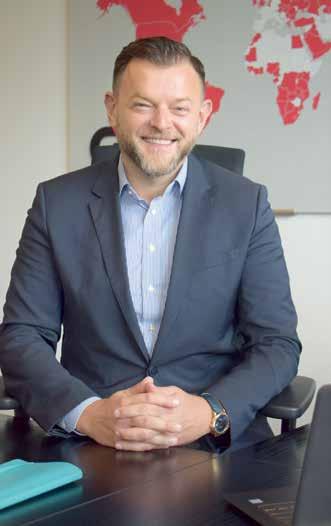
As much as AI creates vast business opportunities, it also presents risks and concerns over privacy
global leader in applying these solutions in a real-life environment. On one hand, AI-powered security systems can enhance the accuracy and speed of threat detection and response, making it easier to prevent and address security breaches.
“This is done by an AI engine analysing human behaviour for predefined situations that could indicate someone breaking the law or violating house rules. This could, for example, include trespassing, shouting, loitering, breaking glass or otherwise tampering with an ATM shutter. This helps in proactive security measures and enables faster and remote security responses to a threat. Another revolutionary element of this solution is that the system can provide analysis of commercial data, such as customer heat maps, merchandising effectiveness or time to serve a customer. This effectively changes traditional security as a cost factor into a value creator to the commercial and marketing departments of our customers!
“As much as AI creates vast business opportunities, it also presents risks and concerns over privacy.
Groundbreaking technology and the use of AI enables us to provide very high privacy standards. This is revolutionary from the perspective of the fact that we have cameras looking and AI actively analysing the threats, while at the same time there is no video streaming or recording until a threat situation has been detected and a security response needs to be applied. This technology allows us to effectively increase and tighten privacy standards compared to traditional CCTV. Our product has already been recognised by one of our VIP customers, with the first commercial application in Serbia. We are very proud that our team is elevating Serbia to the top of the global innovation game.
“The EU’s Corporate Sustainability Reporting Directive (CSRD) is a significant development for companies in Serbia, because it requires them to disclose more information about their sustainability practices and im-
pacts. This could include information on their environmental, social, and governance (ESG) performance. One of the most important and challenging topics for organisations in Serbia will be reporting on the entire value chain of company supply chains. It has been a common trend for companies to outsource labour-intensive and non-core operations to external partners - and security is one of those examples. There is nothing wrong with it. However, it requires strong governance that allows transparency and sustainability objectives to be part of the procurement process. This is still a big challenge in Serbia and G4S wants to engage with local and international business associations in identifying areas – with a special focus on sourcing labour heavy services – where they can improve their sustainability practices and ultimately contribute to a more successful future for Serbia. Compliance is a very important part of the G4S offer and we want to promote it as an investment and business opportunity, rather than a cost.

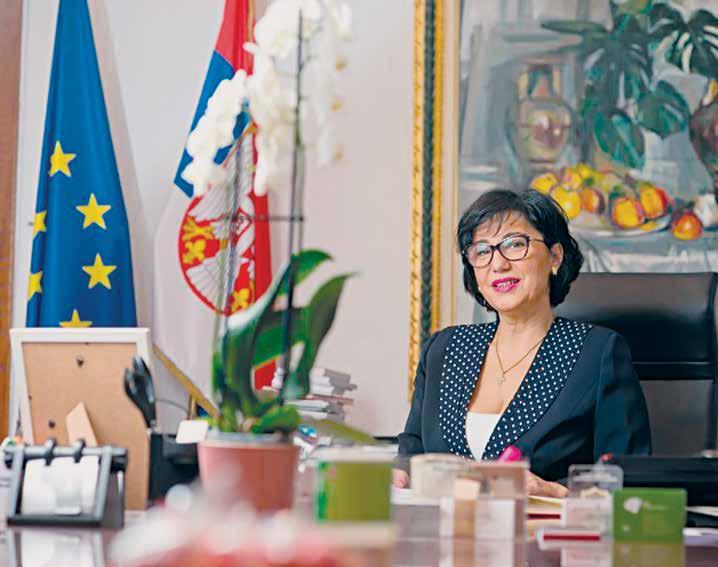
The Tax Administration confirms, with all of its activities, that is plays one of the pivotal roles in the fight against the grey economy in the Republic of Serbia. It is continuing to work on its own transformation, while it will soon launch the implementation of a new business model that will be supported by a unique, integrated information system
one of the main steps taken on the road to reform was the introduction and implementation of the new electronic fiscalissation model
The Tax Administration will also continue with digitalisation in the future, which is a prerequisite for automating tax processes
Combating the grey economy represents one of the priorities of the work of the Tax Administration of Serbia. Activities have been conducted continuously via the increased work of inspection services since 2014, but also with the aim of strengthening and raising awareness of the harmful consequences of the grey economy among citizens and businesses, through educational media campaigns, such as the campaign “Porez plati da ti se dobrim vrati” [Pay taxes to get good returns], and through the “Tax Class” fiscal education for young people, as well as through a series of meetings with expert associations. Prize draws have also been organised multiple times. Furthermore, the activities of the Tax Police Sector are directed towards the early detection of so-called “laundering” and “phantom” enterprises that help companies avoid paying public revenues. When it comes to the illicit trade in excise goods, a total of 175 criminal charges were filed and 89 of these enterprises were identified in the first part of 2023 alone.
According to research conducted by NALED, the participation of the grey economy fell by three percentage points in the period from 2017 to 2021, down to 11.7%.
How satisfying is this result?
“We have many reasons to be satisfied,” says Tax Administration of Serbia Director Dragana Marković. “A significant part of these results can certainly be attributed to the successful reform, which has been conducted intensively since 2015, when the first Transformation Programme was adopted, containing a set of measures for effectively combating the grey economy. Much has been done and the results are becoming increasingly visible. The system for filing tax returns electronically has simplified the process of fulfilling tax obligations for taxpayers. Risk analysis has been improved and enables the applying of a large number of criteria for risk assessments of each taxpayer. We completed the specialisation of tax inspectors in accordance with their specialist expertise and competencies. Furthermore, one of the main steps taken on the road to reform was the introduction and implementation of the new electronic fiscalissation model.
Thanks to all of the aforementioned, we’ve had a constant trend of increasing collections since 2015, which is best evidenced through the fact that the coefficient of realised tax collections for the second quarter of 2023 is 217.5% compared to the same period of 2014. Furthermore, more
We recognise and provide assistance to taxpayers in more easily complying with tax regulations under altered business conditions
We have demonstrated our worth in responding to the many challenges of these tumultuous times, confirming with our professionalism that all our capacities are at the disposal of the state
than eight billion dinars of newly discovered revenue was calculated during the same period of 2023, which is up 11 per cent on the corresponding period of 2022.
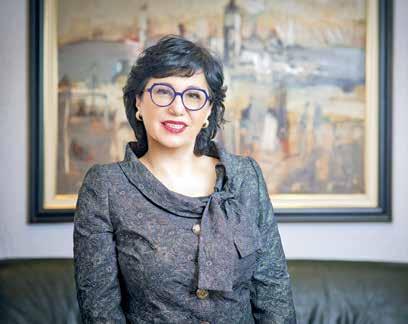
What effects does eFiscalisation have when it comes to supressing the grey economy and how much has it helped to improve the efficiency of the Tax Administration?
Through the new fiscalisation model, the Tax Administration has received a contemporary and powerful tool in the fight against the grey economy, which provides possibilities to identify taxpayers who don’t want to comply with regulations in the area of recording turnover through fiscal devices. With the development of the Advanced Analytical Platform in the Fiscalisation Management System, it has been ensured that controls are “targeted”, that the work of the Tax Administration is even more efficient and that results are more advanced.
A total of 175 criminal charges for illicit trade in excise goods were filed in the first part of 2023
The new programme for combating the grey economy implies solutions that will fortify the capacities of inspections, courts and the Tax Administration, as well as supporting responsible businesses. What kind of results have so far been yielded by cooperation between the Tax Administration and other parts of the administration and judicial system?
The successful fight against the grey economy, in accordance with the Action Plan of the Government of the Republic of Serbia’s Programme for Combating the Grey Economy 2022-2025, is the result of simultaneous action and mutual cooperation among the institutions of the system. The results of this work are evident in all segments of the work of the Tax Administration, from collections and control, to the tax police, which in the first half of 2023 – in cooperation with other state bodies – seized 12.5 tons of leaf tobacco, 4.9 tons of cut tobacco, 99,289 packs of cigarettes, 63,146 handmade cigarettes, 5 kg of flavoured shisha tobacco, 31,359 litres of oil and petroleum derivatives, 2,122.80 litres of alcoholic beverages and 154.90 kg of coffee.

Many experts still emphasise an unfavourable age structure and unfilled job posts as a major problem for the Tax Administration. To what extent have you succeeded in strengthening your personnel structure over the previous period?
This is a complex question and providing a comprehensive answer would require slightly more space. The Tax Administration exerts efforts and utilises all available resources to attract more candidates and strengthen its personnel capacity. To this end, we are continuously announcing public hiring calls for new staff and undertaking activities, such as media promotions of hiring calls, the publishing of information about advertised public hiring calls on social media and participation in the “My First Salary” programme of the National Employment Service for the expert training of staff for independent work in the profession.
Tax evasion often increases in times of economic slowdown like we are experiencing today. To what extent are you feeling the effects of the current relatively unfavourable economic situation?
Periods of crisis in society wonderfully illustrate the complexity of the Tax Administration’s position. It is necessary to ensure the collection of sufficient sums from taxes, but also to recognise and assist taxpayers who want to comply with tax regulations, but are unable to do so due to altered business conditions, to ensure that they don’t seek refuge in the sphere of the grey economy. We have nonetheless demonstrated our worth even in such times, first and foremost in the field of public revenue collection, confirming with our professionalism that all our capacities are at the disposal of the state.
As of this year, for the first time, taxpayers were offered tax returns for their annual personal income tax that were completed in advance, which is an example of the best international practice in that field
The Tax Administration has come to represent one of the symbols of accelerated digitalisation and the introduction of modern electronic solutions. What awaits us on this front in the future?
At this juncture, the Tax Administration finds itself in the process of realising the strategic goals of transformation. Procedures are underway in the process of procuring a unique, integrated information system that will support the implementation of the new business model. Likewise, we are continuing to introduce modern digital operations and implement the goal of ensuring all business with the Tax Administration is conducted electronically. As such, as of this year, for the first time, taxpayers were offered tax returns for their annual personal income tax that were completed in advance. The Tax Administration will also continue with digitalisation in the future, which is a prerequisite for automating tax processes and will contribute to achieving the end goal of creating a modern and efficient institution that provides, at all times, a digital service that’s tailored to the taxpayer.
We are extremely satisfied that, from 2017 to 2021 the participation of the grey economy was reduced to 11.7%
ACB Ltd. Company for intermediation in insurance, as the exclusive correspondent of Aon in Serbia, is back in FIC, where we were an active member and provided our contribution to the organization’s work and activities aimed at creating a better environment for more efficient operations of the Serbian economy.
This year, strengthened by knowledge and experience, we continue what we started in the right direction.
The rich experience of 21 years of work in the Serbian insurance market, where we are successfully providing top service in the field of insurance brokerage, is recognized by over 650 of our satisfied clients.

Through many years of work, we have developed a wide range of services in all types of insurance and for almost all areas of the industry. Therefore, with the power of a large customer, we guarantee that we will ensure the best conditions and premiums for our clients from the insurer.
Our team, which consists of 20 licensed brokers with many years of experience, is specialized in providing all solutions in insurance - from assessing risks and possible perils that may threaten business, to finding the most adequate coverage that will protect the interests of our clients.
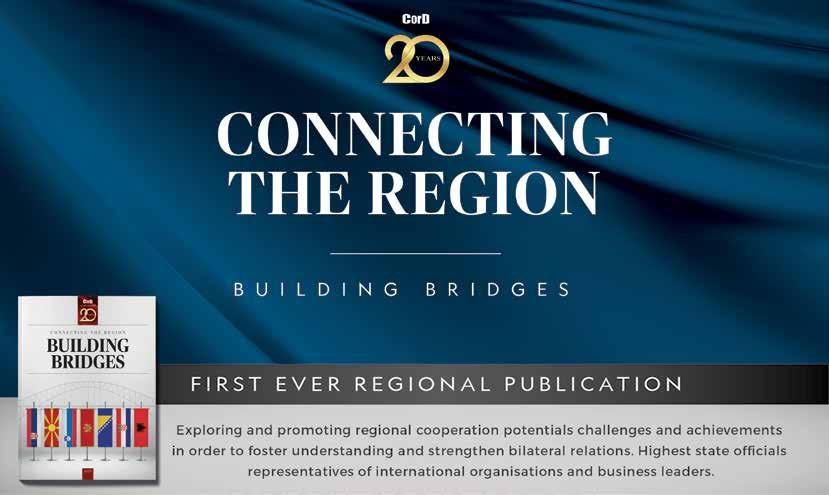
With our “tailor-made” solutions, we provide clients with significant savings in time, as well as in insurance premiums and ensure the quality of coverage during the policy period.
In addition, our experts monitor the implementation during the entire duration of the insurance contract, providing quality service and advice in case of adverse events, in order to obtain adequate and efficient indemnification from the insurance company.
Exclusive correspondent of in Serbia ANA GOVEDARICA, FIC VICE PRESIDENT AND SPOKESPERSON (ROCHE GENERAL MANAGER)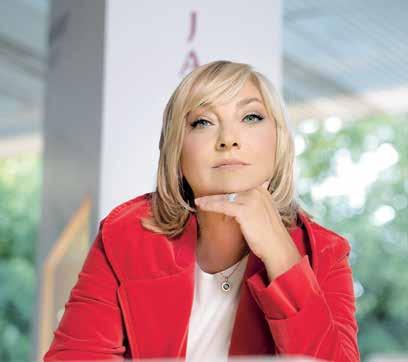
The inclusion of relevant experts and interest groups in the process of adopting legal regulations is important to overcoming the challenges posed by the implementation of new legislative solutions, as it reduces the risk of inconsistencies and conflicts
During the previous period, between the publishing of two editions of the White Book, the FIC provided a significant contribution to improving the Law on Foreigners, the Law on the Employment of Foreigners and the Law on Planning and Construction, while we also initiated – together with 12 other business associations – recommendations aimed at improving regulations in the field of renewable energy sources. Moreover, with an awareness of the importance of reporting on environmental protection, social issues and corporate governance (Environmental, Social, and Governance Reporting), we launched discussions on many issues, such as regenerative agriculture and non-financial reporting, while we also recognised the essential need to resolve the problem of waste management and many other problems ~ says Ana Govedarica, FIC vice president and spokesperson, and general manager of Roche, summarising the FIC’s work over the previous year.
What challenges most commonly emerge in practice following the acceptance of a legislative solution? In which areas do you see the greatest room to better implement existing legal solutions?
In order to overcome the challenges of implementing new legislative solutions, it is crucial to ensure effective communication and training on new laws, secure sufficient resources to implement those laws and establish a judicial system that will deal effectively with the new rules. It is likewise also important to include relevant experts and interest groups in the process of adopting legal regulations, in order to reduce the risk of inconsistencies and conflicts.
FIC members introduce modern technologies to Serbia through their work, while also encouraging innovation. How much is this work harmonised with the Serbian government’s initiatives aimed at increasing capacities for innovation in Serbia?
The Serbian government’s Digital Agenda for Serbia, for instance, is strongly supported on the part of the FIC, because improving the work of the administration in this field provides much better conditions for doing business.
Similarly, the state’s strategic shift towards prioritising the development of high-tech industries is accompanied by the launch of a large number of fruitful public-private partnership projects with which solid foundations are created for the further development and expansion of the scope of work of those industries in Serbia. The FIC will contribute to the development of Serbia’s innovation capacities through initiatives and the connecting of the domestic authorities, local entrepreneurs and scientists with the international high-tech community.
The Government of Serbia has taken significant steps recently in the area of treating patients with rare diseases by strengthening its cooperation with manufacturers of innovative medicines. How would you evaluate these steps and what’s your opinion on the next steps to be taken in this area?
The Government of Serbia has done a lot for those suffering from rare diseases, both in terms of screening and therapy. The advances are significant, but waiting lists for the approval of therapies for individual diseases still exist. We are all advocating for this to also be resolved, because postponing treatment only worsens the condition of patients’ health.
A lack of availability of innovative therapies generally is one of the problems that must be resolved systemically as soon as possible: of the total number of innovative drugs to be registered in Europe, only around eight per cent find themselves on the positive list in Serbia. That is three times worse than in Croatia, for example, and four times worse than in Bulgaria.

How would you rate your cooperation with key stakeholders in the healthcare sector, and where could the expertise of the FIC prove helpful at a juncture when Serbia is compelled to lead a prudent fiscal policy?
The quality of cooperation and communication between all stakeholders in the healthcare sector - and here I’m referring to the health authorities, doctors, patients, and representatives of the industries linked to the health system – is significantly better than it was a few years ago, but every subsequent improvement in this field will bring great benefits to the entire community, because strong synergy among all participants can only serve to improve healthcare services.
We have witnessed the social prioritising of the advancing of the healthcare system and the achieving of several serious improvements in that field. It wouldn’t be good for this momentum on advancements to be lost in the case that a more restrictive monetary policy is led. This is firstly due to the fact that current investments in healthcare are higher than previously, but are in no way sufficient, and the fact that Serbia still seriously lags behind most European countries; and secondly because – with good controls, the intelligent redistributing of health budget funds and the application of innovative solutions – every dinar invested in healthcare is returned to the community in multiple ways, and even to the state budget itself, through the many savings that subsequently follow. It is necessary for the healthcare system to be led with dedication and determination, because reforms are required, first and foremost in health insurance.
The FIC has resources to assist decision makers in creating new health policies, transferring the world’s best practices in this field when it comes to the use of the most
effective financial, organisational and technological tools that enable the improvement of healthcare with the maximum optimisation of all resources.
And how, in short, would you rate the current situation in Serbia’s healthcare system?
We saw during the Covid-19 crisis that the Serbian healthcare system proved itself to be very flexible and resilient in the face of the horrific impact and disruption caused by the pandemic. It could also be said that it returned to almost complete normality relatively quickly, which is a great success, particularly considering that the system had been “overstretched” even before the Covid-19 crisis.
It is also true that, thanks to the Covid-19 crisis, there has been an accelerating of the increasing of the capacity of the healthcare system and the use of more effective organisational and technical solutions, as well as an increase in the availability of the latest therapies.
However, Serbia’s healthcare system is now confronted by several new and pre-existing problems that must be solved urgently, such as personnel shortages, the need for much greater scope in the use of modern technologies, more advanced use of data in the healthcare system and the integration of that data, the revision and introduction of new financing models aimed at ensuring sustainability etc.
A lack of availability of innovative therapies generally is one of the problems that must be resolved systemically as soon as possibleThe FIC will contribute to developing Serbia’s innovation capacities by connecting the domestic authorities, local entrepreneurs and scientists with the international high-tech community The FIC has resources to assist decision makers in creating new health policies by transferring the world’s best practices in this field The quality of cooperation and communication between all stakeholders in the healthcare sector is significantly better than it was a few years ago DEJAN TURK, FIC VICE PRESIDENT (CEO OF A1 SRBIJA AND A1 SLOVENIJA)
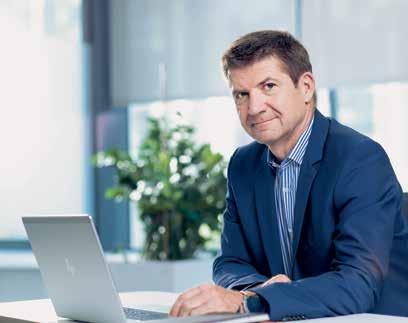
We hope that preparations for maintaining the network, as well as the actual auction for allocating the right to use 5G network radio frequency bands, will be conducted in a transparent and efficient manner and under the shortest possible timeframes. We, at A1, are committed to developing in accordance with the new spectrum and are fully prepared for the introduction of 5G technology
Serbia is highly integrated into the European market, as is confirmed by data on direct investments, Serbian exports and imports, but also by recession and expansion phases, given that the Serbian economy depends greatly on economic movements within the EU.
“That synchronicity is lacking when it comes to institutional settings in the EU,” assesses FIC vice president and A1 Srbija and A1 Slovenija CEO Dejan Turk. “An unstable neighbourhood, issues of energy stability and monetary stabilisation, and consequent changes to GDP growth factors, i.e., an increased focus on consumption and internal trade during the pandemic period, all had an impact on the level of foreign investments in Serbia reducing. Despite the recording of a recovery from the direct negative impacts of the Covid-19 crisis, the further impact of events in Ukraine on FDI remains uncertain.”
To what extent has relatively high inflation and low economic growth in Serbia and across Europe impacted on your members’ business activities and the creation of jobs?
The Serbian economy depends on economic trends in the EU. The turmoil in Ukraine brought an abrupt end to the recovery from the crisis that was caused by the global pandemic and brought new risks. Companies are confronted by rising business costs and aggravated conditions for conducting their activities – supply chains have been broken due to economic sanctions, and alongside the shortage of electricity, prices of natural gas and oil, energy and food are continuing to rise. Inflationary pressures have led to a restrictive monetary policy, while rising interest rates are reflected on all market players. The falling GDP in the eurozone, as well as the announced slowdown in economic activity in 2023, particular on Serbia’s key export markets, will have significant implications for the Serbian economy and could influence a slowdown in economic activity. As far as unemployment is concerned, it is structural and relatively impervious to inflation and GDP changes.
Serbia is among the very few European countries that have yet to introduce 5G
Which of the initiatives of the Government of Serbia in the area of telecommunications would you highlight as being the most important to further economic development and the building of a knowledge-based economy? That is undoubtedly the announcement of the auction for allocating frequencies for the 5G network, alongside joint cooperation between the state and the industry on selection of the model and period of public bidding. Operators have limited existing capacities, and in the best-case scenario we will be able to use the existing networks for three more years at the most. We hope that preparations for maintaining the network, as well as the actual auction for allocating the right to use 5G network radio frequency bands, will be conducted in a transparent and efficient manner and under the shortest possible timeframes, and with a price that will enable the unrestricted development of new technology and its swift implementation, in accordance with positive examples from surrounding countries.
A large number of FIC member companies implement environmental, social and governance (ESG) strategies as an essential element of their operations and contribution to society
We are the first telecommunications company in Serbia to have started using solar panels in our own operations
I would also single out the recent adoption of the new Rulebook on number portability for services provided on public mobile communication networks. This new rulebook represents a significant advancement of regulations governing this area, and its application will provide for the further development of the market and the effective implementation of the process of transferring numbers between the networks of operators. This is particularly welcomed by A1 Srbija, as the network that the largest number of people are switching to.
To what extent have digitalisation and the growth of the ICT sector contributed to changing the profile of foreign investors in Serbia and how are these changes reflected at the FIC?
The value of exports of the ICT sector and the creation of a surplus in exchanging ICT services has a significant impact on Serbian GDP and employment. Alongside that, digitalisation has also expanded to encompass the operations of other companies, which has caused the launch of numerous initiatives and the engaging of the Foreign Investors Council.
Digitalisation has a significant role to play in improving the business climate and the transparency of operations of all companies in Serbia and represents an unavoidable topic for all FIC committees. A few years back, it was in this precise area that the greatest progress was achieved. We are witnessing a sharp increase in electronic transactions and the broader application of contactless payments using digital “wallets”. Significant progress has been achieved in the part of the legislative framework that enables the further digitalisation of financial services. Significant developments that will have a lasting impact on the competitiveness of the Serbian economy include the qualified electronic certificate and signature in the cloud, eFiscalization, and payments made via the national Instant Payment System (IPS) using a QR code. Apart from this, the e-government system has reached a level of development that enables the swift evolution of new services that can be placed in the function of resolving pressing social problems.
How do your members contribute to strengthening the social responsibility of companies and their engagement in the community?
The pandemic and geopolitical events have compelled people to reexamine their choices regarding how they spend

An unstable neighbourhood, issues of energy stability and monetary stabilisation, and consequent changes to GDP growth factors, impacted on reducing FDI levels in Serbia
Significant developments that will have a lasting impact on the competitiveness of the Serbian economy include the qualified electronic certificate and signature in the cloud, eFiscalization, and payments via the national Instant Payment System
their time, energy and social capital. In this context, the foundations for retaining employees are represented by operational stability and a company culture that’s healthy and resilient. It isn’t only the work we do that matters today, but how that work impacts the environment, society and governance. On the trail of that positive impact, a large number of FIC member companies implement environmental, social and governance (ESG) strategies as an essential element of their operations. The telecommunications industry plays a key role in global connectivity and the digital transformation of society, so applying ESG standards has particular importance in this sector. A1 Srbija invests continuously in achieving climate neutrality by increasing the share of solar energy in the supply of its network of base stations, boosting energy efficiency in business operations and respecting circular economy principles. We are the first telecommunications company in Serbia to have started using solar panels in our own operations, while we also contribute to remedying the negative consequences of climate change through the “Niklo kao ja” [Sprouted like me] project, under the scope of which we are planting 10 rain gardens in 10 Serbian cities.

We are conscious of the fact that it is only through partnership relations and an open dialogue that is it possible to reach the required level of understanding and awareness, which are essential to make the changes that will launch our society, and particularly our economy, towards the achieving of a common goal
The Foreign Investors Council works, through numerous working groups/taskforces of the Government of Serbia, to successfully advocate changes to the Serbian economy aimed at establishing a market economy and equal conditions of doing business for all companies. We discussed the Council’s new initiatives with FIC Executive Director Aleksandar Ljubić.
Which areas are today in the focus of FIC members’ interests and what changes do you advocate for in this domain?
Thanks to the expertise of our members, as well as the fact that, throughout previous years, we’ve proven ourselves to be a reliable partner to the state when it comes to resolving key issues related to the improvement of the business and investment climate, the FIC has for many years had established institutional cooperation with the Government of the Republic of Serbia through the activities of the Working Group for the implementation of the recommendations of the White Book. It was precisely this mechanism that contributed to resolving and improving numerous issues and challenges that were confronting the business community in Serbia. The digital transformation of the Serbian economy certainly isn’t merely a matter of following trends, but rather also the needs of a society that wants to be part of contemporary economic and social trends globally. Digitalisation also remains one of our priorities in the period ahead, because there are many areas that can still be improved in terms of simplification, speed and transparency. The FIC cooperates very intensively with the Republic Geodetic Authority. We strongly support the initiative to introduce the so-called ’cadastral alarm’, which sends alerts regarding any changes immediately, in real time, to real estate owners, or anyone who has a legal interest. We were naturally very heavily engaged in the drafting of new solutions regarding the Law on Foreigners and the Law on the Employment of Foreigners. Apart from the use of digital bills of exchange for registered companies, we also advocate for its full application for private individuals. ESG
has become an imperative of global business today. In this sense, the FIC is addressing the important topic of regenerative agriculture, which is important for the entire supply chain system of local agricultural suppliers to our member companies, which – as major global players in the production of food from Serbia – supply not only Europe, but also further afield. This represents an important environmental issue, particularly bearing in mind that intensive agriculture is considered as being among the most aggressive human impacts on the natural world. Regenerative agriculture is leading the way in reshaping agricultural practices towards a more sustainable future.
You’ve organised a series of debates throughout this year that included the discussion of a large number of topics, from the development of financial services
The FIC has spent more than 20 years striving to create new partnerships through its activities
We actively represent the harmonising of regulations and support the intensifying of Serbia’s European Union accession negotiations
The White Book is the FIC’s key project… and our basic platform for dialogue with the state, but also with the broader social community and our partners
to new reporting rules for companies. How successful has this return to the live discussion format proven to be and what topics would you suggest for discussion in the period ahead?
The past year again showed us how important direct contact is for our members. The FIC Insight format, at which members present their experiences and expertise on current topics (hedging, labour law, ESG etc.) to other members and FIC partners, proved extremely successful. Apart from the aforementioned topics, the focus of the FIC in the coming period will undoubtedly be on various topics that encompass ESG and waste management, but also labour legislation, non-financial reporting, energy stability, tourism etc.
What strategic partnerships has the FIC established in order to promote shared goals?
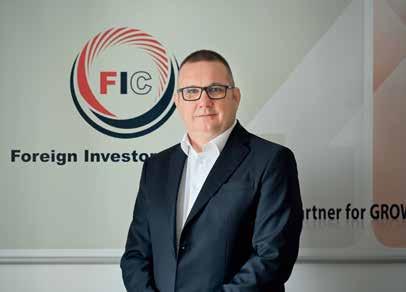
The FIC has been striving for more than 20 years to create new partnerships through its activities, but also to work continuously with our partners from the public, private and non-governmental sectors to create a predictable, competitive and sustainable business environment. Also testifying to this is the fact that our members include numerous bilateral chambers of commerce. Moreover, this year we signed a joint initiative, together with 12 business associations, aimed at improving proposed solutions in the field of renewable energy sources. We are part of the strengthening initiative to abolish VAT on food donations. We are conscious of the fact that it is only through partnership relations and an open dialogue that is it possible to reach the required level of understanding and awareness, which are essential to make the changes that will launch our society, and particularly our economy, towards the achieving of a common goal.
Serbia’s European integration process is unfolding through both harmonisation with the Aquis and through other initiatives aimed at forging connections in the field of infrastructure, the Green Deal and wider regional initiatives. How are these aspects of European integration reflected in your activities?
The FIC has been committed to European integration since the very start of its activities, and there is no dilemma over whether the path to EU membership is the one that Serbia should take, especially given how deeply integrated into the EU economy the Serbian economy already is.
Digitalisation remains one of our priorities, because digital transformation is a necessity for a society that wants to be part of contemporary economic and social trends globally
We actively represent the harmonising of regulations and support the intensifying of accession negotiations. The strong European context of our activities is also visible in the partnership relations that we have with the EU Delegation and the EU Commission, testifying to which was our partnership at the recently held EU Opportunity Week, as well as with the European Investment Bank and the European Bank for Reconstruction and Development, which are also members of our administration.
The White Book has been a veritable trademark of the FIC for two decades. Who are its most important readers today?
The White Book is the FIC’s key project, one that’s unique in that it is written by the members themselves, on the basis of their vast expert knowledge, practical experience and dedication. Known for its unique, objective methodology for gauging progress achieved and the fulfilling of recommendations, it represents our basic platform for dialogue with the state, but also with the wider social community and our partners, such as professional and expert associations, educational and scientific institutions, the media and the diplomatic corps, with the aim of improving regulations or advancing the business and investment climate in Serbia, and as such it has become a key input for the economic aspect of the European Commission’s annual report on Serbia’s progress on the European integration process.
The FIC is addressing the important topic of regenerative agriculture, which is important for the entire supply chain system of local agricultural suppliers to our member companies, which supply global chains from Serbia
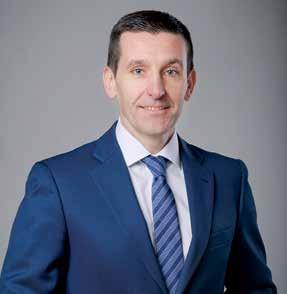
It is important to connect all inspection services in the period ahead and establish functionality for exchanging information between the Tax Administration and Customs Administration systems and the eInspector system
Despite negative external factors, Serbia has recorded an increase in tax revenues over the past year, and that trend is continuing today. With an awareness of the importance of securing planned inflows of funds into the budget and halting the flow of illicit activities, the Government of Serbia adopted the Programme for Suppression of the Grey Economy 2023-2025, and subsequently the accompanying Action Plan.
FIC members participated actively in the preparation of these documents, providing specific ideas and proposals.
It is worth noting that the work of the majority of national inspections is conducted via the eInspector [eInspektor] information system, which includes 36 of the total of 43 national inspection services. The updated checklists and forms that determine the way inspections are carried out are published regularly on the website www.inspektor.gov.rs, which provides companies with the opportunity to familiarise themselves, in a simple way, with conditions for doing business in accordance with the regulations.
The unique contact centre for reporting irregularities in the work of the national inspections services, which is the primary point of contact for lodging requests in the field of inspection supervision, has undergone numerous improvements and expansions in functionality since its inception. It is also connected to local government inspections and the eInspektor information system, which serves to simplify the procedure for reporting irregularities significantly.
Working within the framework of expert bodies, members of the FIC analyse regulations and market practices, which also forms the basis on which they indicate areas that must be improved. Within the scope of further improvements, it is important to connect all inspection services and establish functionality for exchanging information between the Tax Administration and Customs Administration systems and the eInspector system. It is also essential to amend the Act on Infractions / Law on Misdemeanours, in order to create the legal foundations for exchanging cases in electronic form between the eInspector system and the system for misdemeanour
courts (SIPRES), which would improve the efficiency of work on proceedings markedly.
One of the most important preventative measures is an adequate system to punish illicit trade, and it is thus necessary to conduct specialisation training for the judges of misdemeanour courts in the area of grey economy suppression and to monitor the work of misdemeanour courts in such proceedings.
Members of the Coordination Commission for Inspection Supervision have stated that the inspection services of Serbia are in an alarming state, due primarily to an unfavourable age structure, with inspectors having an average age of 59. Another major problem is an insufficient number of inspectors, considering the fact that state inspection staff capacity fulfilment ranges from between 30 to 70%, while the hiring of new inspectors is advancing very slowly.
Measures in the field of the policy on excise goods, primarily tobacco and petroleum, are among the most sensitive. That’s why it’s essential for the state services to be coordinated in their work, which will ensure the more efficient planning of processes and contribute to fortifying public finances.
We insist on the creating of an electronic public register of valid taxes and charges, with the aim of controlling parafiscal levies and increasing the transparency of operations

Tangible progress in harmonising Serbian legislation with the European acquis in the domain of food requires the revision of the existing Law on Food Safety, which often hinders the drafting of bylaws
The Law on Food Safety didn’t stipulate the adoption of certain regulations, or it stipulated the adoption of bylaws in such a way that full harmonisation is prevented, both due to differences in the categorisation of foods and due to the prescribed procedures, or because of the actual names of the bylaws. As an example, the Law stipulated the adoption of the ‘Rulebook on food with modified nutritional composition’, which isn’t conceptually defined or prescribed in the same way in the European acquis. Furthermore, in an effort to ensure clarity and consistency, European legislation didn’t consider it necessary for all rules applicable to gluten to be established by the same legislation, i.e., for the Regulation (EU) No 1169/2011 on the provision of food information to consumers to also provide the framework for rules related to information on the absence of gluten in food. Although this isn’t prescribed explicitly in our law, rules that relate to information on the absence of gluten in food were nonetheless not included in the rulebook that more closely prescribes the area of declaration. Procedures governing the market placement of new food and dietary products envisage a mandatory approval procedure for each new product placed on the market, which becomes an unnecessary administrative obstacle with the harmonisation of regulations, in addition to increasing the length of the process itself.
When it comes to the establishing of a transparent and all-encompassing risk analysis system for all inspection services, with the help of digital solutions, it is important to note that this kind of a system of risk analysis during official controls, with the application of digitalisation, would certainly accelerate goods exchanges, but would also free up the capacities of inspections to be redirected to activities that would contribute to fortifying the system of food safety. If the data were to be centralised, with digital solutions enabling access to data, such as, for instance, the history of the company in question and classification into low-risk or high-risk, which would represent the first step towards the simplification of the process and swift decision making as to whether a delivery will be sampled and inspected. Resources would
It is necessary to review the level of harmonisation of unique methodological rules for the drafting of regulations that differ from the EU method of drafting regulations and thus often represent an obstacle to full transposition
thereby automatically be directed towards those who’ve proven to be noncompliant in the past.
For the FIC, harmonising regulations from EU Accession Chapter XII is certainly a priority. Adopting amendments to the Law on Trade is hugely important to our committee, given that it has been shown that a conflict of jurisdiction exists between this law and the Law on Food Safety, which is the lex specialis for the domain of food and food declarations. These two laws prescribe different rules for declaring country of origin, which leads to the conclusion that different ministries have different approaches for the same area when it comes to the harmonisation of regulations. Due to this clash of jurisdiction, as well as inconsistent interpretation on the part of inspections and participants in doing business with food, this difference in approach still leads, in practice, to operational uncertainty and difficulties in the trade exchange with the EU and neighbouring countries.

We see regulatory barriers that are hindering the construction of digital (telecommunications) infrastructure as a major obstacle to the further digitalisation of society. Specifically, it is necessary to revise regulations in the domain of environmental protection governing the installation of base stations in mobile networks
Digitalisation imposed itself as the most important topic for the business community during the pandemic, when doing business electronically became the only way to conduct traditional transactions. However, digital transformation is a much more important process that the efficiency and capacity of not only the economy depends on, but also that of the state administration. Its prerequisites include digital (telecommunications) infrastructure, adequate regulations and e-government. The level of development of these three pillars determines the degree of digitalisation of a given society.
In this sense, we see that the development of e-government has continued even after the abating of the pandemic, and has done so in a direction that we commended in one of the previous editions of the White Book – namely, that eGovernment doesn’t need to replicate classic procedures available at counters, but rather should provide innovative solutions to social challenges, as was the case with applications for vaccination. The FIC thus praises the latest projects of the Ministry of Information and Telecommunications and the Office for IT and eGovernment: enabling digital identities for our citizens abroad via Serbia’s diplomatic missions; establishing of the “Frilenseri” [Freelancers], portal enabling simplified tax declarations; and launching the “Čuvam te” [I Keep You Safe] service aimed at preventing and protecting against peer-to-peer violence.
On the topic of regulations, the general regulations governing electronic operations are good and harmonised with EU regulations, and the new Law on Electronic Communications was adopted recently, representing a further stride forward in that direction. As for the electronic signature, we don’t see any regulatory barriers whatsoever when it comes to internal transactions between the state, businesses and citizens, while the recent integrating of the APR [Business Registers Agency] and eGovernment is the right step towards broader adoption of electronic transactions and electronic identity.
When it comes to foreigners, it is necessary to consider amending regulations with the aim of recognising
certificates for electronic signatures issued in the EU, with which the concluding of contracts would be made significantly easier for many foreign investors whose legal representatives are foreign citizens. However, alongside regulations governing e-documents and e-business, attention should also be paid to special regulations like those governing archiving, because excessively high standards could slow the digitalisation process if doing business electronically becomes more expensive than doing business in the traditional way.
Finally, we see major regulatory barriers hindering the construction of digital (telecommunications) infrastructure as the biggest obstacle to the further digitalisation of society. Outdated regulations in the domain of environmental protection, unjustified restrictions in urban plans and inconsistencies in the approaches of local governments remain an enduring problem to the further development of new generation mobile networks. Capacities have almost been reached, while on the other hand there are no conditions to either expand existing networks or construct new ones, including 5G networks.
That’s why the Foreign Investors Council, in collaboration with the University of Belgrade School of Electrical Engineering, has launched a joint project that aims to utilise scientifically established facts and best international practices to offer solutions to the aforementioned problems.
Excessively high standards could slow the digitalisation process if doing business electronically becomes more expensive than doing business in the traditional way
We suggest the adoption of a special law to regulate insurance contracts, the easing of the concluding of insurance policies, the promoting of mediation and the granting of state assistance on the development of individual insurance programmes
The Foreign Investors Council pays great attention to compiling the White Book and works very seriously on recommendations for ways to improve the business environment in the Republic of Serbia. Our opinion is that our country’s business market is developing constantly and that, despite the existence of huge efforts, legislation cannot always meet the needs of the market adequately and quickly. That’s why we recognised the need for well-developed companies, successful businesspeople and leaders in their fields, in one place, to point out the need to amend legal regulations in such a way that they keep pace with the increasingly rapid development of the business environment in our country. When it comes to insurance, recommendations relate to the need for the insurance contract to be regulated by a special law, enabling the easier concluding of insurance policies, promoting mediation, as well as state assistance on the development of individual insurance programmes. Despite there being many ideas, unfortunately very little progress has been achieved. The only advance that we see is in mediation, but that progress is the result of the efforts of insurance companies that have recognised the benefits of mediation and are exerting maximum efforts to use it in the resolving of disputes with clients. The legal framework still hasn’t been amended in this area either.
When it comes to the work of the committee in the period ahead, the most important recommendation relates to the adoption of the Law on Insurance Contracts. We consider that there would be multiple benefits from the adopting of a special law regulating the insurance contract. First and foremost, the law would keep pace with the huge changes to the insurance market and needs that have changed compared to the period when the Law on Contracts and Torts was adopted. Not only have the market’s needs changed, but practice at the European Union level has also changed, especially when it comes to user protection, and this shortcoming is currently being filled by the interventions of the National Bank of Serbia, to the extent that this is possible within the existing legislative framework. That’s why it’s vital to facilitate the development of insurance in our country, and particularly to harmonise the legal aspects of insurance
The National Bank of Serbia in particular has recognised the importance of insurance and is working to improve the protection of users of insurance services and bring the industry closer to good

with those of developed European countries that have recognised the need to regulate insurance matters with a special law. Alongside the aforementioned, the insurance market’s constant development demands a swifter reaction from the regulator in order for the legislative framework to be able to keep pace with the development of the market, and this isn’t possible if the insurance contract is regulated by a general law. Finally, consideration should be given to the importance of insurance and the need to educate both citizens and professionals who come into contact with the insurance industry (lawyers, judges, mediators, employees of state bodies etc.). Regulating the matter of the contractual right of insurance in one place would contribute to this greatly.
When it comes to opportunities for cooperation with public policymakers in this area, I must note that interest and willingness to cooperate have risen to a very high level following the financial conference organised by the FIC. As I have already mentioned, the National Bank of Serbia in particular has recognised the importance of insurance and is exerting great efforts to improve the protection of users of insurance services and approach the good practice of the European Union through the bylaws that it adopts, but also through all other mechanisms that are enabled under the current legislative framework.
practices in the European UnionDUŠAN LALIĆ, CO-PRESIDENT OF THE FIC FINANCIAL SERVICES COMMITTEE (GENERALI OSIGURANJE SRBIJA A.D.O.) COMMENT

In the continuation of the process of digitalising financial services, it is necessary to further expand the possibility of making the traditional range of support services for the operations of companies and private individuals even simpler and more intuitive
The FIC recently held the first financial conference bringing together representatives of the National Bank of Serbia, the Ministry of Finance of the Republic of Serbia, the Administration for the Prevention of Money Laundering, the Office for IT and eGovernment of the Government of the Republic of Serbia, the Republic Geodetic Authority, as well as other associations from the financial sector and the economy.
Attracting the greatest attention of participants were the topics of protecting users of financial services, finalising the project of introducing electronic bills of exchange, procedures based on AML protocol (e.g., PEP documentation, KYC processes etc.), the possibilities provided by the Republic Geodetic Authority with its new online services, as well as amendments to regulations in the fields of insurance and leasing etc.
When it comes to digitalisation in the banking sector, the visible efforts of all banks to render their products and services as available as possible “at a click”, as well as to optimise their business processes and reduce the level of manual activities and the consuming of resources. In this sense, very productive collaboration with the National Bank of Serbia was established on several fronts in the field of digitalisation. Significant advances have been achieved over the previous year within the scope of the project of electronic bills of exchange (e-bills) for registered companies and entrepreneurs, while there have been additional improvements to the system of electronic authentication through a qualified signature supported by cloud technology, as well as to the process of electronically recording turnovers of goods and services in real time (online fiscalisation and e-invoicing). Moreover, the national system for making payments in real-time, IPS (Instant Payment System), has encompassed and eased the payment of an even greater number of transactions for participants in the economy and citizens on the basis of improvements that were already presented during the period of the Covid pandemic (reading QR codes when making purchases at shops and on monthly payment slips ).
The further affirming of repo transactions in dinars would open the door to more advanced financial market instruments in the domestic currency
The National Bank of Serbia highlights the dinarisation process as being among the key factors in leveraging the implementation of monetary policy. Commercial banks have also recognised this process as being strategically important for ensuring a greater level of autonomy for the Serbian financial system in relation to external shocks and other influences emanating from the Eurozone. The NBS has achieved very significant results in this regard, when it comes affirming the dinar as a currency that it pays to save in, while it is evident that savings in dinars are again on the rise among citizens following the period of the pandemic. The further development of dinarisation is largely dependent on the possibility of making borrowing in dinars more affordable compared to borrowing in euros, which of course cannot be influenced by administrative measures alone, but rather also requires a greater resolve among all participants in the financial market for transactions in the local currency. In this sense, we consider that the further affirming of so-called repo transactions in dinars, i.e., transactions of mutual lending in dinars among banks on the basis of collateral in the form of securities, would represent a significant advance. This would also open the door to more advanced financial market instruments in the domestic currency (interest rate swaps, currency swaps etc.).

After a lengthy interlude in legislative activity related to labour regulations, 2023 has brought long-announced changes in the areas of health and safety at work and in the regulating of the position of foreigners when it comes to labour rights
The FIC Human Resources Committee has monitored the adoption of new regulations closely, given its members’ active participation in promoting the need to advance these areas, both through the stances expressed in multiple editions of the White Book and through the committee’s active participation in public discussions on the regulations governing the residential status and work of foreigners in Serbia.
Although the new Law on Safety and Health at Work includes additional obligations for employers, and thereby also new financial burdens for many, notable efforts have been exerted to improve the domestic system of safety and health at work to European standards, to raise the level of awareness and responsibility among all participants in the system of safety and health at work, which should ultimately contribute to improving the quality of applying working conditions that are safe and healthy. Still, home-based and remote work remain insufficiently regulated in a legal sense, because apart from acknowledging and defining this form of work, and proclaiming the principle of employee cooperation in the implementation of measures, the law does not more closely regulate mutual rights and obligations linked to working from home or remote work. As such, greater certainty in terms of the organising of work carried out beyond the confines of an employer’s premises will obviously have to wait for amendments to the Labor Law, as the umbrella law, and, in the meantime, employers will have to continue relying on the recommendations of the relevant state bodies and good business practices, accepting the risks associated with the insufficient regulating of flexible forms of labour.
Amendments to the Law on Foreigners and the Law on the Employment of Foreigners are generally evaluated as being positive from the perspective of foreigners seeking permanent residence in Serbia. In procedural terms, a sharp shift has been made from the previous procedure, which implied the physical submission of requests and documentation in written form, to a procedure that’s conducted exclusively in electronic form. Moreover, the previous two procedures (for obtaining temporary residence status and a work permit) are combined into one, which should result in a unique permit. These changes should achieve significant savings in terms
The FIC notes with satisfaction that the majority of recommendations provided during the implementation of the Law
of time, whilst simultaneously unburdening the state bodies tasked with resolving submitted requests.
In a material sense, the deadline for approving the residence status and labour rights of foreigners has been extended from one year to three years, while conditions for maintaining, renewing and changing relevant permits have been eased, with which the entire procedure has been further simplified and the mobility of foreigners on the domestic labour market has been increased. This is certainly positive news for both foreign workers and local employers, and consequently also for the economy as a whole. The Foreign Investors Council notes with satisfaction that the majority of recommendations provided during the implementation of the aforementioned laws have been adopted, while it hopes to be given the opportunity to contribute to further improving labour regulations and the overall business environment through the constructive proposals of FIC members.
We remain focused on the need to reduce the administrative obligations on employers, particularly those expressed in the formal method for adopting acts and communicating with employees – and all with the aim of ensuring the comprehensive implementation of the general digital transformation trend as it relates to labour rights regulations.
on Foreigners and the Law on the Employment of Foreigners have been adopted
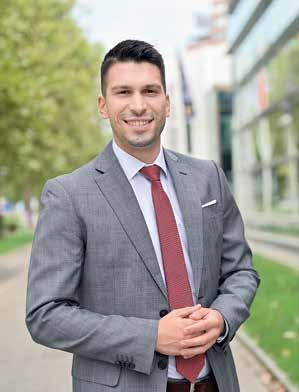
The focus of the committee over the period ahead will be on supporting and increasing its engagement in reforming the role of the Real Estate Cadastre, which should be the body that formally registers real estate rights, archives registration documents and submits its decisions to the parties involved
During this year, there’s been a noticeable downturn in the number of building permits issued, which can undoubtedly be attributed to current market trends and inflationary movements. On the one hand, we have significant increases in the prices of construction materials, which hits investors, while on the other hand is a high annual inflation rate, which hits buyers. It is necessary to devise a comprehensive plan to resolve the current situation, and the key to that problem isn’t only found in the hands of the construction industry, but also touches on the state’s monetary policy.
As part of the working group that participated in drafting the recently adopted amendments to the Law on Planning and Construction, we offered part of the solution in order for all participants in the construction market to be stimulated to continue with transactions. Firstly, issues of ownership relations on land and mixed forms of state and private ownership were reformed. Then came the abolishing of the converting of rights of use into rights of ownership over construction land with fees for certain categories – primarily for privatised companies (through privatisation procedures, bankruptcy or enforcement procedure), including their legal successors in terms of status, as well as individuals who acquired the right to use land after 11 September 2009 by purchasing a building with the corresponding land use right from these individuals. The aim is to unlock new locations for construction and reduce the costs of construction for investors, which should ultimately result in expanding the offer of residential and commercial properties on the market, increasing competition, and balancing the costs of buying and renting real estate.
Great efforts have been exerted over the previous period in an attempt to shorten the time required to obtain permits, and not only through improvements to the unified procedure for issuing construction permits, but also in terms of the number of steps preceding this procedure. This relates primarily to the concluding of the planning framework in Serbia, as well as the optimising of procedures and methods of issuing technical conditions for design by the relevant
We want the Cable Duct Cadastre to be closer to the Real Estate Cadastre in terms of the way it functions and its accessibility to users, and the adoption of the Law on Infrastructure is one of the main prerequisites for that
authorities, which has now all been addressed through amendments to the Law on Planning and Construction.
The focus of the committee over the period ahead will be on supporting and increasing its engagement in reforming the role of the Real Estate Cadastre, which should be the body that formally registers real estate rights, archives registration documents and submits its decisions to the parties involved. We will take on an active role in identifying a systemic solution to establish an efficient procedure for decision making with regard to the validating of registration documents that relate to real estate from the unregulated market, on the basis of which the Real Estate Cadastre would only formally conduct registration, without the need to additionally examine their material contents.
Laws are being continuously adopted and amended in Serbia in an effort to harmonise the domestic regulatory framework with that of Europe, but there is still a lot of room for progress

The recent period has seen certain legislative advances achieved in various spheres, with new regulations adopted in different areas. First and foremost, Serbia has continued improving regulations that deal with renewable energy sources. Amendments to the Law on the Use of Renewable Energy Sources have been adopted, which enabled the procedure to connect new energy facilities to the energy transmission system (which had been practically blocked since April 2021) and conditions have been created to hold the first auctions for the market premium. These amendments certainly represent additional success in the field of renewables and on the environmental agenda.
It is important to note the adoption of a set of new regulations in the field of labour and employees that are expected to have a positive effect. Primarily, the Law on Occupational Safety and Health was amended in such a way that new (more modern) concepts related to occupational safety have been introduced and it seems as though the general protection threshold will be raised in this regard. Furthermore, amendments to the Law on Foreigners and the Law on the Employment of Foreigners has unburdened the state apparatus by introducing an electronic procedure for registering foreigners. The same changes have reduced the limits and requirements for foreigners to obtain permanent residence status. Finally, amendments to the Law on Financial Support to Families have expanded the circle of people who are entitled to compensation on earnings linked to the starting of a family.
It is necessary to highlight the adoption of a package of important laws in the real estate field. Among the most important changes are the amendments to the Law on Planning and Construction, with which conversions with a fee have been abolished. In terms of the aforementioned progress on environmental protection, this law introduces a series of new requirements related to the green agenda, such as the need for all buildings exceeding 10,000m2 to have green certification or the need for a certain number of electric vehicle chargers to be installed in residential and commercial buildings, while buildings will also be required to have an energy passport.
To conclude, it is important to repeat something that’s being constantly mentioned and discussed in business
We expect the set of new regulations governing the field of labour and employees to have a positive impact when it comes to improving safety in the workplace and easing the hiring of foreigners
circles: laws are being continuously adopted and amended in Serbia in an effort to harmonise the domestic regulatory framework with that of Europe and in order to reach the standards of the market economy that exist in the EU. However, I consider that a lot of room exists to advance and improve when it comes to the application of (new) legal provisions and reaching European standards (which is certainly among the priority goals of the FIC Legal Committee). It is primarily essential for more consistent practice to exist in Serbian courts, as well as to ensure the general efficacy of the judiciary and regulatory authorities (while simultaneously considering the need to advance the capacity of authorities, given the numerous new and specific areas of importance to business circles). Likewise, more practical opportunities to apply various legal solutions should be enabled (as with the introduction of “foreign” electronic signatures, which would significantly ease operations in Serbia). Finally, it is essential to adopt new laws in certain areas, such as in the area of the protection of competition, and to work to improve existing regulations, such as the Law on the Protection of Personal Data or the Law on Foreign Exchange Operations.
It is essential for our committee to maintain constant communication with the Ministry of Finance in the period ahead, in order for each year’s budget calendar to include the planning of financial resources for new medicines and their scope for the year in question
The FIC Pharma Industry Committee, as one of the youngest members of the network of FIC committees, has sought since its inception to bring together at its sessions not only companies from its primary scope of activity (the pharmaceutical market), but rather also all those with activities that are connected to the healthcare system in any form.
I’m referring primarily to private health insurance companies, as well as to the systems of institutions that provide healthcare services. This has obvious importance, because we are all aware that all players in the complex healthcare system are intertwined and interdependent. This in many ways eases our formulating of recommendations for the Government of the Republic of Serbia, while simultaneously complementing the breadth of expertise that we are able to provide.
Following the very promising start to 2022 and the high budget allocation of the National Health Insurance Fund (RFZO) for new medicines, which was supported by the Ministry of Finance and praised greatly in last year’s edition of the FIC Guide, there was an ensuing period of stagnation in terms of work and communication with representatives of both the Ministry of Health and the RFZO. That period coincided with the extremely lengthy process of forming the new Government of the Republic of Serbia, which resulted, among other things, in the postponing of the adoption of a new List of Medicines that wouldn’t have an impact on the RFZO budget and would expand the availability of certain essential therapies to patients in the Republic of Serbia.
We emphasise the importance of the fact that complete agreement has been reached between the RFZO and the pharmaceutical industry with regard to the insufficient level of the funds collected by the RFZO from health insurance contributions when it comes to covering the need of the health system/patients for new medicines. In this sense, the Ministry of Finance has a very important role to play in understanding this need and subsidising it with additional funds from the central budget allocated in an appropriate way. That’s why it’s essential for our committee to maintain constant communication with the Ministry of
Finance in the period ahead and for the planning of this funding and its volume for the given year to be included in the annual budget calendar. It is equally important to continue respecting payment deadlines for all suppliers in the healthcare system, which is a prerequisite to ensure it is supplied and functions well.
The FIC Pharma Industry Committee also supports all forms of digitalisation in the healthcare system, which we expect – alongside the primary goals – to contribute to making savings that could be directed towards the financing of new therapies.
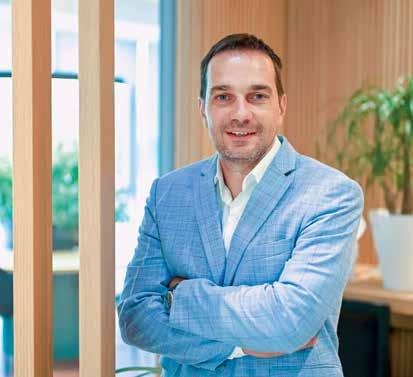
The digitalisation process should ease the monitoring of treatment outcomes, which should form the basis to evaluate all investments in this area

The digital transformation of the Tax Administration has proven to be very successful, but also demanding for taxpayers. It would be good to speed up the resolving of existing misgivings with regard to the use of the system for electronic invoicing
In the area of taxes, the previous year has been marked by the introduction of new electronic systems for the Tax Administration’s data collection and processing, which were implemented successfully and had a significant impact on businesses in the aspect of their need to adapt their own information systems and business processes. The new fiscalisation model achieved the comprehensive collection of data on transactions in businesses’ trade in goods and services with retail consumers – private individuals, while the introduction of the electronic invoice system has enabled the very detailed collecting of data on business transactions between businesses that are included in the VAT system. These electronic systems enable the Tax Administration to have precise and fully updated insight into the business operations of registered companies, on the one hand, as well as, on the other, the basis to conduct complex risk assessment analyses, data processing and control procedures. They represent a segment of the advancement of information systems and the digitalisation of the work of the Tax Administration, under the scope of the ongoing multi-year programme to transform, modernise and digitalise the Tax Administration.
From a taxpayers’ perspective, these new introductions demanded detailed and complex preparations and the adaptation of both accounting and business information systems, but also changes to business processes in the aspect of the recording of business transactions and document creation, flow and storage within the company. This required certain costs to implement new solutions, as well as to train staff to use these solutions. On the other hand, this change is expected to bring long-term benefits in the form of reduced paper documentation and the costs of storing and processing such documents, faster and more reliable exchanges of information and increased efficiency. During the preparation, implementation and initial usage period of the electronic invoice system, taxpayers encountered a number of dilemmas, practical problems and difficulties, some of which still await a response and solution on the part of the Tax Administration and the Ministry of Finance. The FIC Taxation Committee has addressed the relevant
There is, unfortunately, a lack of dialogue on the implementation of White Book recommendations regarding tax regulations
state authorities with regard to these topics and offered constructive proposals for resolving them.
Unfortunately, there have been no significant amendments or positive strides in tax regulations when it comes to the problems that the FIC has been highlighting for years. We still don’t see significant readiness for dialogue on the part of the state authorities. The working group for the implementation of FIC White Book recommendations hasn’t been active in the area of taxes this year either. Regardless of this fact, the Foreign Investors Council will continue advocating for the resumption of dialogue and the advancing of tax regulations and practices, in parallel with increased transparency and the timely public disclosure and discussion of planned tax regulation amendments. We will continue fighting for the quickest and fairest possible resolution to the most important problems from the previous period, such as amendments to the property tax and the taxation of capital gains.

The FIC played a key role in creating the new Tourism Development Strategy, and effective implementation – primarily by the public sector – is now crucial for Serbia to sustain its strategic positioning amid rapid changes to the global tourism market
Many of the key recommendations proposed by the FIC relate to the tourism and hospitality sector. First and foremost, it is important to address issues that are relevant to the new Tourism Development Strategy, the adoption of which is expected in the period ahead.
During the pandemic, we at the FIC already knew that it was necessary to define a new strategic framework for the development of Serbian tourism. Tourist preferences, but also tangible changes to the climate, sustainability, and inclusivity represent critical criteria for millions of tourists worldwide when it comes to choosing a holiday destination. We should additionally keep sight of digital transformation and new marketing tools. It is essential to determine where the tourism sector of Serbia stands today realistically, what its key comparative advantages and disadvantages are, the existing tourist capacities and the profile of tourists that Serbia wants to attract. All stakeholders must be aware of the current trends of the international tourism market, especially with regard to the experiences of foreign guests and tourism products that are essential to achieving a competitive advantage. With a deep understanding of the current situation facing Serbian tourism, the FIC contributed to formulating a new strategic framework. And there must be no delay not only when it comes to the adoption of this strategy, but also its implementation, especially by the public sector, because Serbia must maintain the important momentum it has gained in strategic positioning, because changes in the global tourism market come quickly.
Apart from the strategic framework, we also dealt with the new Law on Copyright and Related Rights, considering that the existing solution (payment according to the size in square-metres) serves to demotivate, particularly when it comes to accommodation facilities, while the new law should see us focus on business performance (e.g., occupancy rate). Unfortunately, we have yet to find understanding from the authorities. We have also been very active with regard to the new Law on Foreigners and the Law on the Employment of Foreigners, the development of financial services, ESG standards etc.
Last year’s FIC White Book included tangible and detailed recommendations for solutions to minimise the grey economy in tourism. A year later, we cannot say that systematic measures have been taken. Taking on the fight against the grey economy is primarily a strategic decision of the government, and one that not only represents a decisive step towards the normalisation of the tourism industry, but also represents an increasingly important factor that’s considered by both serious individual and institutional investors when deciding whether or not to invest in a specific tourist destination.
The fight against the grey economy is an increasingly important factor that’s considered by both serious individual and institutional investors when deciding whether or not to invest in a tourist destination
The FIC advocates for Serbia to pursue investment-led growth, aiming for a 25% share of investments in GDP to achieve a sustainable annual growth rate of 5%. Additionally, the focus should shift towards producing more commodities for export rather than solely providing services for domestic use
GOVERNOR OF THE NATIONAL BANK OF SERBIA
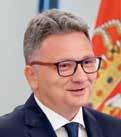

We believe that FDI inflows will reach around four billion euros by year’s end. This is good news as it shows that investors recognise Serbia as a place with a favourable macroeconomic and regulatory environment even during periods of uncertainty and economic slowdown globally

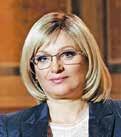
The more reliable a country’s court system is, and the more corruption is being fought and organised crime tackled, the more willing one is to invest in a country that feels like an investment in a safe place
MINISTER OF INFORMATION AND TELECOMMUNICATIONS
Digital Serbia’s place is in a digital Europe, and this is best illustrated by the results we’ve achieved over the past six years. We are continuing to strengthen our country’s economy and invest in the construction of Serbia’s knowledge- and innovation-based economy
MINISTER OF INTERNAL AND FOREIGN TRADE

There can be no successful European integration for our region if we, as neighbours in the Balkans, don’t first integrate in an economic sense. We are interconnected markets, and we are already seeing that the Open Balkan initiative is yielding positive results in the fields of trade exchange and the labour market
MINISTER OF SCIENCE, TECHNOLOGICAL DEVELOPMENT AND INNOVATION
We believe that the future BIO4 ecosystem will help with the growth of GDP, the reducing of unemployment and the attracting of experts from all over the world, but that it will also improve our cooperation with domestic and foreign companies as well as contributing to the development of new sectors and start-ups
WORLD BANK COUNTRY MANAGER FOR SERBIA SERBIA HAS THE POTENTIAL TO ACCELERATE GROWTH



Serbia’s potential for accelerated growth lies in enhancing its public institutions and governance, investing in human capital development to increase productivity, promoting regional integration and connectivity, and transitioning towards a more environmentally sustainable economy
HEAD OF THE EIB REGIONAL REPRESENTATION FOR THE OPPORTUNITIES TO BE EMBRACED
Amid the current challenges, Serbia can benefit further by using the impetus of nearshoring to move ahead with reforms within the accession process, scale up skills and create a greener, more integrated and more digitalised market
IMF RESIDENT REPRESENTATIVE FOR SERBIA
GEOPOLITICAL STABILITY & NEARSHORING COULD BOOST SERBIA’S FDI
Solving geopolitical tensions, some of which are not within Serbia’s control, would support and strengthen foreign direct investment (FDI). Additionally, the ongoing trend of EU countries nearshoring could potentially lead to even higher levels of FDI in Serbia
EBRD DIRECTOR FOR THE WESTERN BALKANS ACHIEVING EU INCOME LEVELS IS POSSIBLE

The EBRD expects Serbia’s GDP to increase by around two per cent this year and 3.5 per cent in 2024. A much faster growth rate of around six per cent would be needed in order to achieve convergence with EU income levels within two to three decades, which is an ambition that this region should have

DRAGANA MARKOVIĆ




DIRECTOR OF THE TAX ADMINISTRATION OF SERBIA DIGITALISATION AND TRANSFORMATION TO COMBAT THE GREY ECONOMY




The Tax Administration confirms, with all of its activities, that is plays one of the key roles in the fight against the grey economy in the Republic of Serbia. It is continuing to work on its own transformation, while it will soon launch the implementation of a new business model that will be supported by a unique integrated information system
ANA GOVEDARICA
FIC VICE PRESIDENT AND SPOKESPERSON (ROCHE GENERAL MANAGER)
THROUGH DIALOGUE TO NEW LEGAL SOLUTIONS
The inclusion of relevant experts and interest groups in the process of adopting legal regulations is important to overcoming the challenges posed by the implementation of new legislative solutions, as it reduces the risk of inconsistencies and conflicts
DEJAN TURK
FIC VICE PRESIDENT (CEO OF A1 SRBIJA AND A1 SLOVENIJA)
UNRESTRICTED DEVELOPMENT FOR NEW TECHNOLOGY
We hope that preparations for maintaining the network, as well as the actual auction for allocating the right to use 5G network radio frequency bands, will be conducted in a transparent and efficient manner and under the shortest possible timeframes. We, at A1, are committed to developing in accordance with the new spectrum and are fully prepared for the introduction of 5G technology
ALEKSANDAR LJUBIĆ
EXECUTIVE DIRECTOR OF THE FOREIGN INVESTORS COUNCIL DEDICATED TO EU INTEGRATION
We are conscious of the fact that it is only through partnership relations and an open dialogue that is it possible to reach the required level of understanding and awareness, which are essential to make the changes that will launch our society, and particularly our economy, towards the achieving of a common goal
DRAGAN PENEZIĆ
CO-PRESIDENT OF THE FIC ANTI-ILLICIT TRADE & FOOD COMMITTEE (BRITISH AMERICAN TOBACCO SEE D.O.O. BEOGRAD)
COORDINATED WORK OF STATE SERVICES ESSENTIAL
It is important to connect all inspection services in the period ahead and establish functionality for exchanging information between the Tax Administration and Customs Administration systems and the eInspector system
DRAGANA STIKIĆ
CO-PRESIDENT OF THE FIC ANTI-ILLICIT TRADE & FOOD COMMITTEE (NESTLÉ ADRIATIC S D.O.O.)

Tangible progress in harmonising Serbian legislation with the European acquis in the domain of food requires the revision of the existing Law on Food Safety, which often hinders the drafting of bylaws
DANIEL ŠUŠNJAR
PRESIDENT OF THE FIC TELECOMMUNICATIONS & DIGITAL ECONOMYCOMMITTEE (YETTEL D.O.O.)

We see regulatory barriers that are hindering the construction of digital (telecommunications) infrastructure as a major obstacle to the further digitalisation of society. Specifically, it is necessary to revise regulations in the domain of environmental protection governing the installation of base stations in mobile networks
DUŠAN LALIĆ
CO-PRESIDENT OF THE FIC FINANCIAL SERVICES COMMITTEE (GENERALI OSIGURANJE SRBIJA A.D.O
We suggest the adoption of a special law to regulate insurance contracts, the easing of the concluding of insurance policies, the promoting of mediation and the granting of state assistance on the development of individual insurance programmes
CO-PRESIDENT OF THE FIC FINANCIAL SERVICES COMMITTEE (BANCA INTESA A.D. BEOGRAD)



In the continuation of the process of digitalising financial services, it is necessary to further expand the possibility of making the traditional range of support services for the operations of companies and private individuals even simpler and more intuitive
MILENA JAKŠIĆ PAPAC
PRESIDENT OF THE FIC HUMAN RESOURCES COMMITTEE (KARANOVIĆ & PARTNERS O.A.D.)
After a lengthy interlude in legislative activity related to labour regulations, 2023 has brought longannounced changes in the areas of health and safety at work and in the regulating of the position of foreigners when it comes to labour rights
MARIO KIJANOVIĆ
PRESIDENT OF THE FIC INFRASTRUCTURE AND REAL ESTATE COMMITTEE
SUPPORTING REAL ESTATE CADASTRE REFORM

The focus of the committee over the period ahead will be on supporting and increasing its engagement in reforming the role of the Real Estate Cadastre, which should be the body that formally registers real estate rights, archives registration documents and submits its decisions to the parties involved
MARKO ĆULAFIĆ
PRESIDENT OF THE FIC LEGAL COMMITTEE (KARANOVIC & PARTNERS)



SWIFTER HARMONISATION WITH THE EUROPEAN FRAMEWORK
Laws are being continuously adopted and amended in Serbia in an effort to harmonise the domestic regulatory framework with that of Europe, but there is still a lot of room for progress
RADOMIR CEROVIĆ
PRESIDENT OF THE FICPHARMA INDUSTRY COMMITTEE (ROCHE D.O.O.)
GOOD PRACTICES NEED TO CONTINUE
It is essential for our committee to maintain constant communication with the Ministry of Finance in the period ahead, in order for each year’s budget calendar to include the planning of financial resources for new medicines and their scope for the year in question
DRAGAN DRAČA
PRESIDENT OF THE FIC TAXATION COMMIT TEE (PRICEWATERHOUSECOOPERS)
SIGNIFICANT MODERNISATION OF THE TAX ADMINISTRATION
The digital transformation of the Tax Administration has proven to be very successful,but also demanding for taxpayers. It would be good to speed up the resolving of existing misgivings with regard to the use of the system for electronic invoicing
ZAFIRIS LAMPADARIDIS
PRESIDENT OF THE FIC TOURISM & HOSPITALITY COMMITTEE (HYATT REGENCY BELGRADE)

IMPORTANT MOMENTUM FOR STRATEGIC POSITIONING
The FIC played a key role in creating the new Tourism Development Strategy, and effective implementation – primarily by the public sector – is now crucial for Serbia to sustain its strategic positioning amid rapid changes to the global tourism market
President of the Foreign Investors Council: MIKE MICHEL, CEO, Yettel
Vice President of the Foreign Investors Council: DEJAN TURK, CEO, A1 Serbia and A1 Slovenia
Vice President of the Foreign Investors Council: ANA GOVEDARICA, General Manager, Roche
Members of the Board:
FRANCOIS BERISOT, CEO, Belgrade airport
IVAN RAKIĆ, Country Managing Partner for Serbia, Montenegro and Bosnia and Hercegovina, Ernst & Young
MATTEO COLANGELI, Regional Director for Western Balkans, European Bank for Reconstruction and Development (EBRD)
ALESSANDRO BRAGONZI, Head of Regional Representation for the Western Balkans, European Investment Bank (EIB)
DAWID SOLD, Managing Director, G4S Secure Solutions
Dr RONALD SEELIGER, President and CEO, Hemofarm
GORAN PEKEZ, Corporate Affairs and Communications Director in charge of Adriatic region, JT International
MARJANA DAVIDOVIĆ, Country Manager, Nestlé Adriatic Hub South (Serbia, Montenegro, North Macedonia)
ZORAN PETROVIĆ, Chairman of the Managing Board CEO, Raiffeisen banka
MILJAN MILEVIĆ, Managing Director for SGS Beograd (Serbia and Montenegro)
Anti-Illicit Trade & Food Committee
Co-President for Anti-Illicit Trade:
DRAGAN PENEZIĆ, (British American Tobacco SEE)
Co-President for Food: DRAGANA STIKIĆ (Nestlé Adriatic S)
Vice President: SLAĐANA BABIĆ, NIS a.d. Novi Sad (Naftna industrija Srbije)
Financial Services Committee
Co-President: DANILO MRVALJEVIĆ, (Banca Intesa)
Co-President: DUŠAN LALIĆ, (Generali osiguranje)
Vice President: JELENA VUKIĆ-ŠULJAGIĆ, (OTP banka Srbija)
HR Committee
President: MILENA JAKŠIĆ PAPAC (Karanović & Partners)
Vice President: DUŠICA JOVIČIĆ, (G4S Secure Solutions)
Infrastructure & Real Estate Committee
President: MARIO KIJANOVIĆ, (SOG in cooperation with Kinstellar)
Vice President: TATJANA ISAKOV
NIS a.d. Novi Sad (Naftna industrija Srbije)
Legal Committee
President: MARKO ĆULAFIĆ, (Karanović & Partners)
Vice President: NEBOJŠA LUKAČ, (PricewaterhouseCoopers)
Pharma Industry Committee
President: RADOMIR CEROVIĆ, (Roche)
ALEKSANDAR LJUBIĆ, FIC Executive Director; aleksandar.ljubic@fic.org.rs
RENATA PINDŽO, FIC Communication Director; renata.pindzo@fic.org.rs
JELENA LAZAREVIĆ, FIC Regulatory Director; jelena.lazarevic@fic.org.rs
TANJA JOVANOVIĆ, FIC Regulatory Officer; tanja.jovanovic@fic.org.rs
KOVILJKA NIKOLIĆ, FIC Office Manager; koviljka.nikolic@fic.org.rs

TAMARA KAPOR, FIC Regulatory Associate; tamara.kapor@fic.org.rs
Taxation Committee
President: DRAGAN DRAČA, (PricewaterhouseCoopers)
Vice President: VANJA KORAĆ, (Philip Morris Services)
Telecommunications and Digital Economy Committee
President: DANIEL ŠUŠNJAR, (Yettel)
Vice President: NEDA TESLIĆ, (A1 Srbija)
Tourism & Hospitality Committe
President: ZAFEIRIOS LAMPADARIDIS (Hyatt Regency Beograd)
Vice President: DUBRAVKA KOSIĆ (K&F Advokati)
Foreign Investors Council
Gospodar Jevremova 47, IV floor, 11000 Belgrade, Serbia
Telephone: 011 3281 958/965
E-mail: office@fic.org.rs
Web: www.fic.org.rs
A1 SRBIJA D.O.O.
Milutina Milankovića 1ž, 11070 Belgrade
Tel: 060 1234; Fax: 060 1231
E-mail: PR@a1.rs
Web: www.a1.rs
Enrolment date: 2007
A1 TOWERS INFRASTRUCTURE D.O.O. BEOGRAD –
NOVI BEOGRAD
Milutina Milankovića 1ž
11070 Novi Beograd
E-mail: info@a1towers.rs
Enrolment date: 2023
ACB D.O.O. BEOGRAD – DRUŠTVO ZA
POSREDOVANJE U OSIGURANJU
Skender begova 3-3/A, 11000 Beograd
Tel: +381 11 7854 600; E-mail: office@acb.rs Web: www.acb.rs; www.aon.com
Enrolment date: 2023
ADDIKO BANK A.D. BEOGRAD

Milutina Milankovića 7v, 1070 Beograd
Tel: +381 11 2226 000
E-mail: office.rs@addiko.com
Web: www.addiko.rs
Enrolment date: 2002
ADECCO OUTSOURCING D.O.O.
Bulevar Milutina Milankovića 1i, 11070 Beograd
Tel: +381 11 7121 709, Fax: +381 11 6695 131
E-mail: info.srbija@adecco.com
Web: www.adecco.rs; www.adeccogroup.com; www. adecco.com, Enrolment date: 2019
AIRPORT CITY BELGRADE
Omladinskih brigada 88a, 11070 Beograd
Tel: 011 2090 526
E-mail: office@airportcitybelgrade.com

Web:www.airportcitybelgrade.com

Enrolment date: 2005
ALMA QUATTRO D.O.O. BEOGRAD
Dositejeva 20, 11000 Beograd
Tel: +381 11 2028 900, +381 11 2028 920
E-mail: office@almaquattro.rs
Web: www.almaquattro.rs
Enrolment date: 2020
ARDAGH METAL PACKAGING SERBIA D.O.O.
Omladinskih brigada 88, Airport City Business Park
11070 Beograd, Tel: +381 11 7151 100
E-mail: amb.serbia@ardaghgroup.com
Web: www.ardaghgroup.com
Enrolment date: 2020
BALL CORPORATION, BEVERAGE PACKAGING EMEA, BEOGRAD
Batajnički drum 21A, 1080 Zemun – Beograd
Tel: +381 11 3770 600/602, Fax: +381 11 3770 752
Web: www.ball.com
Enrolment date: 2004
BANCA INTESA A.D. BEOGRAD
Milentija Popovića 7b, 11070 Beograd
Tel: +381 11 3108 888
E-mail: kabinet@bancaintesa.rs
Web: www.bancaintesa.rs
Enrolment date: 2004
BARRY CALLEBAUT SOUTH EAST EUROPE D.O.O.
Karadjordjeva 2-4, 11000 Beograd
Tel: +381 11 3532 805
E-mail: jelena_vujnovic@barry-callebaut.com
Web: www.barry-callebaut.com
Enrolment date: 2020
BAYER D.O.O. BEOGRAD
Omladinskih brigada 88b, 11070 Beograd
Tel: +381 11 2070 200
E-mail: office.support.rs@bayer.com
Web: www.bayer.rs
Enrolment date: 2009
BDK ADVOKATI
Bulevar kralja Aleksandra 28, 11000 Beograd
Tel: +381 11 3284 212, Fax: +381 11 3284 213
E-mail: office@bdkadvokati.com
Web: www.bdkadvokati.com
Enrolment date: 2011
BELAGA MANAGEMENT COMPANY D.O.O
Kralja Milana 35, 11000 Beograd
Fax: +381 11 7555 700, E-mail: begbs_hotel@hilton.com
Web: local: Hilton Belgrade

global: www.hilton.com/en/,
Enrolment date: 2022
BELGRADE AIRPORT D.O.O.
47 Aerodrom Beograd Street, 11180 Beograd 59
Tel: +381 11 2094 802
E-mail: kabinet@beg.aero
Web: www.beg.aero
Enrolment date: 2019
BOJOVIC DRASKOVIC POPOVIC & PARTNERS A.O.D BEOGRAD

Francuska 27, 11000 Beograd
Tel: +381 11 7850 336
Web: www.bd2p.com; Mail: office@bd2p.com
Enrolment date: 2013
BPI D.O.O. SOMBOR
Venac Radomira Putnika 1, 25000 Sombor
Tel: +381 25 5150 161, +381 25 5150 162
Fax: +381 25 5150 185
Web: www.bpi-holding.com
Enrolment date: 2010
BRITISH AMERICAN TOBACCO
SOUTH-EAST EUROPE D.O.O. BEOGRAD
Bulevar Milutina Milankovića 1ž, 11070 Beograd
Tel: +381 60 3108 700
Web: www.bat.com
Enrolment date: 2002, Founder
BRITISH-SERBIAN CHAMBER OF COMMERCE

6 Lower Grosvenor Place,SW1W 0EN London, UK
Dositejeva 15, 11000 Beograd, Tel: +44 020 7630 1777
E-mail: office@britserbcham.com; richard.robinson@ britserbcham.com; Web: www.britserbcham.com
Enrolment date: 2020
CARLSBERG SRBIJA D.O.O.
Proleterska 17, 21413 Čelarevo
Tel: +381 21 7550 600,Fax: +381 21 7550 658
E-mail: info@carlsberg.rs
Web: www.carlsbergsrbija.rs
Enrolment date: 2005
CETIN D.O.O. BEOGRAD – NOVI BEOGRAD
Omladinskih brigada 90, 11070 Beograd
Tel: +381 63 444 222
E-mail: info@cetin.rs
Web: www.cetin.rs; www.cetin.eu
Enrolment date: 2021
CTP INVEST
Bulevar Zorana Đinđića 64a, 11070 Beograd
Tel: +381 65 433 4444
E-mail: petar.kolognat@ctp.eu
Web: www.ctp.eu
Enrolment date: 2019
CWPR SERVICES D.O.O. / CWP GLOBAL
Masarikova 5, floor 20, 11000 Beograd
Tel: +381 11 7850 020
E-mail: office.serbia@cwp.global
Web global: https://www.cwp.global/contact-us/
Enrolment date: 2023
DAD DRÄXLMAIER AUTOMOTIVE D.O.O.
Skladišna hala 1, Zrenjaninski park
Lokacija Bagljaš Aerodrom, 23000 Zrenjanin
Tel: +381 23 519 340
Web: www.draexlmaier.com
Enrolment date: 2017

DDOR NOVI SAD A.D.O.
Bulevar Mihajla Pupina 8, 21000 Novi Sad
Tel: +381 21 4886 000,
Korisnički centar: 0800 303 301
E-mail: ddor@ddor.co.rs; Web: www.ddor.rs
Enrolment date: 2012
DELHAIZE SERBIA
Jurija Gagarina 14, 11000 Beograd
Tel: 0800 3537 030, Fax: +381 11 7153 910
E-mail: office@delhaize.rs; Web: local: www.maxi.rs
global: www.aholddelhaize.com
Enrolment date: 2023
DELOITTE ADVISORY D.O.O.
Terazije 8, 11000 Beograd
Tel: +381 11 3812 100, Fax: +381 11 3812 112
E-mail: ceyuinfo@deloittece.com

Web: www.deloitte.com/rs
Enrolment date: 2003
DELTA HOLDING DOO
Vladimira Popovića 8a, 11070 Beograd
Tel: +381 11 2011 611, +381 11 2011 921
E-Mail: office@deltaholding.rs
Web: www.deltaholding.rs

Enrolment date: 2014
DEUTSCH-SERBISCHE WIRTSCHAFTSKAMMER (AHK SERBIEN)
Topličin venac 19a, 11000 Beograd
Tel: +381 11 2028 010, Fax: +381 11 3034 780
E-mail: info@ahk.rs; Web: www.serbien.ahk.de/sr; www.serbien.ahk.de; Enrolment date: 2014
EKO SERBIA A.D.
Member of HelleniQ Energy
Tošin bunar 274a, 11070 Novi Beograd
Tel: +381 11 2061 500,
E-mail: office@hellenic-petroleum.rs
Web: www.ekoserbia.com Enrolment date: 2004
ERNST & YOUNG D.O.O. BEOGRAD
Vladimira Popovića 8a
11070 Beograd, Tel: +381 11 2095 800
E-mail: ey.office@rs.ey.com
Web: www.ey.com/sr_rs
Enrolment date: 2004
ERSTE BANK A.D. NOVI SAD
Bulevar oslobođenja 5, 21000 Novi Sad,
E-mail: info@erstebank.rs, Erste Poslovni centar
Bulevar Milutina Milankovića 3a, 11070 Novi Beograd
Tel: 0800 201 201, +381 60 4848 000
Web: www.erstebank.rs; Enrolment date: 2005
EURO LITHIUM BALKAN D.O.O. VALJEVO
Divci b.b., 14222 Valjevo
Tel: +381 69 1508 190
E-mail: info@elbplus.rs
Web: www.elbplus.com; www.elbplus.rs
Enrolment date: 2023
EUROBANK DIREKTNA A.D. BEOGRAD
Vuka Karadžića 10, 11000 Beograd
Tel: 0800 1111 44
E-mail: office@eurobank-direktna.rs
Web: www.eurobank-direktna.rs

Enrolment date: 2003
EUROPEAN INVESTMENT BANK
Vladimira Popovića 38-40, 11070 Novi Beograd
Tel: +381 11 3121 756
Web: www.eib.org
Enrolment date: 2017
EVROPSKA BANKA ZA OBNOVU I RAZVOJ
Španskih boraca 3 11070 Beograd
Tel: +381 11 2120 530
Web: www.ebrd.com

Enrolment date: 2016
EXLRT D.O.O.
Mornarska 7, 21000 Novi Sad
Tel: +381 21 6301 548, +381 21 6392 826
E-mail: info@exlrt.com; office@exlrt.com

Web: www.exlrt.com
Enrolment date: 2010
FCA SRBIJA D.O.O. KRAGUJEVAC
Kosovska 4
34000 Kragujevac
Web: www.fiatsrbija.rs; www.fiat.rs
Enrolment date: 2011
FERRING PHARMACEUTICALS D.O.O. BEOGRAD-STARI GRAD
Gospodar Jevremova 47, 11000 Beograd
Tel: +381 11 4048 800
Web: www.ferring.com
Enrolment date: 2018
FRESENIUS MEDICAL CARE SRBIJA D.O.O.

Beogradski put bb, 26300 Vršac
Tel: +381 11 3951 000, Fax: +381 11 3951 009
E-mail: vera.trunic@fmc-ag.com

Web: www.fmc-ag.com
Enrolment date: 2013
FRIKOM D.O.O.
Zrenjaninski put bb, 11213 Beograd
Tel: +381 11 2074 100, Fax: +381 11 2074 148
E-mail: office@frikom.rs

Web: www.frikom.rs
Enrolment date: 2019
G4S SECURE SOLUTIONS D.O.O.
Viline Vode 6, 11000 Beograd
Tel: +381 11 2097 900, Fax: +381 11 2097 946
E-mail: office@rs.g4s.com
Web: www.g4s.rs
Enrolment date: 2009
GEBRÜDER WEISS D.O.O. DOBANOVCI
Beogradska 85, 11272 Dobanovci
Tel: +381 11 3715 200, Fax: +381 11 3715 201
E-mail: office.beograd@gw-world.com
Web: www.gw-world.com/rs; www.gw-world.com/at
Enrolment date: 2020
GENERALI OSIGURANJE SRBIJA A.D.O.
Vladimira Popovića 8, 11070 Novi Beograd
Tel: +381 11 2220 555
Web: www.generali.rs; www.generali.com
Enrolment date: 2016
GRAND CASINO D.O.O. BEOGRAD
Bulevar Nikole Tesle 3, 11080 Beograd
Tel: +381 11 2202 800, Fax: +381 11 2202 810
E-mail: info@grandcasinobeograd.com
Web: www.grandcasinobeograd.com


Enrolment date: 2008
GRUNDFOS SRBIJA D.O.O.
Obilazni put Sever 21, 22320 Inđija
Tel: +381 22 367 300
Fax: +381 22 367 302
Web: www.grundfos.rs; www.grundfos.com

Enrolment date: 2013
HAD BMP A.D. BEOGRAD (HYATT REGENCY BEOGRAD)
Milentija Popovića 5, 11000 Beograd
Tel: +381 11 301 1234
E-mail: belgrade.regency@hyatt.com,

Web: local: hyattregencybelgrade.com
global: www.hyatt.com
Enrolment date: 2022
HEMOFARM A.D.

Beogradski put bb, 26300 Vršac
Tel: +381 11 3811 200
E-mail: svakodobro@hemofarm.com
Web: www.hemofarm.rs
Enrolment date: 2013
HUAWEI TECHNOLOGIES D.O.O.

Omladinskih brigada 90D
11070 Beograd
Web: www.huawei.com
Enrolment date: 2020
IKEA SRBIJA D.O.O.
Astrid Lindgren 11
11231 Beograd
Web: www.ikea.com

Enrolment date: 2008
INOS BALKAN D.O.O.
Mirka Obradovića BB, 14000 Valjevo
Tel: +381 14 221 560
E-mail: contact@inosbalkan.com
Web: www.inosbalkan.com
Enrolment date: 2017
INTESA LEASING D.O.O. BEOGRAD

Milentija Popovića 7b, 11070 Beograd
Tel: +381 11 2025 400
E-mail: ilbhead@intesaleasing.rs
Web: www.intesaleasing.rs
Enrolment date: 2010
JELEN DO D.O.O. (CARMEUSE SERBIA)
Jelen Do bb, 31215 Jelen Do, Požega
Tel: +381 31 590 599, Fax: +381 31 590 570
E-mail: jelen-do@carmeuse.rs
Web: www.carmeuse.com

Enrolment date: 2015
JT INTERNATIONAL A.D. SENTA
Subotički drum 17, 24400 Senta
Tel: +381 11 2050 300
Fax: +381 11 2050 301
Web: www.jti.com
Enrolment date: 2003
K&F ADVOKATI
Knez Mihailova 17, 11000 Beograd
Tel: +381 11 3345 195
E-mail: office@kfadvokati.com
Web: www.kfadvokati.com
Enrolment date: 2021
KARANOVIĆ & PARTNERS O.A.D.

Resavska 23, 11000 Beograd
Tel: +381 11 3094 200, Fax: +381 11 3094 223
E-mail: serbia@karanovicpartners.com
Web: www.karanovicpartners.com
Enrolment date: 2003
KENTKART SOUTHEAST EUROPE D.O.O.
Makenzijeva 24, 11000 Beograd
Tel: +381 11 7155 171, Fax: +381 11 7155 171
E-mail: office@kentkart.rs
Web: www.kentkart.rs
Enrolment date: 2014
KLEEMANN LIFTOVI D.O.O.
Obradovića Sokak 50, 22310 Šimanovci
Tel: +381 22 409 000
E-mail: serbia@kleemannlifts.com
Web: www.kleemannlifts.com


Enrolment date: 2019
KNAUF INSULATION D.O.O.
Batajnički drum 16b, 11080 Beograd
Tel: +381 11 3310 800, Fax: +381 11 3310 801
E-mail: office.belgrade@knaufinsulation.com
Web: www.knaufinsulation.rs; www.knaufinsulation.com Enrolment date: 2011
KONCERN BAMBI A.D.
Đorđa Stanojevića 14, 3rd floor, 1070 Beograd
Tel: +381 11 2222 555;
E-mail: office@bambi.rs
Web: local: www.bambi.rs global: www.bambi.rs/en
Enrolment date: 2023
KONSTRUKTOR KONSALTING
Oslobođenja 10, 11000 Beograd, Rakovica
Tel: +381 11 2562 231
E-mail: office@konstruktorgrupa.com
Web: www.konstruktorgrupa.com
Enrolment date: 2018
KPMG D.O.O. BEOGRAD
Milutina Milankovića 1j, 11070 Beograd
Tel: +381 11 2050 500
Fax: +381 11 2050 550
E-mail: info@kpmg.rs; Web: www.kpmg.rs

Enrolment date: 2002
LAFARGE BFC D.O.O.
Trg BFC 1, 21300 Beočin
Tel: +381 21 874 102
E-mail: lbfc.office@lafarge.com

Web: www.lafarge.rs; www.holcim.com
Enrolment date: 2002
LAW OFFICE MIROSLAV STOJANOVIC IN COOPERATION WITH WOLF THEISS
Poslovni centar Ušće, Bulevar Mihajla Pupina 6 11070 Beograd, Tel: +381 11 3302 900,
E-mail: beograd@wolftheiss.com
Web: www.wolftheiss.com; Enrolment date: 2003
LEITNERLEITNER CONSULTING D.O.O. BEOGRAD

Kneza Mihaila 1-3, 11000 Beograd,

Tel: +381 11 6555 105; E-mail: beograd.office@ leitnerleitner.com; Web: https://www.leitnerleitner. rs/serbia/sr/about-us; https://www.leitnerleitner. com/de/at; Enrolment date: 2020
LUKOIL SRBIJA A.D. BEOGRAD
Bulevar Mihajla Pupina 165d, 11070 Beograd
Tel: +381 11 2220 200
Fax: +381 11 2220 294
Web: www.lukoil.rs

Enrolment date: 2009
MARSH D.O.O. ZA POSREDOVANJE
U OSIGURANJU BEOGRAD
Omladinskih brigada 88a, 11070 Novi Beograd
Tel: +381 11 3130 409; E-mail: marsh.serbia@marsh.com

Web: https://www.marsh.com/rs/en/home.html; http://www.mmc.com/; Enrolment date: 2019
MERCK D.O.O.
Omladinskih brigada 90v, 11070 Beograd
Tel: +381 11 2175 761, Fax: +381 11 2176 781
E-mail: merck@merck.rs

Web: www.merck.rs; www.merckgroup.com
Enrolment date: 2020
MESSER TEHNOGAS A.D.
Banjički put 62, 11000 Beograd
Tel: +381 11 3537 200, Fax: +381 11 3537 291
E-mail: postoffice@messer.rs

Web: www.messer.rs
Enrolment date: 2002, Founder
METROPOL PALACE D.O.O.
Bulevar kralja Aleksandra 69, 11000 Beograd
Tel:+381 11 3333 100
E-mail: reception@metropolpalace.com

Web: www.metropolpalace.rs
Enrolment date: 2017
MINI PANI D.O.O.
Hipodromska 2d, 24000 Subotica
Tel: +381 24 621 521, Fax: +381 24 621 522
E-mail: info@minipani.com
Web: www.minipani.com
Enrolment date: 2012
MK GROUP
Bulevar Mihajla Pupina 115e, 11070 Belgrade
Tel: +381 11 3539 555, Fax: +381 11 3539 599
E-mail: marija.andjelkovic@mkgroup.rs
Web: local: www.mkgroup.rs global: www.mkgroup. rs/?lang=en; Enrolment date: 2023
MOBI BANKA A.D. BEOGRAD
Omladinskih brigada 88, 11070 Beograd
Korisnički servis: 063 9005
Tel/Fax: +381 11 4409 670
E-mail: officebanka@mobibanka.rs

Web: www.mobibanka.rs; Enrolment date: 2015
MORAVACEM D.O.O.
Branka Ristića 8, 35254 Popovac
Tel: +381 35 572 200, Fax: +381 35 572 207
E-mail:general-info@moravacem.rs
Web: www.moravacem.rs; www.crh.com
Enrolment date: 2016 Founder
MS RAJICEVA D.O.O. (MAMA SHELTER)
Kneza Mihaila 54a,
11000 Beograd
Tel: +381 11 3333 000
Web: global: www.mamashelter.com
Enrolment date: 2022
NESTLÉ ADRIATIC S D.O.O.
Železnička 131,11271 Beograd-Surčin
Tel: +381 11 2019 301, Fax: +381 11 3132 022
E-mail: info@rs.nestle.com
Web: www.nestle.rs

Enrolment date: 2002
NIS A.D. NOVI SAD (NAFTNA INDUSTRIJA SRBIJE)
Narodnog fronta 12, 21000 Novi Sad
Tel.: +381 21 4811 111
E-mail: office@nis.rs
Web: www.nis.rs
Enrolment date: 2011
NLB KOMERCIJALNA BANKA AD BEOGRAD
Svetog Save 14, 11000 Beograd
Tel: 011/3080 100, Fax: 011/3441 335
E-mail: kontakt.centar@nlbkb.rs
Web: www.nlbkb.rs
Enrolment date: 2022
NOKIA SOLUTIONS AND NETWORKS SERBIA
D.O.O. BEOGRAD
Đorđa Stanojevića 14, 11070 Beograd
Belgrade Office Park, Building II, First Floor
Tel: +381 11 2281 920; Web: nokia.com
Enrolment date: 2009
OGRANAK SERBIA PRIME SITE ONE AG BEOGRAD
Jurija Gagarina 76g, 11070 Beograd
Tel: +381 60 8800 106, Fax: +381 11 3441 335
Web: local: www.serbiaprimesiteone.com
global: www.jangroup.ch
Enrolment date: 2022
OTP BANKA SRBIJA A.D. NOVI SAD
Trg slobode 5, 21000 Novi Sad, Tel: +381 21 421 077, +381 11 3011 555, Fax: +381 11 2221 388;
E-mail: Retail banking; stanovnistvo@otpbanka.rs;


Corporate clients: privreda@otpbanka.rs;
Web: www.otpbanka.rs; Enrolment date: 2002
OTP LEASING SRBIJA
Headquarters: Bulevar Zorana Đinđića 50 a/b
Post and work with clients: Bulevar Mihajla Pupina 111, 11070 Beograd, Tel: +381 11 2221 369,
E-mail: otpleasing.srbija@otpsrbija.rs; Web: www. otpleasingsrbija.rs; Enrolment date: 2011
PEPSICO
Đorđa Stanojevića 14, 11070 Beograd, Tel: +381 11 3637 000, Fax: +381 11 3132 885; E-mail: belgrade.office@ pepsico.com; Web: www.pepsico.com; www.pepsico.rs; www.facebook.com/PepsiCoZapadniBalkan; twitter.com/ PepsiCoZB; LinkedIn: PepsiCoZB, Enrolment date: 2009
PERNOD RICARD SRBIJA D.O.O.
Bulevar oslobođenja 211, 11000 Beograd
Tel: +381 11 3091 500
Fax: +381 11 3974 380
Web: www.pernod-ricard.com
Enrolment date: 2003
PETRIKIĆ & PARTNERI A.O.D. IN COOPERATION WITH CMS REICH-ROHRWIG HAINZ
Krunska 73, 11000 Beograd, Tel: +381 11 3208 900,
Fax: +381 11 3208 930; E-mail: belgrade@cms-rrh.com; Web: www.cms-rrh.com
Enrolment date: 2004
PHILIP MORRIS SERVICES D.O.O. BEOGRAD
Bulevar Zorana Đinđića 64a
11070 Beograd
Tel: +381 11 2010 800
Web: www.pmi.com
Enrolment date: 2004
PHOENIX GRUPA SRBIJA
Bore Stankovića 2, 11030 Beograd
Tel: +381 11 3538 100
E-mail: office@phoenixpharma.rs
Web: www.phoenixpharma.rs
Enrolment date: 2016
PRICEWATERHOUSECOOPERS D.O.O.
Airport City Belgrade, Omladinskih brigada 88a
11070 Beograd, Tel: +381 11 3302 100
Fax: +381 11 3302 101
E-mail: rs_pwc_office@pwc.com
Web: www.pwc.rs; Enrolment date: 2002, Founder


PRIGAN D.O.O. BEOGRAD
Bulevar Vojvode Mišića 15 a
11000 Beograd
Tel: +381 11 369 9802
E-mail: office@soravia.rs
Enrolment date: 2022
PROCREDIT BANK
Milutina Milankovića 17, 11000 Beograd
Tel: +381 11 2077 906
E-mail: srb.info@procredit-group.com
Web: www.procreditbank.rs
Enrolment date: 2004
PROMONT GROUP DOO NOVI SAD
Privrednikova 4b, 21000 Novi Sad
Tel: +381 21 443 195
E-mail: info@promontgroup.rs
Web: www.promontgroup.rs
Enrolment date: 2023
RAIFFEISEN BANKA A.D. BEOGRAD
Đorđa Stanojevića 16, 11070 Beograd
Tel: +381 11 3202 100
E-mail: info@raiffeisenbank.rs
Web: www.raiffeisenbank.rs
Enrolment date: 2002
RAIFFEISEN LEASING D.O.O.
Đorđa Stanojevića 16, 11070 Beograd
Tel: +381 11 2207 400, Fax: +381 11 2289 007
E-mail: info.leasing@raiffeisen-leasing.rs

Web: www.raiffeisen-leasing.rs


Enrolment date: 2003
RAUCH SERBIA D.O.O.
Šesta Lička 2, 15220 Koceljeva
Tel: +381 15 361 800; +381 11 265 2225
E-mail: office.serbia@rauch.cc

Web: www.rauch.cc
Enrolment date: 2011
RIO TINTO
RIO SAVA EXPLORATION D.O.O.
Milutina Milankovića 1i, 11070 Beograd
Tel: +381 11 4041 430
Web: www.riotinto.com; www.riotintoserbia.com
Enrolment date: 2004
ROCHE D.O.O.
Vladimira Popovića 8a,11070 Beograd
Tel: +381 11 2022 803, Fax: +381 11 2022 808
E-mail: serbia.office@roche.com

Web: www.rochesrbija.rs; www.roche.com
Enrolment date: 2013
SAVA NEŽIVOTNO OSIGURANJE A.D.O. BEOGRAD
Bulevar vojvode Mišića 51, 11000 Beograd
Tel: +381 11 777 39 39
E-mail: info@sava-osiguranje.rs
Web: www.sava-osiguranje.rs
Enrolment date: 2015
SGS BEOGRAD D.O.O.
Jurija Gagarina 7b, 11070 Beograd
Tel: +381 11 7155 275, +381 11 7155 277
Fax: +381 11 2284 241
E-mail: sgs.beograd@sgs.com; Web: www.sgs.rs

Enrolment date: 2016
SIEMENS D.O.O. BEOGRAD
Omladinskih brigada 90v, 11070 Beograd
Tel: +381 11 2096 001, Fax: +381 11 2096 007
E-mail: office.rs@siemens.com
Web: local: www.siemens.rs global: www.siemens. com; Enrolment date: 2023
SLADARA SOUFFLET SRBIJA D.O.O.
Industrijska zona 2, 21400 Bačka Palanka
Tel: +381 21 752 910
Fax: +381 21 6042 399
Web: www.soufflet.com
Enrolment date: 2004
SOG IN COOPERATION WITH KINSTELLAR
Bulevar Mihajla Pupina 10l, 11070 Beograd
Tel: +381 11 3282 667
E-mail: office@kinstellar.com; petar.protic@ kinstellar.com; Web: www.sog.rs
Enrolment date: 2023
STEEL IMPEX LLC
Rada Končara 1,21131 Petrovaradin
Tel: +381 2182 0691
E-mail: info@steelimpex.rs
Web: www.steelimpex.rs
Enrolment date: 2022
STMG CONSULTANCY D.O.O. BEOGRAD
Nevesinjska 7, 11000 Beograd
Tel: +381 11 3535 400, Fax:+381 11 3535 401;
E-mail: info@stmgconsultancy.com, sasa.trajkovic@ stmgconsultancy.com; Web: www.stmgconsultancy.com;

Enrolment date: 2006
TELEKOM SRBIJA A.D. BEOGRAD

Takovska 2, 11000 Beograd
E-mail: fic.telekom@telekom.rs
Web: www.telekom.rs
Enrolment date: 2007
TETRA PAK PRODUCTION D.O.O. BEOGRAD
Milutina Milankovića 9ž, sprat 2, 11070 Beograd
Tel: +381 11 2017 333, Fax:+381 11 2017 380
Web: www.tetrapak.rs
Enrolment date: 2002
Founder
THE COCA-COLA COMPANY (BARLAN S&M D.O.O.)

Batajnički drum 18, 11080 Beograd
Tel: +381 11 3081 100,Fax: +381 11 3081 166
E-mail: mvukojicic@coca-cola.com
Web: www.thecoca-colacompany.com
Enrolment date: 2002
THE INTERNATIONAL SCHOOL OF BELGRADE

Temišvarska 19, 11000 Beograd
Tel: +381 11 2069 999, Fax: +381 11 2069 944
E-Mail: isb@isb.rs Web: www.isb.rs
Enrolment date: 2014
TIGAR TYRES D.O.O. PIROT PREDUZEĆE

ZA PROIZVODNJU GUMA
Nikole Pašića 213, 18300 Pirot
Tel: +381 10 2157 000
E-mail: office.serbia@michelin.com
Web: www.michelin.rs; Enrolment date: 2009
TITAN CEMENTARA KOSJERIĆ
Živojina Mišića 50, 31260 Kosjerić
Tel: +381 31 590 300
E-mail: cemkos@titan.rs
Web: www.titan.rs
Enrolment date: 2004
TOYO TIRE SERBIA D.O.O. INĐIJA
Industrijska 3 no. 5, 22320 Inđija
Tel: +381 66 8087 898
E-mail: nevena.lestaric@toyotires.rs
Web: https://www.toyotires-global.com/
Enrolment date: 2021
TRACE GROUP HOLD PLC OGRANAK BEOGRAD
Kneza Miloša 9/V, 11000 Beograd
Tel: +38118 517000
Web: www.tracebg.com
Enrolment date: 2023
UNICREDIT BANK SRBIJA JSC
Rajićeva 27-29, 11000 Beograd, Jurija Gagarina 12, Belgrade Business Center, 11070 Beograd,
Tel: +381 11 3777 888; E-mail: kontakt@unicreditbank.rs
Web: www.unicreditbank.rs; Enrolment date: 2013, Founder


UNIFIEDPOST SOLUTIONS D.O.O.
Tošin bunar 185,11070 Beograd
Tel: +381 11 7150 748
E-mail: office.rs@unifiedpost.com
Web: www.unifiedpost.rs
Enrolment date: 2019
VP LAW FIRM
Teodora Drajzera 34, 11000 Beograd
Tel: +381 11 2642 257
E-mail: info@vp.rs
Web: www.vp.rs
Enrolment date: 2023
WEST PHARMACEUTICAL SERVICES BEOGRAD D.O.O.

Crvenka 76, 26220 Kovin
Tel: +381 13 2156 101
E-mail: kovin.office@westpharma.com
Web: www.westpharma.com
Enrolment date: 2020
WIENER STÄDTISCHE OSIGURANJE A.D.O. BEOGRAD
Trešnjinog cveta 1,11070 Beograd
Tel: 0800 200 800; +381 11 220 9800
E-mail: office@wiener.co.rs

Web: www.wiener.co.rs
Enrolment date: 2003
YAZAKI SERBIA
Nova 7 bb, 15000 Sabac
Tel: +381 15 7195 241
E-mail: YSD.Communications@yazaki-europe.com
Web: global: www.yazaki-europe.com
Enrolment date: 2022
YETTEL D.O.O.
Omladinskih brigada 90, 11073 Beograd
Mob: +381 63 9000
Web: www.yettel.rs
Enrolment date: 2006
ZIVKOVIC SAMARDZIC A.O.D. BEOGRAD
Makedonska 30, 11000 Beograd
Tel: +381 11 2636 636, Fax: +381 11 2635 555
E-mail: office@zslaw.rs
Web: www.zslaw.rs
Enrolment date: 2011
Average fuel consumption: 5.1 – 5.8l/100 km, CO₂ emission (average) 135.0 - 152.0 g/km. Air pollutant emissions from traffic vastly contribute to overall air quality deterioration, especially in the case of above-average concentration of ground-level ozone, PM10 particles, PM2,5 particles and nitrogen-oxide. Stated figures represent determined „WLTP CO2 figures“ pursuant to Article 2, No. 3, of Implementing Regulation (EU) 2017/1153. Fuel consumption figures have been calculated on this basis.
